

Self-Love and Healing: Embracing Your Journey to Inner Peace

Self Love and Healing: Embracing Your Journey to Inner Peace
Self-love is often the foundation of mental well-being and healing. It involves an appreciation for oneself that grows from actions that support physical, psychological, and spiritual growth. When you practice self-love, you are actively working towards recognizing your worth and taking steps to meet your own needs, nurture your ambitions and make space for healthy relationships in your life.
Table of Contents
Cultivating self-love isn’t an indulgent act; instead, it’s a necessary part of your journey to healing. By embracing the practice of self-kindness , you create an environment within yourself that’s conducive to repairing past wounds and building resilience for the future. This way, self-love becomes more than a concept—it transforms into a transformative tool that fosters deep healing and lasting change.
The relationship between self-love and healing is also reflected in how you treat your mind and body daily, which has a profound impact on your mental well-being. Actions such as setting boundaries, engaging in self-care practices , and prioritizing your needs are all manifestations of self-love that contribute to a more harmonious and healed self. By committing to these behaviors, you reinforce your value and build a life that not only acknowledges but celebrates your intrinsic worth.

Understanding Self-Love
In exploring the journey towards healing, understanding the role of self-love is foundational. Central to this concept are self-esteem, self-respect, and acceptance, which act as the pillars of a healthy relationship with oneself.
Grab Your Free E-Book
"Rediscover Your Happiness
Get Back to Your 'Happy' Self!
Workbook" Today!
The Concept of Self-Love
Self-love is about valuing your well-being and happiness. It’s a state of appreciation for oneself that grows from actions that support our physical, psychological, and spiritual growth. Self-love means having a high regard for your own well-being and happiness. It involves taking care of your needs and not sacrificing your well-being to please others. Self-love is not merely a state of feeling good but is an action-oriented concept where respect, self-acceptance, and self-compassion play a key role in fostering self-esteem .
Self-Love vs. Selfishness
- Self-Love is constructive, driving you towards personal growth and encouraging self-compassion . It helps you to maintain healthy boundaries and to respect both yourself and others.
- Selfishness , on the other hand, is destructive. It is taking care of your own needs without regard for how it affects others. Unlike self-love, selfishness can lead to a disregard for others and a lack of self-respect.
Remember, practicing self-love means you are committed to your personal development and well-being in a way that’s considerate of others, not at their expense.

The Healing Journey From Within
In your path to healing, internal transformation plays a critical role. This section guides you through embracing self-love to nurture recovery from life’s adversities, such as stress and emotional distress.
The Healing Journey
Healing is an internal process. It’s about fostering a relationship with yourself that is steeped in self-compassion and understanding . To embark on this journey:
- Acknowledge your feelings of anxiety or depression without judgment.
- Set achievable objectives that align with your wellbeing. For instance, commit to daily practices that reduce stress, like meditation or journaling.
- Remain patient and recognize that healing is not linear but a series of ups and downs.
Additionally, practices advocating for self-love are instrumental. They bolster your emotional resilience and can be a cornerstone in cultivating wellbeing .
Get your Freebie

Addressing Trauma and Illness
Confronting trauma requires courage. It involves:
- Facing your past without overwhelmed by regret .
- Allowing yourself the space to process traumatic events in a healthy manner.
- Seeking professional help when needed to navigate through this landscape.
In the case of illness , whether physical or psychological, integrating self-love tactics can contribute to a more hopeful outlook. This includes:
- Finding practical tools that assist in healing, like exercises known to fortify both body and mind resilience.
- Often, healing from trauma is about a return to essence , restoring your core identity without the shadows of your experiences ( Psychology Today ).
Remember, you’re not alone in your struggle with trauma or illness , and incorporating self-love can light your path to recovery.

Cultivating Mental Health
In addressing mental health , it is crucial to not only manage negative feelings but also to foster resilience . This process involves both confronting challenging emotions like fear , anger , and sadness , as well as cultivating a positive mental space for growth.
Dealing with Negative Thoughts
To deal with negative thoughts , begin by acknowledging their presence. Understand that it’s natural to experience a range of emotions. Here are some steps to transform negative thought patterns:
- Identify and label the thoughts: Are they fear-based, self-criticizing, or related to anger?
- Challenge their validity : Use logic to dispute irrational or unhelpful thoughts.
- Redirect your focus : Engage in activities that promote positivity , such as reading, gardening, or socializing.
- Practice mindfulness : Meditation can help you observe thoughts without becoming entangled in them.
Building Mental Resilience
Increasing your mental resilience allows you to bounce back from life’s challenges more effectively. Here’s how to build it:

- Set realistic goals : Progress, no matter how small, can boost your confidence and resilience.
- Stay connected : Maintain relationships that provide support and encouragement.
- Learn from setbacks : View challenges as opportunities for growth rather than indicators of failure.
- Take care of your physical health : Exercise and proper nutrition can positively affect your mental well-being.
By integrating these practices into your routine, you provide yourself with the tools to enhance your mental health and simultaneously mitigate negative feeling and amplify your natural resilience .

Practices for Self-Care & Putting Yourself First
Engaging in self-care is a pivotal aspect of nurturing your well-being. Let’s explore structured and deliberate practices that help maintain and enhance your mental and physical health.
Mindfulness and Meditation
Incorporating mindfulness is about anchoring your attention to the present moment, which can be profoundly restorative. Begin with just five minutes of meditation daily, focusing on your breath or a specific mantra. Gradually, you can increase this time, allowing yourself to deepen the practice and reap greater benefits, such as reduced stress and enhanced self-awareness.
Physical Exercise and Relaxation
Regular exercise contributes significantly to your physical and emotional health. Whether it’s a brisk walk in nature , a fun dance class, or structured workouts, find an activity that brings you joy and commit to it several times a week. Don’t forget to incorporate periods of relaxation ; gentle stretching or yoga can counteract the stress of daily life.
In addition, mindful eating —paying attention to the experience of eating—can transform your mealtimes into an act of self-care, promoting a healthier relationship with food.

Overcoming Emotional Obstacles & Learning to Love
Navigating through emotional challenges requires understanding and actively practicing self-compassion and forgiveness. Your journey to healing often begins with acknowledging emotions and finding constructive ways to cope.
Coping with Anxiety and Depression
You are not alone in dealing with anxiety and depression . These conditions can raise your cortisol levels, leading to physical and emotional strain.
- Recognize the Triggers : Begin by identifying what prompts your anxiety or depression. Understanding these triggers can help you prepare and reduce their impact.
- Practice Gratitude : Keeping a gratitude journal can shift your focus from negative thoughts to positive experiences, contributing to your overall happiness.
Exercise , mindfulness meditation, and deep-breathing techniques are effective in lowering cortisol levels and enhancing your mood. Consistent participation in these activities can significantly improve your mental state.
Handling Anger and Resentment
Anger and resentment often stem from a place of hurt and can hinder your emotional wellbeing. However, embracing forgiveness and self-forgiveness is crucial to overcoming these feelings.
- Employ Compassion : See the situation from multiple perspectives. This can foster empathy and diminish the intensity of your anger.
- Express Constructively : Instead of bottling up anger, find healthy outlets to express it. This could be through conversation, writing, or physical activities.
Remember, suffering is less about the situation and more about your reaction to it. By taking control of that reaction, you take important steps toward your own healing.

Living a Balanced Life
Achieving a balanced life is essential for your well-being and personal growth. It involves aligning various aspects of your life, from spirituality to everyday joys, to create a sense of wholeness.
The Role of Spirituality
In your journey to live a balanced life, spirituality plays a pivotal role. It’s not merely about religious practices; it’s about connecting with something greater than yourself, which brings a profound sense of peace and purpose. You can cultivate your spirituality through daily meditation , journaling your thoughts and feelings, or simply spending quiet moments in nature. Engaging in spiritual activities can serve as a compass, guiding you toward inner harmony and self-discovery.
Finding Joy in Everyday Activities
Everyday activities are opportunities to nurture joy and appreciation . Whether it’s the satisfaction that comes from reading a good book, the upliftment felt when your favorite music fills the room, or the simple act of pausing to smile , these small pleasures contribute significantly to your overall happiness. Make time to enjoy these moments fully, and allow them to replenish your energy and enthusiasm for life. Recognize the value in the mundane, and you’ll find that joy can be woven into the fabric of your everyday existence.

Frequently Asked Questions
The following questions address key aspects of self-love and self-healing to help you understand their impact on your well-being and provide actionable guidance.
How can practicing self-love improve my confidence?
By practicing self-love, you affirm your worthiness and assert your value, which directly influences your self-esteem. Embracing your strengths and forgiving your weaknesses allows you to approach life’s challenges with a stronger sense of assurance and poise.
What are some practical steps to begin a self-healing journey?
Initiating a self-healing journey involves introspection and the willingness to address your emotional wounds. Start by recognizing patterns that contribute to discomfort and commit to changes that support your well-being . Establishing a routine of self-care practices and seeking professional support if needed can provide a structured path towards healing.
How does one identify and overcome a deficiency in self-love?
Identifying a deficiency in self-love can be as straightforward as noticing critical self-talk and persistent feelings of inadequacy. A positive first step to overcome this deficiency involves changing your narrative through affirmations and practicing gratitude for your unique qualities and experiences. Engaging with communities that uplift your self-image can also play an instrumental role in building self-love.

In Conclusion – Final Last Words
Self-love is the bedrock upon which healing rests. Embracing your worth is essential ; it paves the way for both peace of mind and emotional resilience. Recognize that the journey of healing necessitates patience and self-compassion.
- Practice affirmations daily: statements like “I am worthy of love and respect” reinforce positive self-perception.
- Prioritize self-care : it is as crucial as any other appointment. Nurture your body and spirit.
- Establish boundaries : saying no is a profound act of self-love.
Remember, letting go of negative self-talk is a transformative step in your healing process. Remind yourself that it’s okay to have setbacks.
- Reflect on your progress with gratitude .
- Seek connections that uplift and affirm your self-love.
Emotional healing isn’t linear nor solely an internal process. Sometimes, reaching out for support can accelerate your healing. Engage with those who respect and encourage your journey towards a wholehearted embrace of self-love.

About the author

“Hi! Welcome to the launching and introduction to ‘Made You Smile Back’! I’m so pleased you’re here. Let me share with you a little bit about myself and why I created this platform.”
Related post.

Leave a Reply Cancel reply
Your email address will not be published. Required fields are marked *

Copyright © 2024 Madeyousmileback | All rights reserved | Powered by
Yes, I would love to get a glimpse of
"The Power Of Unexpected Miracles"
NOTE: After successfully entering your information, you shall receive an email with your own personal link.

- Self-Growth Journey
- Free Newsletter
Emotional Self-Healing: How to Start Your Powerful Journey Today
Personal Development

E ach person is different when it comes to emotional pain and trauma. Some elements, such as death, affect all of us similarly, but even within that context, our reactions and the way we feel and deal with them are different. Self-healing is a process through which you acknowledge the emotional pain and trauma in your life and figure out a way to stop it from holding you back. Unlike a band-aid that can stop the bleeding and eventually the scar will go away, emotional pain and trauma is a long and slow process, and its appropriate “band-aid” doesn’t exist in a one-size-fits-all type of box. This article explores the concept of self-healing and proposes a few ways in which you can start your self-healing journey today.
What Is Emotional Pain
In a 2011 article published in the Journal of Loss and Trauma , researchers Esther Meerwijk and Sandra Weiss asserted that “a generally accepted understanding and clear definition of what is constituted by psychological pain do not exist.”
It’s an interesting study that explains the difficulty of defining emotional pain in a cohesive, easy-to-understand manner.
In the end, the authors do provide their view on a unified definition that states that “[…] psychological pain is being defined as a lasting, unsustainable, and unpleasant feeling resulting from the negative appraisal of an inability or deficiency of the self.”
Although it starts to sound a little easier to understand, it’s still far from a set of checkboxes that would answer the question, am I in emotional pain or not.
Since defining emotional pain is complex, dealing with emotional pain and trauma is equally challenging. You can’t truly solve a puzzle if you cannot describe the puzzle and how it works. Emotional pain is one of those puzzles because when you feel it, you know it’s there. But if someone asks you to describe it, you are lost for words.
In an article on emotional pain , Dr. Steven Stosny, Ph.D., explains that when you dwell on the causes of emotional pain, you will most likely exacerbate it rather than alleviate it.
It’s normal to think that if you were to find the cause of your emotional pain and thus assign the blame to that cause, the emotional pain would go away. However, self-healing doesn’t work that way. The more you attempt to cast the fault, the more you must shine a light on the pain and make it bigger. That’s the opposite of a self-healing journey and will lead to a life of resentment while the trauma persists.

How Emotional Pain Affects Us
When you suffer from emotional trauma, there’s little outside evidence about what is happening on the inside. That’s why often, people around you might brush off your emotional pain, which will make you feel even worse.
The truth is that emotional pain is not only just as real as physical pain, but many times it’s much more powerful and much more damaging.
The difference to physical pain is the clear answer to where and why. If your shoulder hurts, you get an X-ray. If the X-Ray reveals a tear, the doctor will give you an injection and immobilize your arm for a while. While both of those things will hurt, there is a plan in place to eventually remove the pain and make it all better.
With emotional pain, the cause is often unclear. With the unclear cause, the path to “all better” is not only foggy; it doesn’t even exist.
That lack of direction as to how to deal with emotional pain will only make the pain more prevalent and add a layer of helplessness to it.
When those kinds of feelings inhabit you, the mental pain will often translate into physical pain. Dizziness, headache, upset stomach, nausea, stiff muscles—those are just a few types of physical psychosomatic reactions in which emotional pain manifests in your body.
On top of that, emotional pain changes your behavior and attitude. You may find yourself angry , overeating, over-drinking, isolating or even self-harming.
This cocktail of feelings and reactions turns into an emotional tornado that keeps spinning, and spinning, and spinning. So, the question becomes, how can you get out of it?

What is Self Healing?
Self-healing is a process by which you work toward recovering from emotional pain and trauma. Although the “self” in the name is a driving force, that doesn’t mean that you must do it alone.
The self implies strong self-motivation and self-discipline , but the self-healing journey is often best accomplished alongside a supportive group. That group can be your family, friends, or professional help.
One crucial aspect of this journey is self-awareness . As in the example above, if you were not to feel the pain in your shoulder, you’d never get to the doctor, and your shoulder might remain damaged for good. Similarly, when it comes to emotional pain and suffering, you must at least be aware that it exists before you can do something about it.
Unluckily, that’s a tricky thing to do. Luckily, though, there’s a process in place that can get you there.

6 Stages of Self-Healing
As the complexity of emotional pain and trauma are apparent by now, self-healing is not straightforward. Although putting down six stages sounds simple enough, the reality is a lot more convoluted.
The stages are not an exact science; they’re not a computer program that you can run linearly for a determinate time. Instead, these stages happen differently for different people. They can last longer or shorter; they might go in this order or out of order.
The goal of the stages is to bring forward the awareness of a “possible” road to self-healing. Each person will create their own path using their understanding of where they are and where they want to be. It’s like a map, but everyone will approach it in their own way.
The idea here is to begin the self-healing process, which will scar the emotional pain and eventually remove the scar tissue. Once that has been at least partially removed, there will be new space for personal change and transformation, no longer shadowed by the effects of the trauma. The ultimate goal for that is achieving deep inner peace.
When grief sets in and transforms into long-lasting emotional pain resulting from trauma, your first reaction is to deny it. That is not uncommon, and it applies to almost everything that gives us discomfort. The first reaction is to pretend it’s not there in hopes that it might, in fact, not be real and it will go away.
Some people never leave this stage and spend their entire lives stuck in denial. They might deny that an abusive relationship exists because there can’t be any pain if it doesn’t.
Self-awareness and getting a sense of self-esteem is a way for people to start getting out of denial. By honestly examining what you fear might happen should you stop denying, you begin to open the door for leaving this stage.
When you no longer deny reality and understand that something is genuinely happening to you, the next thing that usually follows is anger. “Why me?” “Why is this happening?” “How can they let this happen to me?”
Those are questions that you ask in anger because you are upset at your suffering. Anger can manifest outwardly toward others or inwardly toward yourself. You might become vicious with other people, or you might self-harm.
Whereas anger is an essential step in the self-healing journey, spending too much time in anger might result in long-term resentment. The critical part is observing the anger, expressing it healthily, but being prepared to let go of it.
The next usual stage is bargaining, which is your way of trying to find a quick fix. It’s an “if only” kind of solution.
“If I do this, maybe he won’t do that, and so I won’t feel this way anymore.”
“If you come to counseling with me, I won’t file for divorce.”
“I only need to be lucky this one time, and things will turn around.”
“Please, God, if you can, just give her one more month.”
Bargaining is an attempt to regain control that has been lost. We often feel that nothing comes for free, so if we offer something or invoke something, we might get back an alleviation of pain.
You might find yourself bargaining for love, time with a loved one, financial security, or so many other things. This transitory natural stage provides a temporary escape out of denial and anger while the person in pain can adjust to the reality that is starting to set in.
Depression sounds like it could be one of the effects of emotional pain. To some extent, that’s true, but in the context of your self-healing journey, depression signals the beginning of acceptance. On the cusp of acceptance, there’s still resistance; you’re not yet entirely over the hurdle, but you’re close.
During this time, some of the effects of emotional pain exacerbate. You may feel intense sadness, difficulty sleeping, loss of motivation, inability to focus, and a general feeling of loss of self-worth.
Although the depression stage sometimes feels like it will last forever and become the ultimate end-point to that journey, it is also a transitory yet necessary phase.
At this stage, it’s essential to have a trusted group with whom you can feel comfortable expressing your feelings and discussing them without judgment.
It’s not easy to predict how long the depression stage will last, but by practicing daily feeling and expressing your emotions, you can ensure a smoother transition out of it.
The acceptance stage marks the point when you finally understand and accept the reality of the pain or trauma, and that reality cannot change. It means that you have been able to detach yourself from the claws of the past and everything that you regret about it. Similarly, the future doesn’t scare you anymore, and you are ready to move forward.
Note that acceptance doesn’t mean that you are “okay” with the loss, although its name might suggest it. You may never be “okay” with your mother not being alive or your spouse cheating on you. What matters is that you accept those realities for what they are, and you can move on without being paralyzed by their mere existence.
Acceptance is your ability to learn how to live with the present and how the present looks like. It is a process, though, and not the means to an end.
Forgiveness
Last but not least is forgiveness. Although acceptance gives you the freedom you need to unclench yourself from the claws of emotional pain and gain the wings you need to fly, resentment toward the cause of the pain might not disappear completely.
Think about a spouse who abused you or a man who hurt someone you love. Although you have accepted the reality, you may still hold a grudge toward those people.
When you truly forgive, you finally free yourself. That freedom is a bonus on your self-healing journey because it genuinely seals the grip that the person or event has on you.
Note that forgiveness cannot happen until you remove yourself from the cause of emotional pain and you go through the different stages of grief.
In other words, don’t mistake forgiveness for bargaining.
“I’ll forgive him and give him another chance. He promised it wouldn’t happen.” That’s not true forgiveness; it’s just another way of negotiating your emotions and giving control away.

Begin Your Self-Healing Journey
Emotional pain is one of the most difficult ailments that can affect you, and it’s extremely difficult to defeat. That’s mainly because ordinarily, you might not even be aware that it happened. You feel the effects but understand none of the causes.
That not only creates frustration and additional anxiety, it also blocks your way to breaking its chains.
Therefore, understanding the self-healing journey and going through those stages is critical for removing yourself from that emotional pain and moving on with your life.
It’s a tough and challenging road, but one that, once taken, will drive you to freedom .
Other Resources on Self-Healing
- 7 Ways to Heal Your Body by Using the Power of Your Mind, Backed by Science
- 10 Tips for Emotional Healing
- How To Emotionally Heal Yourself?
- Healing: 5 Steps To Transforming Emotional Pain
Now, before you go, I have…
3 Questions For You
- Are you currently living with emotional pain or trauma?
- Do you recognize yourself in any of the six stages of dealing with emotional pain?
- If you’ve defeated emotional pain before, how do you feel now?
Please share your answers in the comments below. Sharing knowledge helps us all improve and get better!

Hi there! I’m Iulian, and I want to thank you for reading my article. There’s a lot more if you stick around. I write about personal development, productivity, fiction writing, and more. Also, I’ve created Self-Growth Journey , a free program that helps you get unstuck and create the beautiful life you deserve. Enjoy!
Related posts:

emotions, happiness, self-help
Lilian, I am ever so grateful this is amazing I am going to put you down as my nb1 on my social media’s you really put my mind at ease. THANK YOU THANK YOU THANK YOU,, I wish you nothing but the best in life ??
Session expired
Please log in again. The login page will open in a new tab. After logging in you can close it and return to this page.

- Relationships
8 Powerful Steps to Self-Love
Being kind to yourself helps you bounce back, live healthier, and stay on track..
Posted June 29, 2017 | Reviewed by Devon Frye
Self-compassion is a way of relating to yourself that does not involve harshly judging or punishing yourself for every mistake you make, or every time someone does better than you. Research on self-compassion shows that it is associated with:
- Less anxiety and depression .
- More optimism .
- Better recovery from stress.
- Better adherence to healthy behavior changes, such as exercise or diet .
Kristin Neff, the pioneer of self-compassion research, describes it as follows:
“Self-compassion involves treating yourself with the same kindness, concern, and support you’d show to a good friend. When faced with difficult life struggles, or confronting personal mistakes, failures, and inadequacies, self-compassion responds with kindness rather than harsh self-judgment, recognizing that imperfection is part of the shared human experience.” (Neff & Dahm, 2015)

The 3 Facets of Self-Compassion
Self-compassion has three separate but related aspects:
1. Mindfulness : Having an open, curious, non-judging attitude; not over-identifying with negative stories about the self.
2. Self-kindness: Treating yourself kindly, rather than harshly. Extending the same care and support to yourself that you would to a good friend or loved one.
3. Common humanity: Allowing yourself to be human, to make mistakes and learn from them. Knowing that as humans we are not perfect, nor should we be expected to act flawlessly.
In my clinical practice, I teach self-compassion to all of my clients, and I am always impressed by how much it can transform their relationship with themselves and promote healthier ways of living. Self-compassion is much more effective in changing behavior than trying to motivate yourself with shame and self-criticism. Shame and self-criticism lead to inner rebellion and giving up, while self-compassion gives you hope and helps you trust the process of change.
To become more self-compassionate yourself, try to follow these 7 steps:
1. Recognize that you are experiencing emotional distress or mental suffering.
Adopt a mindful attitude in which you deliberately pay attention to your inner experience so that you can notice when you are beginning to shift into a negative state. The minute you realize that you are thinking negative thoughts about yourself or feeling anxiety in your body, stop and say to yourself, "This is a difficult moment," or, "I’m feeling distress in my mind and body.”
2. Accept that the feeling is there.
Make a conscious decision to sit with whatever negative feeling is there and try to accept it—because it’s there anyway—rather than pushing it away. If it’s a negative thought, look for the underlying emotion (anxiety, sadness, or anger ), or scan your body to see where you feel tension or discomfort. You may feel it in your chest, belly, shoulders, throat, face, jaw, or other areas.
3. Imagine what you might feel if you saw a loved one experiencing this feeling.
In your mind’s eye, imagine your loved one being scared or sad or feeling bad about themselves. Then think about what you might feel. Perhaps you would feel the urge to help or comfort them. Try to direct this compassionate mindset toward yourself. If you notice any resistance or thoughts of “I don’t deserve compassion,” acknowledge them, and try to direct compassion to yourself anyway. You may want to ask yourself why you think others deserve compassion but not you.
4. Challenge your negative story about yourself.
If you can't feel compassion for yourself because you feel undeserving or “bad,” try to think about this as an old story. Notice the old story of why you are bad. Now find a way to challenge this interpretation. If you acted in an unhealthy or irresponsible way, ask yourself if there were circumstances that influenced your behavior. Perhaps you experienced past trauma , or you were caught in a stressful situation. Now make a commitment to try to learn from the experience, rather than beat yourself up over it. Other ways to challenge the story are to ask yourself if you’re seeing things in black or white, if you’re being too judgmental, or if you’re seeing the situation from only one perspective. Are there other, kinder ways to view the situation? Are you expecting yourself to be perfect, rather than allowing yourself to be human?
5. Think about how everybody messes up sometimes.
It’s tempting to think that you are uniquely messed up, while everyone else is a paragon of virtue. In fact, even the most successful people make serious mistakes. Think about all the mistakes politicians make. But making a mistake doesn’t undo all of your accomplishments and successes. Neff cites “common humanity” as an aspect of self-compassion: Humans are learning, developing beings rather than finished products. We're all works in progress.

6. Decide what it would take to forgive yourself.
If your behavior hurt you or another person, ask yourself what it would take to forgive yourself. Think about whether you want to apologize and make amends to the person you hurt. If you hurt yourself through addictive behavior, avoidance, ruining relationships, or otherwise behaving unwisely, make a coping plan for the next time you are in a similar situation so that you can begin to act differently.
7. Use self-talk to encourage yourself.
You may say something like, “It doesn’t help to beat yourself up,” or, “Everybody makes mistakes sometimes.” You may want to acknowledge yourself for trying, even if you weren’t successful. You may tell yourself to focus on the positive aspects of what you did as well as the negative ones, or that behavior change is a process, and you need to keep trying.
8. Be a life coach to yourself.
Rather than punishing yourself with negative thoughts, gently guide yourself in a positive direction. You may ask yourself what led to the destructive behavior, whether it’s really what you want to be doing, and what the consequences are. Tell yourself that you have other choices, and it’s never too late to change. Then think about a concrete step you can take right away to move in a more positive direction or get up and try again. If someone else was mean and you let them get away with it, think about how you can set a limit or boundary to stop this from happening again.

Melanie Greenberg, Ph.D. , is a licensed clinical psychologist and life coach practicing internationally via distance technologies. She is a former professor, national speaker, and the author of The Stress Proof Brain .
- Find a Therapist
- Find a Treatment Center
- Find a Psychiatrist
- Find a Support Group
- Find Teletherapy
- United States
- Brooklyn, NY
- Chicago, IL
- Houston, TX
- Los Angeles, CA
- New York, NY
- Portland, OR
- San Diego, CA
- San Francisco, CA
- Seattle, WA
- Washington, DC
- Asperger's
- Bipolar Disorder
- Chronic Pain
- Eating Disorders
- Passive Aggression
- Personality
- Goal Setting
- Positive Psychology
- Stopping Smoking
- Low Sexual Desire
- Child Development
- Therapy Center NEW
- Diagnosis Dictionary
- Types of Therapy

Understanding what emotional intelligence looks like and the steps needed to improve it could light a path to a more emotionally adept world.
- Coronavirus Disease 2019
- Affective Forecasting
- Neuroscience
- Bipolar Disorder
- Therapy Center
- When To See a Therapist
- Types of Therapy
- Best Online Therapy
- Best Couples Therapy
- Best Family Therapy
- Managing Stress
- Sleep and Dreaming
- Understanding Emotions
- Self-Improvement
- Healthy Relationships
- Student Resources
- Personality Types
- Guided Meditations
- Verywell Mind Insights
- 2023 Verywell Mind 25
- Mental Health in the Classroom
- Editorial Process
- Meet Our Review Board
- Crisis Support
How to Find Emotional Healing
Theodora Blanchfield is an Associate Marriage and Family Therapist and mental health writer using her experiences to help others. She holds a master's degree in clinical psychology from Antioch University and is a board member of Still I Run, a non-profit for runners raising mental health awareness. Theodora has been published on sites including Women's Health, Bustle, Healthline, and more and quoted in sites including the New York Times, Shape, and Marie Claire.
:max_bytes(150000):strip_icc():format(webp)/theodorablanchfieldamft-50c6fe570e584649b5dbc17eb08b5bbf.jpg)
Ivy Kwong, LMFT, is a psychotherapist specializing in relationships, love and intimacy, trauma and codependency, and AAPI mental health.
:max_bytes(150000):strip_icc():format(webp)/Ivy_Kwong_headshot_1000x1000-8cf49972711046e88b9036a56ca494b5.jpg)
Nitat Termmee / Getty Images
What Is Emotional Healing?
Tips for you as you heal.
- Finding Emotional Healing
How Do I Know If I Am Healing?
Emotional healing happens when you can acknowledge, accept, and process difficult emotions or experiences. This process looks different for everyone, but it is possible as long as you are open to releasing expectations about what the experience will be like or what it will lead to.
The reality is that you will never be the same person you were before whatever happened that you are healing from. That can feel scary, but that can also feel incredibly freeing as you attempt to find yourself and experience post-traumatic growth.
At a Glance
After you've gone through something painful, difficult, traumatic, or life-changing, it's essential to heal your mind as much as your body. The emotional healing process takes time, and it looks different for each person. Regardless of what you are healing from, taking steps like practicing self-compassion, practicing mindfulness, caring for your body, and trying therapy can help. Let's take a closer look at why emotional healing is so important and the steps you can take to recover emotionally from life's challenges.
Emotional healing is the process of acknowledging, allowing, accepting, integrating, and processing painful life experiences and strong emotions. It may involve empathy, self-regulation , self-compassion, self-acceptance , mindfulness, and integration.
Many people have a tendency to want to control the process of emotional healing by minimizing the pain and controlling their emotions. However, this can actually inhibit the process of emotional healing.
Emotional healing takes the time that it takes—which may be longer or shorter than you expect or plan on—if you allow it to be fully acknowledged, felt, moved through, and processed.
Emotional healing will look different for everybody, but it may include emotional regulation skills , a feeling of lightness, and stronger relationships as you can be more present with yourself and your loved ones.
When Do You Need Emotional Healing?
All people will need emotional healing at some point during their lives—we all experience challenges and difficult emotions that need processing.
Some common life stressors after which people may seek emotional healing include:
- Loss of a loved one
- Abuse (including emotional, physical, and sexual)
Outside of specific events, it's also possible to experience intensifying, lingering, and seemingly unshakeable anger, sadness, or anxiety that feels like it is taking over your life. These feelings may cause a functional impairment in your day-to-day life. Emotional healing may look different if symptoms are becoming chronic.
No matter what the trigger for your difficult emotions, emotional healing is possible in all of these scenarios.
Questions to Ask Yourself Before Healing
We won't sugarcoat it—emotional healing is not an easy process, but it can be incredibly rewarding for many people and help them find clarity and inspiration in life beyond whatever it is they are healing from. Here are some questions you might want to ask yourself as you embark on your healing journey.
What are you healing from? Maybe you don’t know, but you know you’d like things to be different:
- How is not healing affecting your life?
- What do you want your life to look like after you’ve healed?
- If you woke tomorrow, how would you know you had healed?
- Are you ready to heal?
- Are you willing to sit through some discomfort in service of healing?
- What will help you on your emotional healing journey?
- How has not yet healing served you?
- What can you do to make your healing journey gentle for yourself?
As you work through the healing process, here are some tips that can help:
Practice Self-Compassion
You’re not broken. It’s pretty hard to heal if you’re beating yourself up all the time. That's why showing yourself kindness and compassion can be key to your emotional healing.
Research has shown that people who practice self-compassion show more significant increases in well-being than those who don't.
Thank Yourself
Thank yourself. Yes, that’s right—thank yourself. Despite the emotional pain you’ve experienced that’s leading you on this emotional healing journey, you have made it this far. Whatever coping mechanisms you used worked for you at the time, even if they don’t work now, or weren’t the "healthiest" in the first place.
While past coping mechanisms might not serve you now, you've made it this far. You've shown you have the strength and resolve to find new strategies that will move your forward toward healing.
Don't Go it Alone
Science shows we heal better together. Your instinct might be to go into hiding until you are "done" healing, but the reality is that your friends and family probably want to help you! Reach out to someone who feels safe.
Don’t Try to "Fix" it All at Once
Emotional healing is not simple, and whatever happened to you likely has deeper roots in you than you realized and may be affecting you in many ways. Back to being realistic: don’t expect to fix all the ways your issue or trauma has affected you all at once.
Sit Through It
This may be one of the hardest things to do. You are likely experiencing a range of deep feelings such as sadness, grief or rage. Those aren't fun emotions and it’s tempting to want to ignore them or rush through them. It will be uncomfortable, but acknowledging tough feelings is part of healing. The good news is that feelings do pass even if it doesn’t feel like they will.
Know That Progress Isn’t Linear
You may feel like you are making the best breakthroughs, and then you have a terrible day where you feel like all of your emotional healing has been undone—or that you did something wrong. If you broke a leg, you might have a bad day where you’re in pain again despite a sustained period of healing.
Benefits of Emotional Healing
You may not like the pain that you’re in, but maybe you’re afraid to work on emotional healing because you’re afraid of what you might find in the process. This is a valid concern, but here are some of the health benefits that are associated with the positive emotions associated with healing.
- Better cardiovascular health
- Potentially longer lifespan
- Lower cortisol (stress hormone) output
- Lower heart rate
- Less likely to develop upper respiratory infection when exposed to a common cold or flu
If you're trying to heal your emotional pain, here are some ways that you can embark on your journey to emotional healing.
Emotional healing can be incredibly rewarding but it can also be painful in the interim. You might want to consider talking to a mental health professional who is trained in working with people on emotional healing journeys every day.
They can help you heal at a pace that is appropriate for you and provide the insight you might not be able to reach on your own.
Get Help Now
We've tried, tested, and written unbiased reviews of the best online therapy programs including Talkspace, BetterHelp, and ReGain. Find out which option is the best for you.
Mindfulness
When we are attempting emotional healing from something, it can be very easy to get pulled back into past events or to catastrophize what the future will be like if you don’t heal. Mindfulness practices can help you be in the present moment and see that, at this moment, you are just fine.
Journaling is often suggested—and for good reason. Research has shown that journaling may be an effective tool for building greater emotional resilience .
Allow yourself to feel the fullness of your grief, anger, pain, or loss without attaching further meaning, stories, or thoughts. This can be deeply healing and helpful in processing emotions.
Research suggests that many emotions tend to be fairly short-lived. Some last longer than others. Challenging emotions like shame , fear, disgust, boredom, and irritability tend to fade the fastest.
This information can help emotions feel less overwhelming. When an emotion overcomes you, you can keep an eye on the clock to note how long it takes before the feeling dissipates—employing mindfulness skills in the meantime.
Notice, allow, and describe the physical sensation of the emotion moving through your body without judging it or attempting to change it. Breathe through the sensations.
You can perform exercises to ground yourself such as putting your feet on the floor, drinking a sip of water, or running cold water over your hands.
Move Your Body
As you're experiencing difficult emotions, try to move your body to help process your feelings. Move your body as it wants to move (i.e., slowly or quickly, shaking or running).
Moving the body to process stress or trauma can be seen in the animal kingdom as well. In his book "Waking the Tiger: Healing Trauma," therapist Peter A. Levine notes that in the wild, an impala that escapes its predator will instinctively "shake off" the traumatic event, regaining full movement of its body.
Helpful Therapeutic Techniques
Therapeutic techniques like somatic experiencing (SE) and trauma release exercises (TRE) can help process and move trauma and emotions from within the body. SE involves becoming aware of their internal bodily sensations and bringing awareness to them. TRE consists of a person intentionally moving their body to decrease stress levels.
Get Support
Social support can also play a vital role in emotional healing. Be open to receiving support from your community. Allow yourself to be seen, supported, and cared for by friends and loved ones.
There is no finish line to cross that signifies you are fully healed! Emotional healing can sometimes be so gradual you may not even realize how much you've healed, and others may notice it before you.
Signs of emotional healing include being able to look back at a situation without being overcome by emotion, getting better at bouncing back in the face of adversity, or simply feeling a greater sense of peace.
There may be deeper and deeper levels of emotional healing to be discovered. Do your best to live in a way that honors and supports your continued journey of emotional healing. This will allow you to experience ever-expanding emotional healing that can improve your physical, emotional, and mental health, well-being, satisfaction in life, and connection to yourself and others.
Press Play for Advice On Healing From Trauma
Hosted by therapist Amy Morin, LCSW, this episode of The Verywell Mind Podcast , featuring Holocaust survivor Dr. Edith Eger & daughter Dr. Marianne Engle shares how to heal from trauma and build resilience. Click below to listen now.
Follow Now : Apple Podcasts / Spotify / Google Podcasts
Crego A, Yela JR, Riesco-Matías P, Gómez-Martínez MÁ, Vicente-Arruebarrena A. The benefits of self-compassion in mental health professionals: A systematic review of empirical research . Psychol Res Behav Manag . 2022;15:2599-2620. doi:10.2147/PRBM.S359382
Li F, Luo S, Mu W, et al. Effects of sources of social support and resilience on the mental health of different age groups during the COVID-19 pandemic . BMC Psychiatry . 2021;21(1):16. doi:10.1186/s12888-020-03012-1
Babić R, Babić M, Rastović P, et al. Resilience in health and illness . Psychiatr Danub . 2020;32(Suppl 2):226-232.
Lohner MS, Aprea C. The Resilience Journal: Exploring the potential of journal interventions to promote resilience in university students . Front Psychol . 2021;12:702683. doi:10.3389/fpsyg.2021.702683
Verduyn P, Lavrijsen S. Which emotions last longest and why: The role of event importance and rumination . Motiv Emot . 2015;39(1):119-127. doi:10.1007/s11031-014-9445-y
Levine P. Waking the Tiger: Healing Trauma . Berkeley, CA: North Atlantic Books.
Brom D, Stokar Y, Lawi C, et al. Somatic experiencing for posttraumatic stress disorder: A randomized controlled outcome study . J Trauma Stress . 2017;30(3):304-312. doi:10.1002/jts.22189
Berceli D, Salmon M, Bonifas R, Ndefo N. Effects of self-induced unclassified therapeutic tremors on quality of life among non-professional caregivers: A pilot study . Glob Adv Health Med . 2014;3(5):45-48. doi:10.7453/gahmj.2014.032
By Theodora Blanchfield, AMFT Theodora Blanchfield is an Associate Marriage and Family Therapist and mental health writer using her experiences to help others. She holds a master's degree in clinical psychology from Antioch University and is a board member of Still I Run, a non-profit for runners raising mental health awareness. Theodora has been published on sites including Women's Health, Bustle, Healthline, and more and quoted in sites including the New York Times, Shape, and Marie Claire.

- Everything About The Healing Journey: 30+ Tips for Different Healing Journeys (Trauma, Grief, Weight-Loss, Heartbreak & Sexual Healing)
The Healing Journey is a psycho-spiritual process of self-discovery that allows us to develop a deeper self-awareness and understanding of the world around us.
Healing is an individual process of becoming whole again and every journey is unique.
Understand that no one’s journey has a quick fix. This is a process that takes lots of time and patience.

The 4 Stages of a Healing Journey
There are four stages of the healing journey:
Awakening – Asking critical questions to find out “who you are”, or more correctly “What do I want?” and “Why?”. In many ways, you are becoming more construct-aware of Reality.
Healing – The system you grew up in wasn’t healthy for your being or allowing your complete being to exist. Now you will reintegrate the parts of yourself that were left behind.
Rebirth – You are rebuilding yourself based on what you’ve learned during your healing. You are now stronger, more whole, and have earned confidence from going through the life journey you’ve experienced.
Embodiment – Now you have more practical wisdom that you will implement in your life and move forward with greater understanding of your Self and the World.
Why is the Healing Journey Important?
The Healing Journey is important because it brings more spiritual awareness to the individual’s life, allowing for emotional and mental growth. This journey allows you to move forward from the past, while letting the past be done with you.
By going through this journey we become more egoically mature, stronger, more whole, due to earned confidence. We also learn new ways to cope with our stresses and having a better inner point of reference to view the situations life subjects us to.

How Do I Start My Healing Journey?
Here are tips on how to start your healing journey:
Recognize The Need For Healing – Admitting that you have a problem is always the first step. You can’t do this is you are always distracting yourself from your emotions, thoughts, and inner pain. This can be called “denial” and it’s not a strength—it’s a weaknesses. Vulnerability is strength.
Seek Support – The healing journey is a lonely path, but it doesn’t always have to be. Talk to trusted friends, therapists, or family members.
Practice Self-Care – You need a stable environment without negative and abuse factors in order to practice self-care. This gives your psyche a place to process any pain, both actively and passively. Take the time to take care of yourself physically, emotionally, and spiritually. This involves eating healthy foods, getting fresh air, adequate sleep, meditation, and so on.
Set Realistic Goals – Don’t expect to heal overnight, you can’t rush the process. But set milestones to aim for and take pride in every step you take towards your goals.
Practice Forgiveness – Forgive yourself for your own mistakes, you didn’t know any better anyways and that’s not your fault. You can also try forgiving others who have hurt you. This way you don’t hang onto anger and resentment that arrests your spiritual and emotional development.
Embrace Your Emotions – It’s important that you allows yourself feel all of your emotions so you can digest and process the sadness, anger, frustration, and fear. It’s by acknowledging your emotions and allowing yourself to observe them until they naturally pass, that you process and heal.
Taking Action – Seek help, join a support group, engage in self-care, pursue your goals, consult your inner resources, and keep moving forward while giving yourself the time to pause and process the past so you can resume moving forward.
What is the Sexual Healing Journey?
The sexual healing journey is a process aimed at overcoming the internal struggles and challenges related to one’s own sexuality. This sexual healing can help overcome traumas, insecurities, and other negative beliefs that we have tied to our sexuality, in order to attain a more fulfilling sex life.
Many times this involves healing and overcoming the internal struggles related to religious conditioning, cultural attitudes, past experiences, and external expectations. Through sexual healing you will break down these barriers and learn to embrace a healthy sexuality.
The following are tips for your sexual healing journey:
Acknowledge the trauma. Admitting that you’ve gone through a distressing event and it has left you hurt is crucial. You can’t fix a problem until you admit that you have a problem.
Seek support. This helps you feel less alone while also being provided much needed support to help cope with the trauma.
Practice self-care. This involves getting sleep, eating well, exercise, and so on.
Find meaning. By giving your suffering meaning, you are able to empower yourself by developing a deeper understanding of yourself and the world around you.
Learn from a trusted resource. If you are interested in exploring your sexuality, check out the shadow play blog here .

What Are Things You Do On Your Healing Journey?
Here are things to do on your healing journey:
Set Boundaries – By establishing boundaries you are able to protect your emotional and spiritual well-being. This includes saying no to what doesn’t serve you, cutting off toxic people from your life, staying away from awful situations, and giving time to yourself when you need it.
Find Your Inner Strength – All inner journeys demand perserverance and resilience. Taking the time to collect yourself and gathering your inner resources can help you face the challenges you will face on your healing journey.
Embrace gratitude. Gratitude is how you cultivate a sense of abundance and positivity in your life. In fact, make a list of 100 things you feel make life worth living, you may be surprised at what are the things you appreciate about life.
Learn new coping skills. Examples of coping skills for self-soothing include mindfulness, journaling, creative expression, etc.
Embrace spirituality – By connecting to a higher power through spiritual practices help cultivate an inner sense of peace. It’s up to you to find the practices that best resonate with you.
How is Losing Weight a Healing Journey
Here are three aspects for losing weight a healing journey:
Physical Healing – Losing weight is its own physical healing. This is because reducing weight can improve health, lower blood pressure, improve heart health, etc. On top of this, you can also improve your own body image and self-confidence, while cultivating a healthier lifestyle.
Emotional Healing – Weight loss can also be a journey of emotional healing. This is because a lot of emotional stress can come from feeling overweight. By improving your relationship with food you will gain a better sense of self-control.
Spiritual Healing – By holding a healthy weight you may gain a sense of inner peace, balance, and harmony. This is because you have earned an accurate assessment of how people didn’t look at you so much differently with a few pounds on you.

What is The Healing Journey Through Grief?
Grief is a very human experience that happens after a huge loss, such as the end of a relationship, the death of a loved one, or a major life change.
Understand that grieving is complicated and there is no “right” way to grieve.
It is through grieving that we work through our feelings of loss and find meaning in our losses and suffering.
The Stages of Grief
The following are the stages of grief:
These stages are not in any specific order, but they are what you can expect to experience during your healing journey through grief.
The following are tips for your healing journey through grief:
Move forward. When the time is right, you will be reborn and your bones with be stronger than before. But don’t attempt to move forward too soon. Just because you are done with the past doesn’t mean it’s done with you. Give yourself all the time you need and be patient with yourself.
How Long Does A Healing Journey Last?
The length of a healing journey varies from person to person. Depending on how bad is the hurt, some wounds can be healed quickly while others can take months or even years. There is no definite timeline because traumas are different and inner constitutions are different.
Understand that this will not be a straightforward process. There are hormonal and chemical processes in your body that are going against you. It’s okay to have setbacks, but your healing demands you move forward and let go of what no longer serves you.
The following are factors that affect how long a healing journey lasts:
The Severity of the Wound is one of the more significant factors that impact the length of recovery. Extreme trauma and abuse will take longer than anything closer to the “white lie” side of the betrayal spectrum.
The Type of Wound refers to whether the damage is physical, emotional, or spiritual. Emotional wounds make you feel bad about yourself. Spiritual wounds make you feel bad about humanity and the world.
The Individual’s Support System can help speed up the healing process depending how well integrated and prepared both you and your wounded healer are.
The Individual’s WIllingness to Heal is the most important factor because you can’t heal until you admit that you need healing.

How To Start A Spiritual Healing Journey Within Yourself
The following are steps on how to start a spiritual healing journey within yourself:
Connect with your inner self. This means taking time to introspect and reflect on your inner thoughts, feelings, and beliefs. You can explore these deeper parts of yourself via journaling, meditating, etc.
Explore your beliefs and values. By exploring your beliefs and values, you can reevaluate and make the changes necessary to connect to a higher power.
Practice mindfulness. Being present and fully in the moment helps build self-awareness and awareness of the world around you. Breathwork, meditation, and activities like this help cultivate mindfulness.
Find a spiritual practice. By connecting to a higer power through spiritual practices help cultivate an inner sense of peace. It’s up to you to find the practices that best resonate with you.
Seek out a community. Connecting with others is a powerful way to move forward on your spiritual healing journey. Consider communities through spiritual groups, religious institutions, and other online communities.
Let go of negativity. Negativity prevents you from connecting with a higher power. This is why you want to practice forgiveness, focus on the positives, and release resentment.
- How Do You Start Your Healing Journey Alone After a Breakup?
- 14 Tips For A Peaceful Healing Journey from Trauma (w/ Spirituality & God)
Recommended Resources
A Light Among Shadows is a guide to self-love and being that helps you overcome negative self-talk, instill genuine self-acceptance, and overcome self-hate and resentment by making sense of people’s level of consciousness and your spirituality.
Shadow Work for Beginners Series helps you beat negative patterns and beliefs, integrate your shadow, heal your inner child, reclaim your projections, build emotional maturity, and take back your life by becoming whole.
Shadow Work for Relationship Series helps you heal your attachment style, navigate relationship issues, and build a healthy, mature relationship.
Advanced Shadow Work is an ongoing publication with continued in-depth insight and practical advice you won’t find anywhere else on the internet for practicing shadow work, self-awareness, inner healing, spiritual development, and more!
Social Media: TikTok | Instagram | Threads Twitter | Pinterest | Podcast | YouTube
Approved Tools
Tarot Cards (incl. Manifestation Manual ebook) provide insight and intuitive guidance for personal growth and decision-making.
Chakra Crystals (incl. Ancestral Healing ebook) can bring balance and harmony to your mind, body, and spirit.
Book of Shadows (incl. Shadow Work Journal) is your own special journal that you fill up with your energetic intentions as you scribe your own inner practices to be passed down to others.
Subliminal Bundle uses different hypnosis tracks to subconsciously improve your health, love life, motivation, self-love and much more.
These products are not affiliate links, we do not get a commission when you purchase these tools. We are supportive of our partnership with Sinful Goods for offering small websites a chance to promote their brands.
About: Intro | Life Lessons | Newsletter | Coaching
Sensual Shadow Play is practiced through BDSM experiences. If you are 18+ and are interested, go here .

- How Can Feng Shui Change Your Life
- What is a Feng Shui Consultant?
- Feng Shui to Attract Money, Prosperity, Wealth & Luck in Business
- Feng Shui to Attract Love & Romance
- What Are The Rules of Feng Shui?
- What is Feng Shui & Why It’s Important to Chinese Culture
- 5 Elements of Feng Shui & The Importance of Earth
- Feng Shui Principles, Tips & Rules (Yin & Yang)
- Kundalini Awakening & Journey Across The Seven Chakras
- The Complete Kundalini FAQ
- How To Understand The Energy Principle (aka “Spiritual Energy”)
- What is Sahasrara Chakra & How To Activate It
- How to Open, Activate & Use Ajna Chakra
- Vishuddha Chakra Healing, Symbol & Meaning
- Anahata Chakra: Opening Symptoms, Color, Location & Meaning
- Anahata Heart Chakra Asana, Healing & Balancing
- How to Open, Activate & Strengthen Manipura Chakra
- How To Heal, Unblock & Move Manipura Chakra in the Body
- How To Activate Manipura Chakra
- The Dangers of Kundalini Awakening
- Manipura Chakra: Symbol, Meaning & Location
- Svadhishthana Chakra: Symbol, Meaning & Location
- How To Open Your Muladhara Chakra
- The Life-Changing Significance of Muladhara
- How To Unblock Muladhara Chakra
- How To Activate & Strengthen Muladhara Chakra
- Muladhara Root Chakra Healing, Control & Balancing
- Exploring the Beliefs of Vajrayana Buddhism
- Wicca Aesthetic: Art, Drawings, Fashion, Nail Designs
- Wicca Gifts: Jewelry Box, Bracelets, Necklaces, Earrings, Pendants, Dreamcatcher
- Wicca for Beginners: Wiccaning, Alphabet, & More
- Wiccan Tattoos: Sun, Moon & Element Tattoo Symbols
- Beltane Wiccanism & Elemental Powers
- How Participation Mystique Impacts Romantic Relationships
- Wicca Energy Assistance & Chants
- 8 Ways to Use Wicca for Everyday Life & Self-Transformation
- Wiccan Garden: Herbs & Herbalism
- What is the Wiccan Three Fold Law
- Wicca Male, Female & Baby Names
- Wiccan Names for Pets: Cats & Dogs
- Building a Wicca Altar
- Wiccan Wedding Traditions & Relationship Engagements
- Wicca Handfasting Ceremonies & Color Cord Meanings
- How To Celebrate Yule, Wiccan Christmas
- The Eclectic Solitary Wicca for One
- Elemental Wicca Power & Charged Tools
- Wiccan Runes & Protection Symbols
- Wiccan Triple Goddess: Fertility, Life, Death
- Wiccan Priestess: Witches and Witchcraft
- Wiccan Rede: Ethical Wicca Creed
- Wiccan Spells for Beginners
- Everything About Kundalini & Chakras
- Types of Wicca Religion Beliefs & Deities
- Wiccan Calendar & Wicca Religious Holidays
- Introduction Guide to Wicca Craft
- Everything About Feng Shui
- Everything About Wiccan Religion & Spirituality
- Everything About Lightworkers: How A Lightworker Can Manifest & 3 Secret Books
- Everything About Higher Self: How To Reach Your Higher Soul (3 Helpful Books)
- Everything About Ancestral Trauma: 5 Ways To Heal Ancestral Traumas, Examples & Best Books
- Everything About Synchronicity: Spiritual Meaning Behind Synchronicity Numbers, Love & Understanding
- Everything About Personality Shadow Functions: MBTI Traits Explained & Development
Everything About Inner Child (Comprehensive In-Depth Guidance)
- Everything About Manifestation: A Beginners-to-Advanced Guide & FAQ
- Everything About Heyoka Empaths: Signs of Rare & Powerful Empathic Superpowers
- Everything About Logotherapy: The Essence of Viktor Frankl’s Pillar Concepts + 10 Best Books
- Everything About Wounded Healers: Books, Tips, Meaning & Signs for the Healer Archetype
Everything About Shadow Work (Comprehensive In-Depth Guidance)
- Everything About Darkworkers: 7 Signs to Recognize a Darkworker
- Shadow Work Prompts for Everything
- How To Perform Ho’oponopono To Get Your Ex Back
- Animism in the Philippines
- How Do You Start Your Healing Journey Alone After a Breakup
- 4 Wounded Healer Archetype Examples
- What is the Wounded Healer Archetype & Theory (Astrology, Jungian Counselling)
- 37 Life Lessons I’ve Learned That Everyone Should Know
- How To Overcome An Existential Crisis
- How to Not Take Anything Personally & Keep Your Cool
- Why You Must Voice Yourself In Any Relationship
- Why People Don’t Change Unless They Need To
- Why Being Good Isn’t Good Enough
- Stop Being A Martyr
- Why Ignoring Your Problems Won’t Solve Anything
- How To Gift & Why Gifting Builds Your Personal Relationships
- How To Deal With Trust, Snakes, and Shame
- Here Is The Secret to Loving Yourself (Book Review)
- Why Easily Offended People Are A Waste of Your Time
- Have The Mindset To Conquer Adversity
- How To Argue With A Toxic Person, Narcissist, or Sociopath
- Why You Must Cut Out The Noise & Clear Your Head
- Stop Blaming The Sickness & Cut The Bullshit
- How To Stop Being A Deep Thinker (& Start Being An Ass Kicker)
- How To Bring Order To A World of Chaos (Book Review)
- Make A Big Move This Year (& Prove You’re Alive)
- How To Set Yourself Straight (Make The Decision)
- How to See What You’re Made Of (Death Ground)
- Why You’re Not So Special
- How to Be More Present & Attentive Towards People
- How To Get Out of Your Head
- How to Embrace Your Inner Darkside
- How Worry Affects the Body & Spirit
- The Truth About Fear
- 10 Life Lessons I Learned from The Alchemist
- 10 Signs You’re A People-Pleaser (aka Slave Mentality)
- How to Forgive Someone (3 Different Approaches)
- Why People Procrastinate Their Entire Lives Away
- How to Survive Hell (Leave Abuse & Reclaim Your Soul)
- How to Stop Being a Nice Guy
- Why Sales is Reality (The Good, Bad, & Ugly)
- Why You Should Always Follow Your Gut Instinct
- How to Build Self-Respect
- How to Remove Toxic People From Your Life & Live Happier
- How to INFJ: A Guide on Being the Rarest Personality Type & Successfully Navigating the World
- 8 Heyoka Empath Abilities & “Superpowers”
- Can a heyoka heal a narcissist?
- How To Know If You Are A Heyoka Empath & Your Purpose
- What are traits of a heyoka empath
- Karmic Recognition: How To Know If Your Relationship Is Really Special
- How to Break Free from a Karmic Relationship Cycle
- Karmic Relationship vs Soulmate vs Twin Flame
- Shadow Work for Procrastination Trigger
- Shadow Work for Guilt Trigger
- Shadow Work for Loneliness Trigger
- Shadow Work for Unresolved Emotions
- Shadow Work for Fear of Abandonment Issues
- Shadow Work for Social Anxiety
- A Complete Guide to Inner Child Healing
- How to Practice Shadow Work
- Manifestation for Money and Success & What To Do If It Isn’t Working
- Manifestation for Love, Relationships, Pregnancy & Baby Gender
- 5 Tips to Help You Embrace Your Shadow
- 5 Benefits of Embracing Your Shadow
- Does Everyone Experience Synchronicity in Love With Another Person
- How To Create & Increase Synchronicity (Best Books & Examples of the Good, Bad & Wrong)
- Why Am I Seeing & Experiencing Synchronicity (What It’s Trying To Tell You)
- How to Understand Synchronicity
- Shadow Work for BPD
- Shadow Work for Letting Go
- Shadow Work for Grief
- Shadow Work for Empaths
- Shadow Work for Shame
- Shadow Work for Self-Awareness (MUST READ)
- Manifestation Tools: Using Water, Crystals, Bay Leaves, Journaling, Meditation, Affirmations, Vision Board & Rituals
- The Science, Psychology & Spirituality Behind Manifestation
- Inner Work for the Divine Feminine
- Shadow Work for Mommy Issues
- Shadow Work for Racism
- Shadow Work for Anger
- Shadow Work for Polyamory
- Shadow Work for Binge Eating
- Shadow Work for Jealousy & Envy
- Shadow Work for Daddy Issues
- Why Shadow Work is Essential for Manifestation
- Who Invented Real Shadow Work? (Jungian Therapy Guide)
- How to do Shadow Work Manifestation Exercises
- Shadow Work Examples of Exercises & Techniques
- Shadow Work for Fear & Risk
- Shadow Work for Trust Issues after Betrayal
- Shadow Work for Abandonment Issues
- 5 Signs Your Shadow Self Is Real & Where Shadow Work Comes From
- Shadow Work for Getting Over Someone After a Breakup
- What are shadow beliefs?
- Shadow Work About Money
- How to Start Inner Child Work
- 6 Reasons Why Shadow Work Is Important
- 4 Enlightening Ways Shadow Work Is Spiritual
- 5 Symptoms of Shadow Work
- 4 Ways You Didn’t Know You Were Doing Shadow Work
- Shadow Work for Inner Child Prompts
- Life-Changing Shadow Work Questions
- Deep Spiritual Shadow Work Prompts
- Essential Morning Shadow Work Prompts
- 5 Shadow Work Prompts for Money
- Shadow Work Prompts for Trust Issues
- Shadow Work Prompts for Insecurity
- Shadow Work Prompts for Growth & Maturity
- Shadow Work Prompts for Limiting Beliefs
- Shadow Work Prompts for Abuse
- 9 ADVANCED Shadow Work Prompts
- Deep Shadow Work Prompts for Your Inner Child
- Intense Shadow Work Prompts about Parents
- How To Do Shadow Work Journal Exercises
- Should I do shadow work every day?
- How to Accept & Integrate Your Shadow Self
- How to Embrace & Identify Your Shadow Self
- How to Find Your Shadow Self
- How To Do Shadow Work for Beginners
- 6 Reasons Why You Should Do Shadow Work (& 4 Signs You NEED It)
- Can you do shadow work as a Christian?
- Can you do shadow work in your dreams?
- What is Shadow Work and Inner Child Work?
- Does shadow work make you cry?
- Shadow Work for Inner Child Healing
- Shadow Work Prompts for After a Breakup
- Shadow Work for Fear & Cowardice
- Does inner child healing work?
- Best Books on Inner Child Healing & Inner Wounds
- How to Heal Inner Child Wounds
- Shadow Work for Laziness
- Shadow Work for Jealousy
- 30 Shadow Work Prompts for Self Worth
- Can you kill your inner child?
- Does everyone have an inner child?
- 7 Benefits of Inner Child Work
- Why Inner Child Work is Important
- What are inner child wounds?
- Do I have inner child trauma?
- Why is shadow work so painful?
- Shadow Work through Art, Meditation & Journaling
- Shadow Work Mental Health: Healing Inner Wounds
- Should I meditate before shadow work?
- What inner child wounds do I have?
- What Shadow Work Do You Need To Do?
- Inner Shadow Work Cheating & Infidelity Series
- Why is shadow work so hard?
- 30 Shadow Work Prompts for Love
- Shadow Work Journal for Beginners
- Shadow Work Manifestation Series
- 30 Shadow Work Prompts for Forgiveness
- 30 HONEST Shadow Work Prompts for Self-Love
- 30 Shadow Work Prompts for Relationships
- How You Can See Your Shadow Self In Dreams
- How Your Shadow Self Can Be Positive (Your Golden Shadow)
- 30 Shadow Work Prompts for Depression
- 30 Shadow Work Prompts for Abandonment Issues
- 30 Shadow Work Prompts for Healing Trauma
- 30 SOOTHING Shadow Work Prompts for Anxiety
- 30 INSIGHTFUL Shadow Work Prompts for Anger
- 8 Shadow Work Side Effects
- Can shadow work help with depression?
- Shadow Work for Codependency (Fear of Independence & Healthy Boundaries)
- Shadow work for anxiety, trauma and fear
- How to know if you need to do shadow work? 8 Signs You Need Shadow Work
- What is the best way to do shadow work?
- How to Use Tarot for Shadow Work
- Does Shadow Work work? 5 Signs Your Shadow Work is Working
- How long does shadow work last & does it ever end?
- Shadow Work for Relationships (Projections, Inner Child Wounds, Self-Love & more)
- When to start shadow work? (SOLVED)
- Can I do shadow work on my phone?
- Where to do shadow work for best benefits?
- Can you manifest without shadow work?
- Can anyone do shadow work?
- Can you do shadow work alone?
- Active Imagination Help Guide
- 7 Ways to Spot Your Shadow Self
- Dom sub Psychology: Shadow Play (Shadow Work Sexuality)
- 4 Biblical Shadow Work Exercises & Why It’s NOT Evil or Sinful
- Shadow Work Exercises & Techniques for Beginners
- 30+ Powerful Affirmations for Shadow Work
- 9 Tips To Help You Find Your Shadow Self
- 9 Hidden Benefits of Shadow Work
- How often should you do shadow work?
- Does Shadow Work make you tired & is it hard?
- Why Shadow Work Is Necessary for Everyone
- Does shadow work help with manifestation?
- What does your shadow self look like?
- Can shadow work be dangerous?
- Shadow Work Spirituality: How to do Shadow Work Spiritually
- How Sado masochism is Ruling Your Life Without Your Permission
- Inner Child Healing: Emotional Maturity Using Inner Child Work
- Projection Psychology: Shadow Defense Mechanism
- Shadow Work Journal Prompts for Healing the Inner Child, Self-Love & Relationships
- Shadow Work Guide: Uncover Yourself & Become Whole
- Best Books on Shadow Work & Unconscious Mind
Most Popular
List of all articles, sign-up for updates.
- Weight Loss
- More conditions
12 min read
What is an emotional healing journey and why and how to start one
Written by Courtney Barber
Published: Feb 6, 2024
Medically Reviewed by Dr. Geralyn Dexter
Subscribe to our blog for the latest health insights and updates
Join our community of health-conscious individuals and gain access to valuable tips, expert advice, and the newest trends in healthcare.
Related posts

PO Box 5098 Redwood City, CA 94063
100 Broadway Street, Redwood City CA, 94063
The Soul Study Self Love Journal | The Self Love Organization INC.
Item added to your cart.
THE SOUL STUDY SELF LOVE JOURNAL
The daily prompt journal to guide you on your Self Love journey.
115 Self-Guided Therapy Journaling Technique questions for healing, self love & reflection.
10 years ago, I started my Self Love journey.
I started my journey because I felt lost. I had emotions I had locked and buried deep inside myself for years, and no longer knew who I was. There were so many parts of myself I didn't understand. I never allowed myself to cry with the fear of being labeled as weak while my Caribbean culture praised me for holding
the Strong Black Woman trope with pride.
I didn't allow myself to explore my own emotions,
and as I developed anxiety, I forced myself to suffer in silence. Any trauma I experienced was pushed under the rug to hold on to a trope that no longer served me. 10 years ago, I realized I had been coping, not healing.
I started journaling to heal the parts of myself I had silenced for all these years.
I realized Self Love is more than face masks and bubble baths. If I wanted to see real change in my life and truly heal, I needed to do the internal work. I realized there is a gap between Self Love & Mental Health
I created this journal for you SIS!
Over the last 10 years, I've used my Self- Guided Therapy journaling prompts and techniques to heal on my Self Love Journey. I created this journal to share all the prompts that guided me on my journey to
guide you through yours.
IT IS TIME TO HEAL SIS
Start your Self Love & healing Journey with the Soul Study Self Love Journal!
- Choosing a selection results in a full page refresh.
- Personal Growth
- Social Problems
- Emotional Wellbeing
- Mental Health
- Peace of Mind
- Spirituality
- Site Authors
- Contact Form
- Privacy Policy of Exploring Positivity
- About Us – Exploring Positivity
The Latest View All

Transparency after Cheating: Rebuilding Trust and Restoring Integrity

What Does Healing Look Like: Exploring the Depths of Healing

Trauma Bond vs Love: Navigate Traumas connection to Cultivating True Love

Abandonment Schema: Understanding its Impact and Overcoming its Clutches
How to start your healing journey: unveiling the path to healing.
A healing journey is a holistic, integrative process of self-care and transformation that allows you to address wounds physically, emotionally, and spiritually.
This journey is a profoundly personal path of reconnecting with your authentic self, processing traumas, releasing baggage, cultivating self-love and inner wisdom, and stepping into your highest potential. While the destination may be elusive, the healing process is ultimately about the journey.
When we think of healing, we often imagine the body’s miraculous ability to mend cuts, heal illness, and recover from injury. However, healing, in a broader sense, goes beyond just the physical.
It is a multi-dimensional phenomenon encompassing mental, emotional, and spiritual renewal. True healing integrates all aspects of our being because we are complex creatures with a spectrum of needs and wounds.
Embarking on a dedicated healing journey can allow you to resolve deep-seated pain, thought patterns, and behaviors over time through mindful introspection and focused self-care practices. This process aims to bring alignment back to your body, mind, and spirit.
It enables you to address current struggles while also uncovering and releasing old traumas, grief, limiting beliefs, and unhealthy conditioning that may be weighing you down subconsciously.
While healing modalities like therapy, meditation, yoga, and other holistic practices are invaluable allies on the journey, your courage, trust, and intuitive inner wisdom remain your strongest navigators.
By looking inward, listening deeply, and being willing to change, you open the door to profound transformation and wholeness. When you make inner work a consistent practice, you will find that healing is not a finite destination but a continuous process of self-discovery, restoration, and growth.
This comprehensive guide (How to Start Your Healing Journey) aims to help you understand the multilayered nature of the healing journey while offering techniques, insights, and inspiration to start your unique path of self-care and empowerment.
Let us explore the key phases of preparation, self-inquiry, and spiritual, mental, emotional, and physical renewal that can gradually transmute your pain into wisdom and wholeness. When you view life as an opportunity for healing, your perceptions and possibilities open exponentially. The journey begins within.
Self-Reflection and Preparation
Before diving into the nuts and bolts of your healing journey, it is wise to start with self-reflection and intentional preparation. Doing the inner work to assess where you currently are and clarify your goals, intentions, and level of commitment will lay the foundation for deep and lasting transformation.
Reflect on Areas Needing Healing
Set aside quality time for self-inquiry through journaling, meditation , and quiet contemplation of your mental, emotional, and physical state. What feelings or issues keep bubbling to the surface?
Are you dealing with unresolved grief, trauma , destructive habits, or detrimental thought patterns? Does anxiety, depression, or physical pain frequently weigh you down? Listen and validate what your soul is trying to tell you.
To gain clarity, you may find it helpful to work with a therapist, counselor, life coach, or other guide who can provide perspective and support. Confiding in a close friend or family member can also be illuminating.
Approach this self-reflection with radical self-honesty, empathy, and absolutely no judgment. The idea is to take an objective inventory of what requires healing in your life right now.
Assess Your Readiness and Commitment
Next, gauge your motivation and dedication to doing this journey’s deep inner work and necessary outer labor. Healing is a continuous, lifelong process requiring consistent care and effort.
Are you willing to devote time daily to practices like meditation, journaling, therapy , exercise, and self-care? Are you ready to change thought patterns, behaviors, habits, and relationships as needed?
It is crucial to release unrealistic expectations of a quick fix or overnight cure. Remember that challenges, setbacks, and complicated emotions will arise. However, the gift is that your trials, pains, and struggles often contain the seeds of profound awakening and transformation if you embrace them with courage and mindfulness.

Set Clear Intentions and Define Your Goals
Get centered by setting intentions to guide and motivate you on this healing path. Write down concise mantra-like statements that affirm your core intentions. Examples include: “I am ready to face my pain and create space for joy” and “I intend to love myself through this process of healing and growth.”
Also, outline some realistic goals . Maybe you want to address a specific trauma, improve your mental health, build self-esteem, strengthen your body, or release addictive patterns.
Having defined milestones makes your intentions tangible so you can track progress. Yet allow flexibility, as meanings often organically evolve with self-discovery.
Gather Support and Resources
Seeking community and professional support is integral when undertaking deep healing work. Choose friends and allies who uplift and empower you. If these resonate, join a therapy group, support network, spiritual center , or recovery program.
Research different modalities and practitioners like acupuncture, naturopathy, massage, reiki, life coaching, or psychotherapy, and invest in those that feel aligned.
Adopt a Growth Mindset
View yourself as inherently whole while embracing this healing journey as an opportunity to actualize your potential fully. Let go of any victim identity or fatalistic perspective that might sabotage progress.
Be open, patient, and loving with yourself as you navigate the ups and downs. Remember that developing self-awareness, processing trauma, releasing baggage, and cultivating inner peace is intensely meaningful soul work. You have Everything you need within you.
Practice Patience with Yourself and the Process
Remember that healing and growth occur organically, in their timing. Some days, you will feel inspired, centered, and connected to your inner wisdom.
On other days, frustration, anger, sadness, or fear may surface. Meet each emotion stability, allowing your process to unfold without judgment or attachment to outcomes. Trust that by staying present and putting in the work, you will continue progressing on your path in the right way.
Healing Your Body
Caring for your physical body is a central element of the healing journey. Implementing healthy lifestyle habits , managing illness or injury, releasing stored trauma, and relating to your body with love and respect will help align and ground you.
Nutrition and Cleansing Diets
Food truly is medicine. Adopting a nutritious , whole foods diet can improve your physical and mental/emotional health. Minimize processed foods, sugar, saturated fats, and toxins.
Eat plenty of organic fruits, vegetables, healthy fats, lean proteins and fiber. Stay hydrated with purified water. You may also try cleansing programs like juicing, fasting, or digestive resets, which allow the body to detox and revitalize.
Exercise, Yoga, and Movement
Regular physical activity, appropriate for your current fitness level, is tremendously therapeutic for both body and mind. Walking, swimming, running, cycling, dancing, and weight-training can reduce anxiety, improve self-esteem, and help you sleep better.
Yoga is ideal for uniting breath, movement, and mindfulness. Explore different styles to find what resonates best. Any joyful action that makes you feel alive in your body can aid the healing process.
Sleep and Rest
Prioritize getting sufficient sleep to allow your body and brain to recharge. Most adults need 7-9 hours per night. Establish a consistent sleep routine, limit electronics before bedtime, create a restful environment, do relaxing activities before sleep, and take natural supplements if needed.
Spending time offline and resting your mind is also paramount. Take breaks from work, social media, and the news regularly.
Addressing Physical Trauma and Pain
Many people carry unresolved somatic trauma that manifests as chronic tightness, pain, injuries, or bodily armoring. Working with body-centered modalities like massage, craniosacral therapy, rolfing, or other forms of somatic healing can release stuck trauma and tension patterns.
Acupuncture can also help manage pain. Conventional medicine may be needed for significant illness or injury. Be patient with your body’s rate of healing.
Seeing Doctors, Healers and Therapists
Don’t neglect your physical health on your healing journey. Get regular check-ups, necessary tests, and screenings. If facing a particular illness or medical issue, find a doctor who takes a holistic approach.
Alternative healers like naturopaths, homeopaths, ayurvedic practitioners, and functional medicine doctors can complement conventional care. Ongoing bodywork like massage, reiki, and Rolfing will keep your energy flowing and your muscles eased.
Caring For Your Body as a Temple
Relate to your body with unconditional love, patience, respect, and gratitude. Instead of critiquing imperfections, thank your legs for carrying you, your lungs for breathing life into you, and your heart for keeping you alive. Nurture your body’s needs as you would a child’s.
Become aware of any negative self-talk around your physical appearance or abilities. Your body is a sacred vessel. Treat it as the treasure it truly is.
Healing Your Mind
Our thoughts, beliefs, perspectives, and self-talk immensely impact our mental, emotional, and physical health. A primary focus of the healing journey involves dismantling limiting mindsets and fostering empowered, balanced thinking.
Mental Health Assessment
Begin by honestly evaluating your current mental health and getting support if needed. Notice symptoms like extreme mood swings, chronic anxiety or depression, brain fog, and concentration issues, which may require professional approval.
Seek counseling, psychiatry, holistic psychology, support groups, emotional healing, or other mental health resources. There is no shame in needing help to get your mind in a healthier place.
Therapy and Counseling
Working with a skilled therapist or counselor provides immense value in processing emotions, gaining insights, identifying unhelpful patterns, and reprogramming your mind. Different modalities like Cognitive Behavioral Therapy (CBT), Dialectic Behavior Therapy (DBT), and Inner Child work help you target specific issues.
Finding the right counselor may take some trial and error. Trust your intuition. Counseling combined with other self-work can profoundly transform your mind.
Mindfulness and Meditation
These mind-calming practices help you become more present, transparent, and peaceful. Mindfulness teaches you to observe your feelings and thoughts non-judgmentally, without reacting or identifying. This creates mental space and objectivity.
Frequent meditation sessions reduce anxiety and stress by inducing relaxation and helping you detach from constant mental chatter. Be patient with maintaining a practice. In time, mindfulness and meditation rewrite your neural pathways.
Thought Pattern and Belief Work
Closely analyze your default thought patterns and stories you subconsciously tell yourself. Do you instantly go to exaggerated worst-case scenarios? Judge yourself harshly over mistakes? Assume you don’t deserve good things?
Identify and start to shift these unhelpful cognitive habits. Affirm empowering beliefs through mantras and journaling. Your mind will gradually absorb this new narrative.
Journaling and Inner Reflection
Writing down your uncensored thoughts and feelings unveils impactful self-insights and patterns. Ask probing questions in your journal, have free-flowing dialogues, and reflect on various aspects of your mental/emotional state.
Periodically review your journal to track changes. Also, remember to spend time quietly tuning into your inner wisdom. Listen to your intuition and higher guidance through contemplative activities.
Read Inspiring Material
What you routinely read and watch affects your thinking. Fill your mind with uplifting, consciousness-expanding media like books on personal growth, spirituality, and holistic living.
Follow thought leaders whose philosophies resonate with you. Avoid consuming too much polarized and antagonistic content. Feed your mind nourishing ideas, and your thoughts will shift.
Release Negative Self-Talk and Criticism
Become aware of self-deprecating internal narratives like “I’m not good enough” so you can consciously release these untruths. Realize thoughts are not facts.
Just because you think something about yourself does not make it real. Replace harsh self-criticism with self-love and gentle compassion for your flaws – which we all have. The quality of your inner voice profoundly impacts your healing.
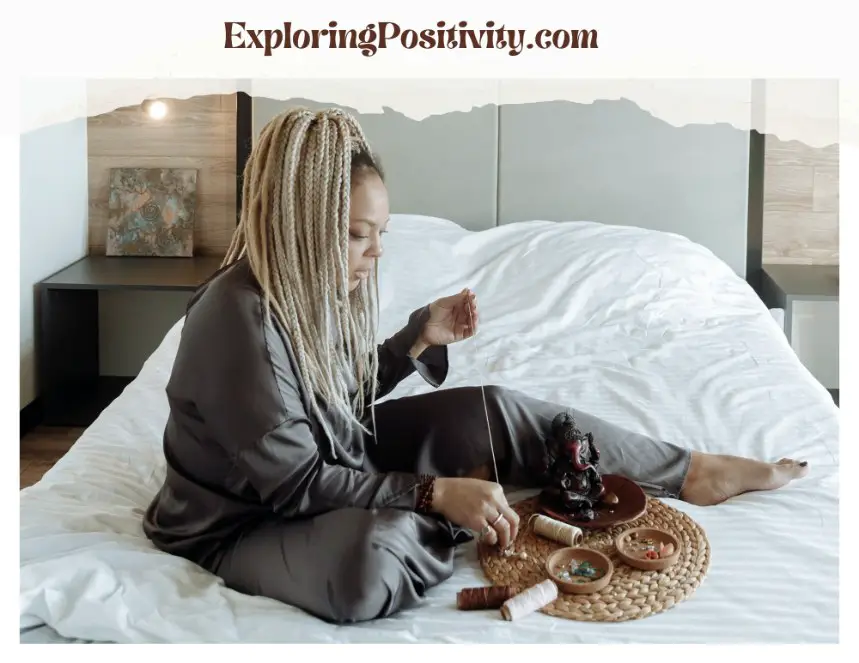
Healing Your Spirit
The spiritual dimensions of life hold deep meaning, grace, and solace. Connecting to your soul essence allows you to access inner peace and strength. Spiritual healing involves finding your purpose, cultivating compassion, and consciously relating to the world through a lens of love.
Exploring Your Sense of Meaning and Purpose
Part of your spiritual journey is discovering what gives your life meaning, direction, and significance. Explore your passions, skills, values, and dreams. Get quiet and listen to your inner voice guiding you to fulfilling paths.
Release culturally conditioned markers of success and tune into your unique soul gifts. Your spirit thrives when you leverage your talents for good and align work with purpose.
Connecting to Your Inner Wisdom
Look within to access your inherent inner wisdom instead of seeking external validation. Spend time in solitude communing with your spirit. Go on long nature walks, pursue creative endeavors, meditate, chant, pray, dance ecstatically – whatever channels your intuition.
This inner tutor already knows the answers you seek. The more you listen, the more loudly your soul speaks.
Developing Spiritual Practices
Pursue spiritual rituals and activities that feel intrinsically meaningful, not out of dogma. This may include meditation, prayer, yoga, chanting, heart-centered journaling, mystical poetry, divination tools like Tarot, attending spiritual events, going on pilgrimages, and learning from masters and texts. Explore and see what practices resonate most with your spirit.
Spending Time in Nature and Community
Studies. Spending time outdoors, away from everyday life’s noise and chaos, reconnects you to your spirit and the web of life. Joining spiritual communities or participating in ceremonies with like-minded souls provides kinship, learning, and growth. Sangha nourishes your soul.
Cultivating Faith, Hope, Gratitude
Learn to surrender to the mystery and perfection of the Universe. Have faith that life is happening through you, not to you. There are gifts and blessings in every circumstance if you look for them.
When hopelessness arises, find one small thing to be hopeful about – and build from there. Maintain a gratitude practice to stay connected to positivity. Your spirit thrives through faith and thankfulness.
Rituals for Renewal and Rebirth
Spiritual rituals provide structure to realign you to sacredness and purpose regularly.
Create meaningful ceremonies – may be lighting candles and incense, working with crystals, putting intentions in nature’s elements of earth, air, fire, and water—rites of passage like births, transitions, and deaths present openings for ritual. Holidays and changing seasons are also potent times for renewal.
Practicing Forgiveness, Surrender, and Trust
Carrying resentment, anger, and blame poisons your spirit. Learning to forgive yourself and others cleanses your emotional body. Surrender control issues and perfectionism—relinquish attachments to specific outcomes.
Cultivate radical self-trust, patience, acceptance, and release. Your higher Self knows precisely what must unfold and when. These spiritual qualities lighten your energetic load.
Integrating Your Healing
The deeply personal work of healing inevitably leads to profound insights, lessons, and shifts. The ongoing process of integrating these to create positive change is vital. Integrating your healing allows you to embody a new, empowered lifestyle guided by self-love.
Ways to Integrate Insights and Embody Your Healing
Keep an integration journal to process breakthroughs and track your growth. Review regularly to see patterns and maintain awareness. Create spiritual rituals to consecrate the newly healed aspects of yourself.
Use mantras and affirmations to imprint supported beliefs. Integrate physical practices like dance, martial arts, yoga, and breathwork to help anchor and physicalize your healing.
Make space for creativity, play, and joy to allow your inner child to flourish. Let your newly healed sense of self express freely. Release rigidity and perfectionism. Follow inspiration. Remember that healing can be pleasurable, not just painful. Light begets more light.
Ongoing Self-Nurturing Practices
Sustaining your healing requires dedicated self-care. Now that you’ve experienced the benefits commit to daily spiritual practices like meditation, journaling, time in nature, and exercise.
Maintain healthy nutrition and sleep habits. Release what no longer serves you. Limit toxic relationships. Keep exploring. This work is never finished. Nurture and honor yourself consistently.
Celebrating Progress and Growth
Pause periodically to acknowledge and appreciate how far you’ve come. Re-read your journals. Feel the expansiveness in your body. Notice old issues dissolving.
Recognize your strength and resilience. I am grateful for your journey thus far. Celebrate milestones with meaningful rituals. Share inspiring parts of your story with loved ones. Continually recommit to your growth.
Living Purposefully and Authentically
Let your healing guide you into greater alignment with your authentic soul essence. Discover your passions. Speak and act from your truth, even if it makes others uncomfortable.
Be compassionately assertive about your needs. Advocate for your well-being and values. Allow your purpose to shine brighter. This fulfills your spirit.
Allowing Healing to Ripple Out and Help Others
A beautiful by-product of your healing work is that it raises collective consciousness and inspires others. When you heal, we all recover. Be open about your journey so others feel empowered to undertake their own.
Practice compassion for those struggling. Offer empathy, validation, and support. Together, we transform. Your healing matters beyond just you.

Last Words on Healing Journey – How to Start Your Healing Journey
Starting a dedicated healing journey takes courage, commitment, and faith. Although the path has many ups and downs, you must trust the process and your inner wisdom. Have patience and compassion for yourself.
This work is continuous, not instant. But the rewards are immeasurable regarding reconnecting with your authentic wholeness and highest potential.
Remember that healing cultivates profound, lasting transformation physically, mentally, emotionally, and spiritually when you devote yourself to the inner work.
Let the insights gained from self-inquiry, therapy, spiritual practices, healthy lifestyle changes, and being in a community integrate wholly into your life. Allow healing to transform you on all levels so you can live and relate to the world in an empowered way.
You have the strength and resilience to confront your issues, release what no longer serves you, and discover more profound dimensions of yourself. This is brave and sacred soul work.
By staying present, trusting your inner guidance, and meeting each stage of the journey with courage and grace, you will continue progressing toward greater wholeness and fulfillment.
Your healing journey reveals invaluable gifts if you open your heart to receive them. Have faith in life’s underlying meaning and wisdom.
You are the heroic protagonist of your story, capable of profound renewal and becoming the fullest expression of the healer you were born to be. Keep drawing on your inner light. The transformation continues.
What exactly is a healing journey?
A healing journey is a holistic, ongoing process of self-reflection, personal growth, and transformation that allows you to address wounds on a physical, mental, emotional, and spiritual level. It involves making intentional lifestyle changes, processing trauma and emotions, releasing limiting beliefs, and cultivating self-love and inner wisdom. The goal is to achieve whole-person healing.
How do I know if I’m ready to embark on a healing journey?
Signs you may be ready include feeling “stuck” in life, experiencing physical illness or pain, struggling with mental health issues like anxiety/depression, holding onto past traumas, lacking a sense of purpose or meaning, having low self-worth, and being ready to make a change. Assess your commitment level and get support if needed.
Where do I start on my healing journey?
Necessary first steps are self-reflection to identify areas needing healing, setting intentions, seeking counseling/therapy, addressing any urgent physical or mental health needs, developing spiritual practices like meditation and journaling, and educating yourself on holistic modalities. Take things at your own pace.
What self-care practices can help me on my healing journey?
Helpful self-care practices include therapy/counseling, mindfulness/meditation, yoga, exercise, proper nutrition, adequate sleep, spending time in nature, developing gratitude, releasing negative self-talk, journaling, joining support groups, and anything else nourishing.
How long does a healing journey take?
It’s a lifelong process, not a quick fix. The journey unfolds gradually through daily self-care practices. There is no definitive endpoint or perfection to reach. Focus on progress over perfection. Address issues compassionately at your own pace without judgment.
How will I know if I’m making progress in my healing?
Signs of progress include feeling more self-aware, grounded, peaceful, empowered, and connected to your authentic self and purpose. You may release old patterns and wounds, gain new insights about yourself, forge healthier relationships, make more conscious choices, and feel more gratitude, forgiveness, and balance.

Subscribe to our newsletter and get posts every week
Related posts.

How to Find Your Passion When you are Depressed: A Guide to Finding Purpose in the Midst of Depression
How to Break Emotional Attachment to Things: Letting Go

Spiritual Abuse PTSD: Unmasking the Shadows

Nothing is Permanent: Embracing the Transient Nature of Existence

Self Care 101: A Step-by-Step Guide to Your Self Love Journey
Self care is the way in which we care for our mental, emotional and physical health. It’s activities we do to keep us as our best selves. Practicing self care is an action-oriented way that we can show ourselves self love. Self love is exactly what it sounds like, loving yourself. It means loving all aspects of yourself, by accepting your flaws, your weaknesses and the things you don’t always like about yourself. It is also about holding high standards for your own well-being and happiness.
For many people, concepts of self care and self love can be new. After all, we are often taught that prioritizing yourself or your needs is selfish and that you should focus your energies on other people. But practicing self love doesn’t make you selfish, or a narcissist, it just means that you won’t settle for less than you deserve, because you understand and respect your own needs. Practicing self care and self love often just means extending the same respect and care you have for others to yourself. We have all heard the saying treat others how you want to be treated. But when thinking about self love and self care it is often important to consider the opposite. Treat yourself with the same kindness and grace you extend to friends, families and loved ones in your life. We are often much kinder to our loved ones than we are to ourselves.
As the saying goes, we are often our own worst critics. Practicing self love means ditching that old adage and moving forward, by creating an environment for yourself in which you can make mistakes, grow and flourish. Self love is a great goal to have, but in practice it may seem a bit abstract to try and achieve, especially if you are not in the habit of practicing self care.
Self care is a practice that can lead you to more self love over time. Self love is not something that will happen for you overnight, especially if you are coming from a place of self-hate, harsh criticism, perfectionism, etc. etc., but it can be slowly incorporated into your life through consistent acts of self care. Working self care into your routine with small, achievable steps will increase your self-kindness, self love and common humanity.
Here are ten tips you can follow when you are on your journey to self love.
Steps to Practice Self Love Everyday
1. recognizing and accepting your emotional state:.
No one is happy all the time. Nor are they positive or the best version of themselves each and every day. An important part of self love is holding yourself to reasonable standards. You must acknowledge that some days will be better than others, and that it’s totally okay to have an off day, or week or even a slump period. It’s important to check in with your emotional state frequently, so that you can recognize your moods and learn to accept them. In practice, this means not acting like things are fine, when you know they aren’t. How frustrated do you feel when someone says “I’m fine” or “It’s nothing” when they clearly are NOT fine and it clearly IS something?? Don’t play those same games with yourself. Tune into your emotional state so that you can act and plan accordingly!
Not only must you recognize your emotional state, but you need to accept it as well. A key part of accepting your emotional state as it is, is tailoring your plans or your routine to your current state. Learning to check in with your emotional state is the basis of any good self care routine. It is also important to recognize when a slump period has gone on for too long. While it is important to cut yourself some slack, take some downtime, or totally give into a bad mood every once in a while, it is also important to understand that our actions, habits and routines can really effect our moods! If you are having a major slump, consider how you can change your routine in a positive way to try to get back in the swing of things. Self care is often a balance of showing yourself kindness and forgiveness and maintaining good habits that work to actively improve your mood.
2. Take time for yourself
Attention all extroverts (and introverts as well)! As great as it is to be around people and to socialize, it’s super important to take time for yourself so that you can evaluate your emotional state (the importance of which we explained above) and dedicate some time to self care. A lot of people have the tendency to stretch themselves really thin between work, daily life and social obligations. And we get it, having a fun social event to look forward to is often what helps get people through the week.
Afterall, who doesn’t love a good Wednesday evening plan to get them through hump day? But it’s important that these social events don’t interfere with your much-needed me-time. For people with extreme FOMO, it can be very difficult to turn down a fun night out or a movie with friends. But sometimes activities that you normally find fun are completely exhausting, because you really should have taken that free time to reflect inward and do some self care. We are not suggesting that you flake on your social calendar, just that you should pencil in some time to do things that rejuvenate you. This can mean literally scheduling time on your calendar that allows you to recuperate! Though finding this alone time in your busy life might seem like the hardest part, once you do carve out some alone time, it’s important not to waste it!
Don’t spend time reserved for self care scrolling through your phone or mindlessly watching TV! Take some time (even just a few minutes!) to do some mindfulness activities and whatever else helps you check in with your emotions. This can mean scheduling a weekly yoga class, planning on taking a walk after work, downloading a meditation app, or taking up journaling. There is no wrong way to practice self care as long as you're doing activities that help you destress and feel grounded. It’s not selfish to prioritize alone time so that you can focus on self love, it’s a non-negotiable step of your self care routine.
Nowadays, staying home means staying safe. Get creative stay-at-home self-care ideas and more with a free 7-day trial of our award-winning relationship coaching app. Install now!
3. Get enough sleep
Sleep is SO important, and often SO overlooked in this day and age. People often find that when they’re super busy and stressed out that their sleep cycle takes a hit. When you have so many things on your plate, it can be easy to justify late nights and early mornings just so that you can squeeze everything in. Sometimes there just aren’t enough hours in the day, and cutting out a lazy morning in bed may feel like the only option. But, when sacrificing your sleep becomes the norm, your mental and physical health will be negatively affected.
When you’re on your journey to self love, it’s important to upkeep your physical and mental health so that you have the time and the energy to work on your emotional health, and self love. Getting enough sleep is the foundation of all forms of health! In addition to getting enough sleep, make sure that you focus on the quality of your sleep. Creating a bedtime routine is a good first step towards improving the quantity and quality of your sleep. There are tons of sleep apps out on the market that can help you track your sleep and can help you fall asleep.
4. Exercising
Physical activity is super tied in to our moods as well as our physical and mental health. A key part of self care is maintaining your physical health so that your body is functioning properly and serving you. Another key part of self care is our mental health, and exercise helps with that too!
Exercise can boost endorphins and help us relieve all the stress that builds up in day-to-day life. If you are really stressed out, adding one more thing (like going to the gym) to your to-do list might seem overwhelming. But exercise doesn’t have to mean sweating it out in the gym! It can be as simple as taking a walk on your lunch break, or doing 30 minutes of yoga (there are apps for that!) when you get home. Getting into a routine that incorporates exercise into your daily life will help maintain your mental and physical health and help you along on your journey to self love.
If you are not in the habit of exercising it can be intimidating to go on a mile-long run, or sign up for a yoga class. Remember to hold yourself to reasonable standards and allow yourself to ease into a more active lifestyle. If you push yourself too hard in the beginning, you will probably get discouraged and give up on exercise altogether. Instead, try to slowly incorporate more movement into your lifestyle and work up towards more vigorous activity. This can mean taking the stairs instead of the elevator, parking at the farthest spot in the parking lot, or hopping off the train or bus a couple stops earlier than you need to to get a walk in.
5. Eating right
How can you expect to be the best version of yourself if you feel terrible? Paying attention to your diet is an important part of self care, because it contributes to how you feel as well as your energy level. You can exercise as much as you want, but if all you eat is junk, there is no chance that you’re going to feel good or be in good physical health. Also, eating healthy can make it WAY easier to exercise, because it leads to higher amounts of energy. Eating right doesn’t mean that you need to be dieting all the time! It’s not about your weight, but more about how you feel. Pay attention to foods that upset your body (a lot of people have intolerances to food that they’re completely unaware of!), and try to get all your main food groups in. Eating right can also affect your mental health. Eating healthy foods can actually help your short-term memory, so, yah, brain foods totally do exist! Eating things like fatty fish, nuts, leafy greens and foods high in antioxidants (blueberries, acai berries) is great for your body, and can actually help your brain function.
Whether you’re ordering in or cooking together, beginning a nutrition journey can bring you and your partner closer. For more ways to get healthy and start feeling good in your relationship, try Relish free for 7 days.
6. Using self-talk
A huge part of your self care journey is learning to engage in positive self-talk. Self-talk is the inner dialogue we have running through our heads most hours of the day. Self-talk is normally something that we do unconsciously and it is often indicative of our subconscious thoughts and feelings. Sometimes our self-talk can be very negative, leading to feelings of self-doubt, self-judgement and even self-loathing. If you find that your self-talk narrative is overwhelmingly negative, don’t fear - there are mindfulness strategies you can use to shift your inner dialogue to be more positive.
An easy and actionable way to do this is to give yourself positive affirmations . What are things you like about yourself? What are you proud of? Reminding yourself of these things on a daily basis (maybe as a part of your morning routine as you brush your teeth for example) can put you in a more positive frame of mind that will organically encourage positive self-talk. An important part of using self-talk to your benefit, is catching yourself when you engage in negative self-talk. If you notice this, try to pinpoint the cause, and move forward in a forgiving way that encourages positivity.
7. Challenging a negative story about yourself
Sometimes if negative self-talk goes unchecked for too long, we start to develop negative narratives about ourselves that can end up being really damaging to our self-esteem . We end up internalizing these negative narratives about ourselves and before we know it, these stories end up changing our attitudes and even our behaviors.
In order to get to the root of the problem, you need to identify the negative stories you’re telling yourself about yourself. Where do these negative stories come from? Are they rooted in a single incident? Next, you need to figure out why you hold on to these negative stories. If you are able to identify why you are perpetuating these stories, you can help break the negative thought cycle that is perpetuating negative self-talk. To challenge these negative stories, you can engage in the same positive self-talk strategies listed above. Start highlighting the good things about yourself to yourself so that you can internalize a positive narrative.
Don’t let self-doubt and insecurities ruin your relationship - get started with our award-winning relationship training app instead. Start your 7-day free trial today!
8. Forgiving yourself
This means embracing self-compassion. We all make mistakes – big and small– and while at the time they may seem earth-shattering, they probably aren’t. Life moves on and so should you. Embracing self-compassion will allow you to reflect on your actions with kindness, empathy and support, which will allow you to forgive yourself for whatever happened. Holding onto a grudge against yourself can be as damaging as holding onto a grudge against someone else.
Grudges require holding on to a huge amount of negative energy, which can be absolutely exhausting. Letting go of the negative feelings you have about yourself or your actions through forgiveness will free up your energy and emotional capacity so that you can embrace more loving behavior.
9. Committing to self love
Achieving self love can be a long journey, not something that just happens overnight. It can take a long time to undo the bad habits we pick up along the way that cause us to be unkind to ourselves. It is important to remember that this is a process that can take time and commitment. Self love is not about instant gratification. Most of us know how to give ourselves a little pick-me-up, whether it’s treating yourself to ice cream, buying a cute new top, or bingeing a couple episodes of your favorite show. And while these things are fun, and you should totally continue to indulge in them, they are not long-term avenues to self-kindness and self love. While you’re on your journey, don’t forget about the little things that bring you joy, but remember that mindfulness and dedication are the keys to success.
10. Commit to learning more
Words like self care and mindfulness seem to be all over the place these days, which is such a win as we all learn to become more introspective and accepting of who we are. This is a noticeably new trend, which means that more research and techniques are coming out all the time. An important part of your self care journey should be committing to trying new avenues for self care, and continuing to learn as these ideas advance. We can always learn to show ourselves more compassion and love. Keeping up on the most recent literature on the subject can help you find creative new ways to care for yourself! Read a book or download a new mindfulness app or even seek out online forums that discuss self care techniques. Engaging with new materials will teach you more and more about how to take care of your mental, physical and emotional state.
Just like any relationship, practicing self-care and self love takes time, patience and commitment. Let Relish help you on your self love journey with unlimited one-on-one coaching, customized lesson plans and more. Click here to get started for free!
Embedded content: https://www.youtube.com/watch?v=4WKvGfnM4BI
By Caitlin Killoren on Jul 30, 2020
With a degree in Psychology and over a decade of experience, Caitlin has made improving people's relationships both her career and her passion. Her work has been featured in publications like Bustle, Well + Good, and Goalcast, and she currently resides in Austin, Texas with her husband and giant fluffy dog, Remy.
Similar Articles

Most Popular Articles

Ready To Start Relishing?
Try free for 7 days.

We’re Hiring!
Privacy Policy
Terms of Use

© 2020 Relish.
- Success Stories
- We’re Hiring
- Take the quiz
- Skip to main content
Dr. Tara Salay
Lilybridge Yoga
in Holistic Living , Mindset · February 10, 2023
How To Start A Self Healing Journey
How to start a self healing journey.

Self healing sounds great but where do you begin? Self healing will look different for everyone but regardless if you’re healing from something physical, mental, or emotional, a self healing journey will have some basic principles that carry through no matter what you are working on.
Before we get into this post, I just want to remind you that a self healing journey does not mean that you disregard modern medicine, it just means that you’re going to take an active role in your healing process. Things like going to the doctor, going to therapy, and sometimes taking medication are all still important. The journey of self healing is in addition to these types of things. I say this because I think sometimes when people get into self healing, some may start to disregard modern medicine etc. and this is not what we should be doing. So just keep this in mind as we dive into the topic of self healing.
4 Tips For Getting Started On Your Self Healing Journey

1. Become an active participant in your healing.
It’s common these days to be presented with a problem and to let other people or “things” fix it without being an active participant. So although things like going to the doctor and maybe taking medicine are important for you, it’s also important for you to take active steps in your health and healing in your everyday life.
For example, if you go to therapy every week but then just go back to your regular patterns when not in therapy, how much progress are you going to make? If you take medication to fix a health issue but then eat like crap, how much are you going to improve? In both cases, maybe you would make some improvements without doing anything additional, but imagine how much more you could improve if you were an active participant in the process. If you really worked on changing your thought patterns when outside of therapy or if you started eating a healthy and balanced diet, I bet you would be further along in your healing process than if you sat on the sidelines.
When you’re an active participant in your healing, you can make much greater strides. So first thing in a self healing journey is to take an active role. This is your body and your mind so it’s important that you are there to work on your healing.
2. Be open to heal.
Be open to heal…sounds simple but is something that many people struggle with. Sometimes we actually get comfortable having issues or challenges and we don’t want to open up to change. When we take on a self healing journey, we really have to be open and ready to heal. You have to want to heal and you have to believe that it can happen.
And being open to heal is going to look different for everyone. Maybe it means you’re totally “cured” of whatever ails you or maybe your symptoms are lessened or your quality of life is better. There’s no one end goal when it comes to self healing.
I’ll use myself as an example. I have OCD and have had it since I was a child. A lot of my own self healing journey has been about my OCD, which back to my previous point, I still go to therapy for in addition to working on self healing…just a reminder! Anyway, my goal for self healing is not to “get rid of” my OCD as research has shown that people who have OCD do have differences in their brain chemistry. My brain is just naturally wired in a different way. Based on this fact, most likely I will always “have” OCD but just because I have it doesn’t mean it needs to control my life. Through my own self healing journey, I’m working on being able to live my life without my OCD constantly gripping at me. Between therapy and my own personal healing work, I’ve been achieving this goal and have seen incredible improvements in terms of my mental health. I share this with you so that you can make a goal that fits for you and so that you don’t feel like there has to be a specific outcome.
In working with people with chronic pain , I often teach people to start with a smaller goal first in regards to self healing and then later on maybe create a larger goal of being pain free if that is where they want to go. Self healing is fluid so your goals will change.
So after that long tangent, tip number two recap is to be open to healing and improving your quality of life. If you don’t think you can get better, self healing will be a real challenge. If you’re in the mindset of feeling like you’ll never be better, trust me I’ve been there too, then that’s your first step in your self healing journey, opening your mind to the possibility of improvement.
3. Start to look past just the mind and body.
Yes the mind and body are important but we are more than just these two things. I look at the mind and body as tools for us to interact in this world we know. If you want to find true healing, you have to start to look deeper than these two parts of you.
Self healing is the type of healing where you start to look deeper within yourself. You’re not just working on the physical body, you’re not just working on the mind, you’re working on a deeper part of your being, be it your spirit, your soul, your energy etc. We’re not disregarding the physical body or mind, but we are looking past these two parts of us at something deeper.
In your journey, you need to begin to explore how the mind, body, and soul interact because the three are connected. What impacts your mind will impact your body and what impacts your body will impact your mind. The soul connects to both the mind and body so getting in touch with your soul, your spirit, your energy (whatever you want to call it) is vital to self healing. There isn’t one set way to do this and it will be an exploration to see what “ignites” your soul connection, but this is such an important part of self healing and this is the part that’s game changing.
I’ve created a free holistic living checklist which outlines how you can start to care for your entire being, body, mind, AND soul. You can access it here: CLICK HERE FOR YOUR FREE HOLISTIC LIVING CHECKLIST!
4. Remember that a journey is rarely linear.
It’s unlikely that your self healing journey is going to be a smooth ride up. You’ll probably experience set backs or times of challenge, that is to be expected. The goal isn’t to constantly be feeling better 100% of the time. The goal is more about when you do dip down a little, you come back a little bit higher each time. Over time, the dip downs start to decrease and you don’t dip down as far or as often. So remember this on your journey.
Something else to remember on your journey, we all experience obstacles and challenges in our lives. It doesn’t matter how “big” or “small” your specific challenge is, this is just a perception. If you feel something is a challenge or issue or obstacle, then it doesn’t matter if someone else may “have it worse” than you etc. This doesn’t make your problem any less important. Minimizing your struggles is of no use, your struggles are valid. I know the feeling of saying, “it could be so much worse,” which it probably could be and maybe this thought does help some people but in my experience, it just pushes you further away from healing because you’re disregarding how YOU feel. It doesn’t matter what others say or think, this is a SELF healing journey.

There is no doubt that a self healing journey is going to look different for everyone. The common theme is that we’re looking deeper within the self and starting to see things differently. And this takes work and can be challenging! You have to put the work in to see the results, you have to challenge yourself and your typical behaviors or thought patterns. Self healing is making a change and we know change is not easy. This is why a self healing journey is so life changing.
Self healing is of one of those terms that I don’t think you can fully understand until you go through it. It’s also a continuing journey because there are always going to be improvements we can make but I’ll tell you, it’s totally worth it.
I know in this post I didn’t lay out for you exactly what to do, but that’s because this journey is so personal. Find what helps you connect deeper within yourself be it meditation, yoga , journaling, reading books on self improvement, whatever it is, there isn’t one set way. If you do like yoga though, I’ll link below a yoga flow for self healing that I’ve created. Remember to enjoy the journey!
Recent Posts
- 10 Sacral Chakra Affirmations March 29, 2024
- Exercises For Your Side Glutes (At Home) March 21, 2024
- Somatic Yoga Exercises For Better Body Awareness March 14, 2024
- How To Eat Clean Food – 7 Tips March 9, 2024
- Why Is Savasana Important? – The most challenging yoga pose February 20, 2024

Let's Reach Success
Build Your Dream Business and Have More Freedom and Income Than You Know What to Do With
- Start a Blog
- Increase Blog Traffic
- Monetize Your Blog
- Start an Online Business
- Productivity
- Life Design
- Side Hustle Ideas
- Success Habits
A Guide to Self-Healing: 10 Steps to Healing Yourself
- November 15, 2023
- by Lidiya Kesarovska
Interested in self-healing? Read on to see how to heal yourself and welcome self-love in your life.
I bet there’s a lot going on in your life right now. There may be dozens of things to do every day, a new job, relationship, maybe a bad thing happened recently, or there’s something new you have to invest time in .
No matter what it is, people always find a way to make themselves look and sound busy, even if they aren’t. But as a result, they do something much worse – they say no to their true desires and emotions, reject the power of self-healing and rarely find time for themselves to contemplate and reach a state of peace .
I often notice more and more people around me neglecting themselves because of something else. And that’s a terrible thing to do.
I’m describing the big picture here. It could be about anyone – of any age, status, social group and so on. It may be a really busy person, as well as one that has a lot of free time. It may be a peaceful and happy one, or a stressed and negative one.
At some point we stopped taking care of ourselves. And because of that everything else gets ruined – relationships, mood, attitude towards life, motivation, level of happiness, a desire to do new things, etc.
We forget to ask ourselves if a certain thing is okay with us, we stop taking chances and looking for ways to improve, we stop doing things for ourselves, we stop trying to reach our goals and neglect our dreams. In other words, we say no to self-healing and self-love.
Instead, we do the opposite. We say things we don’t mean, we do things we don’t enjoy, we live by someone else’s standards and we follow the path society thinks is the right one.
Almost every problem we have in our life comes from discontent and most often with not being okay with who we are.
But we can never move on and have good relationships with other people if we don’t fix the one we have with ourselves first .
If you’ve decided to become a happy person and have embraced the joy of life and the things you’re thankful for, you will also need to accept yourself for who you are. It’s an inevitable part of your journey to healing yourself.
So here’s what you can do to practice self-healing and start loving yourself again.
Self-Healing Techniques to Help You Heal Yourself
“Don’t rely on someone else for your happiness and self-worth. Only you can be responsible for that. If you can’t love and respect yourself – no one else will be able to make that happen. Accept who you are – completely; the good and the bad – and make changes as YOU see fit – not because you think someone else wants you to be different.” Stacey Charter
The solution to healing yourself lies in simplicity. I’ve listed some easy ways to start taking care of yourself again and live the life you deserve .
It’s not that we don’t know the following things… it’s just that with everything else going on we keep them in the background. And we need to be constantly reminded of them.
So here is a simple guide to the easy steps (in no particular order) that can help you with self-healing:
1. Accept yourself.
Most often the problem is that we don’t accept the person we are now. However, we have many other versions of the person we want to be, and we occasionally think of the person we used to be. That makes things even worse as we’re concentrating on unreal situations and thus lower our opinion of ourselves as we will never answer the expectations we have for the future us.
So let’s take a moment every now and then to accept ourselves for who we are. With our good and bad sides, with our past failures and mistakes. Let’s understand that this is exactly who we need to be at this moment and we are perfect.
Only then can we aim to achieve more and become another version of ourselves. Probably a better one. And then accept it again.
Related: How to Feel Good About Yourself
2. Don’t give up on what’s important to you.
Big dreams take time to come true. But if we stay motivated, have a definite desire and make an effort every day, they eventually become reality.
Unfortunately, we give up on them long before that moment has come. And then we feel disappointed of ourselves, we become full of regrets and will always think “What could it be like if we had kept working on our goal and achieved it?”. And that worsens the relationship we have with ourselves.
I urge you to keep what’s important to you. To cherish your goals, dreams and desires and spend time, energy and effort on them every now and then. Even if you don’t make big progress, you’re staying true to yourself and practicing self-healing.
Related: How to Accomplish Goals Faster Than You Can Imagine
3. Forgive yourself.
You may have failed. It may be you who caused something bad to happen, broke someone’s heart and left something you wanted incomplete. But living with the guilt, with that awful feeling of having made a mistake, is just harmful to your soul.
I’ve always said that one of the best qualities someone can acquire is the ability to easily forgive people no matter what they’ve done . It’s really hard, but this way you’re not only letting them live in peace, but also letting go of what has happened and moving on without the burden of the past.
The same applies to you when you’ve done something wrong. Don’t carry that emotional baggage with you in your future. There is just no point. That will only prevent you from living happily.
Forgiving yourself means being free from the regrets and disappointment that go along with your past mistakes. It means turning over a new leaf , giving yourself a chance to show the world how great you are and receiving the opportunity to do remarkable things with your life.
4. Don’t try to impress others.
I think everyone needs to see that for himself, but the sooner you realize it, the better. I’m talking about what other people think of you, whether they like you or not, and answering their expectations.
All that is a lost cause. You can spend years trying to make everyone like you and even when you become the perfect version of what society wants, there will still be a part of it that won’t approve you.
It’s just that there are so many people out there and everyone is completely unique, with his our understanding of the world . So stop trying to impress them and do what you like instead. Wear what you think looks good on you, behave the way you want and try to impress yourself only by being happier.
Related: How to Let Go of The Need for Approval to Start Thriving
5. Listen to yourself.
That’s a bit similar to the previous item because we often find other people’s opinion of us to be more important than our own. And then our actions are a result of it.
That is a wrong way to live life and I think it would be much better if we listened to ourselves more often. That’s a wonderful self-healing process.
6. Be kind to yourself.
Don’t be too harsh ! If you have failed, it’s okay. Accept it and move on.
If something hasn’t turned out the way you expected, it’s okay and probably wasn’t even under your control.
If you’ve cheated on your diet, just call it a day and make it a reward for what you’ve already achieved.
If you’ve disappointed yourself, get over it. You’ll do better next time.
Being kind to yourself is as important as forgiving. They are both processes that define what the relationship with your true self will be. And things will be brighter in the future if you make it a good one.
7. Trust yourself.
Make and keep the promises you make to yourself.
Losing trust in yourself usually occurs after failing in developing a new habit many times, procrastinating or not doing something important to you. You realize it’s all your fault because no outer factors play any role here.
You start criticizing yourself, lowering your self-esteem and lacking motivation to try new things because you think you’ll fail again.
Then it’s time to regain that trust and build the self-healing skill of turning each failure into a success .
You need to stop listening to the critical voice in your head for a start. It’s not right simply because it blames you for your failures, whereas they are just external events showing that your system is wrong.
The solution is to let past mistakes go and try again another way. Success is just around the corner.
Read also: Living Life on Your Own Terms: 4 Powerful Ways
8. Understand yourself.
Try to figure out the ‘why’ behind everything. Why you do what you do is an important thing to know so that you get to know yourself better.
Notice your thoughts and follow them. Analyze your desires and needs. Try to understand your behavior and then you’ll be able to be in harmony with it.
9. Appreciate yourself.
Be grateful for who you are. It took you a lot of time, hardships and experience to come to where you are. So appreciate your efforts and enjoy the person you’ve become.
10. Love yourself.
Simply love yourself. You choose whether you’ll always be wishing you were someone else and trying to hide your true nature, or rejoice it and make the best of it.
FAQ on How to Heal Yourself
1. what does it mean to “heal yourself”.
Healing yourself is a holistic process that involves addressing emotional, mental, and spiritual aspects of your well-being. It’s about recognizing and releasing past traumas, negative patterns, and limiting beliefs, fostering self-love, and embracing a journey of personal growth and spiritual awakening.
2. How can I start my healing journey?
Begin by acknowledging your emotions and experiences without judgment. Reflect on areas of your life that may need healing and set an intention to grow from them. Seek support from friends, family, or professionals, and consider incorporating practices like meditation, journaling , and mindfulness to enhance self-awareness.
3. What role does self-love play in healing?
Self-love is a cornerstone of healing. It involves accepting yourself with kindness and compassion, treating yourself with the same care you would offer a loved one. By cultivating self-love, you create a nurturing environment for healing and empower yourself to break free from self-destructive patterns.
4. Can spiritual practices aid in the healing process?
Yes, spiritual practices like meditation, prayer, and energy healing can be powerful tools for self-healing. They help you connect with your inner self, tap into higher consciousness, and find a sense of purpose. Incorporating these practices into your routine can enhance your overall well-being.
5. How do I deal with setbacks on my healing journey?
Setbacks are a natural part of the healing process. Approach them with patience and self-compassion. Reflect on what triggered the setback, learn from the experience, and use it as an opportunity for further growth. Seek support from your community, and consider adjusting your self-care practices as needed.
6. Is forgiveness important in the healing process?
Forgiveness, both of yourself and others, is a vital aspect of healing. Holding onto resentment and guilt can impede progress. Practice forgiveness as a way to release negative energy, free yourself from emotional burdens, and open the door to inner peace.
7. How can I integrate self-love into my daily life?
Incorporate self-love practices into your daily routine. This can include positive affirmations, self-care rituals, and setting boundaries. Prioritize activities that bring you joy and fulfillment, and remember that self-love is an ongoing process that requires consistent nurturing.
8. Can healing yourself positively impact relationships with others?
Absolutely. As you heal and grow, you’ll likely find that your relationships transform as well. By fostering self-love and emotional well-being, you’ll be better equipped to establish healthier connections and contribute positively to the well-being of those around you.
9. How do I know if I need professional help on my healing journey?
If you find that your healing journey is particularly challenging, seeking professional support is a sign of strength, not weakness. Therapists, counselors, and spiritual guides can provide valuable insights, tools, and guidance tailored to your specific needs.
10. Is there a timeline for healing, or is it a lifelong journey?
Healing is a continuous, lifelong journey. There is no fixed timeline, as everyone’s path is unique. Embrace the process, celebrate your progress, and remember that healing is not about reaching a destination but about evolving and becoming the best version of yourself.
So that’s how you practice self-healing in daily life and learn to feel worthy again.
- Affirmations
- Book Recommendations
- Write for Us

Self Love: 24 Tools to Help You Heal Through Self Love

Self love is a big part of our healing journey. We repair our hearts by learning to love ourselves the way we wished we were loved growing up. This is a process and requires patience, self-compassion and practice.
Healing is a lifetime journey.
Yet, there are periods in our lives when we go through an intense process of releasing and healing. This can also make us feel vulnerable. Healing involves getting out of our comfort zone, which can create fear in us. Self-love is going to be your best friend during times of healing and transition.
24 Tools to Start Your Own Healing Journey Through Self Love
I want to share some tools that can help you love yourself more and keep your vibrational field strong against negativity. If you protect the seed that is trying to sprout within you, you will heal faster.
1. Visualize Your Ideal Life.
Imagining every detail of your ideal life is the first step you take on your journey through self love. Where you live, how you wake up, who you talk to, what you eat and so on. Help your subconscious to prepare you for all of it. Our imagination works like a theatre stage where we rehearse the future which we desire to live in.
2. Focus On Your Healing.
Believe that you can heal and that you deserve to heal. We weaken our energy flow when we put energy into what others are saying, thinking or doing. We can’t change others but if we put our energy into our own healing, either they will fall away or they will rise with us.
3. Exercise to Keep Your Body and Mind Strong .
Exercise raises our vibration and teaches us self-discipline- which is a foundational self love practice. It also gives us the opportunity to practice mindfulness naturally because we can only focus on one thing at a time. Our mind will either be the yoga pose we are in or on our coworker’s negative comments. Keeping our body active makes that choice easier.
4. Set the Intention to Only Allow Positivity in Daily.
For anything to enter our energy field, we need to be allowing it on some level. Fear makes this even more possible. State your intention to only allow positive people and messages into your life. Be protective of your energy while you are in a vulnerable place.
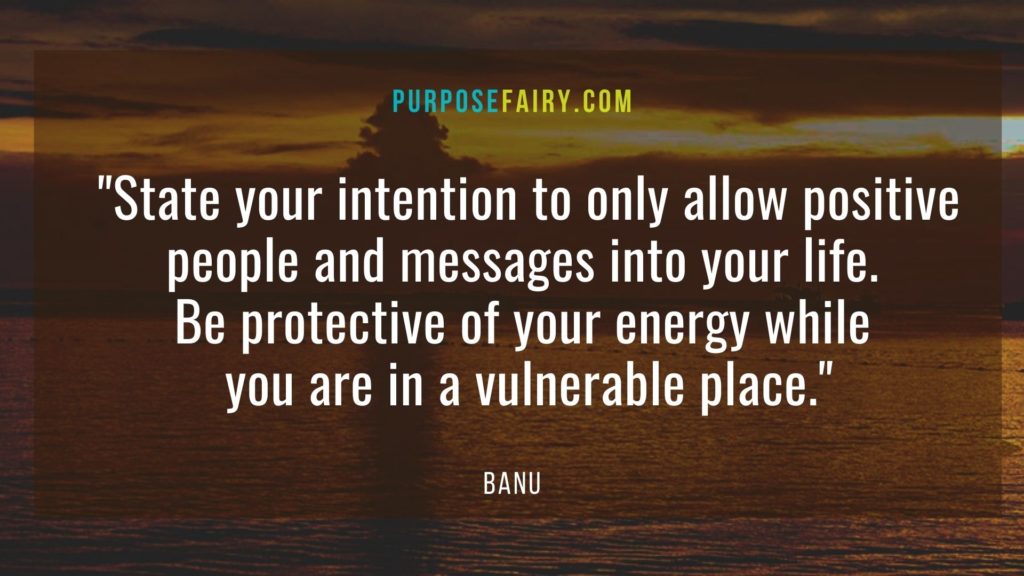
5. Stay Connected to Your Spirituality Through Prayer and Meditation.
This will help keep you centered. You will be less vulnerable to outside energies and this is another step you take on your self love journey.
6. Inspire Others to Be Their Best Se lves
Inspire others to be their best selves and you will also feel inspired by the energy you give out. Supporting them will help you give permission to yourself to be even greater. Encouraging their uniqueness will help you embrace your own.
7. Interrupt Negativity .
Make it a practice to distract your mind when it gets on a negative loop. Choose the next positive thought that you can (and keep doing it) to break the loop. Distract yourself with a positive activity (even going for a short walk) to help the process.
8. Make Time For Relaxation.
Stress acts like a fan blowing against our desires and makes manifesting more difficult. Relax your mind and body before you take on creative projects. Taking baths, getting massages, taking a leisurely stroll by the beach or sitting in the sun at a park can quickly recharge your energy.
9. Music is Medicine.
Listen to high-vibe music to uplift your mood and living & workspace. You can use music to create the mood you wish to be in- whether it is calm and relaxed or energized and playful.
10. Give Yourself Compliments.
Use ‘I Am’ statements that you would want to hear. This will uplift your mood immensely and build your self-esteem. Talk to yourself lovingly throughout the day. Catch yourself doing positive things and celebrate your small successes.
11. Explore Different Parts of Yourself Towards Wholeness.
Dressing outside of your usual style can bring those aspects of you out. It will help you be more at ease with yourself and increase your confidence, which is an incredible attractor by itself. Allowing the expression of different aspects of us raises our energy because it makes us more authentic.
12. Keep The Promises You Make to Yourself.
Start with the simplest things to build energy before you make a big commitment (such as, “I will work out 5 hours week”). This will increase your confidence and make your affirmations work better because it strengthens the Throat Chakra- which is a major power center for us!
13. Be Around Fire.
If a campfire is not an option, light candles and call in protective energies that you feel connected to. Fire has a very primal effect on our nervous system (ancestral memory) and can bring ease to our emotions.
14. Practice Gratitude.
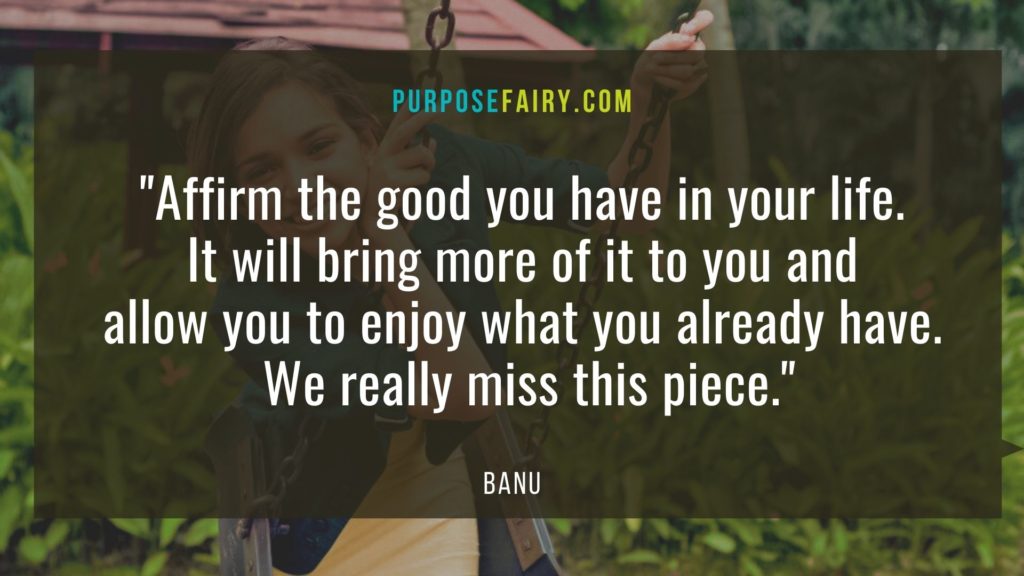
Affirm the good you have in your life. It will bring more of it to you and allow you to enjoy what you already have. We really miss this piece.
The combination of dance (movement) and music have been used as a healing salve throughout history. This combo raises our energy (Chi), thus making us stronger against lower energies.
16. Get Creative With Your Hands.
Cooking new recipes, gardening, crafts, origami, a mosaics workshop, and so on. This will activate the healing properties of your own miraculous brain. We heal when we are in joy the fastest.
17. Strive to Create Balanced Relationships.
Our give-and-take balance affects our mood, confidence, and creativity.
18. Burn Lemon/Orange peels.
Citrus repels negative energy and cancels low vibes in your energy field. Essential oils work the same way. Use vibrational medicine to clear yourself of low-vibration (fear-based) thoughts forms and outside energies.
19. Spend Time With Animals and In Nature .
It is the most natural medicine for our energetic bodies.
20. Focus on Self-Care.
Develop self-care routines by listening to yourself and recognizing what feels good to you.
21. Create tribal connections.
We all have ancestral wounds that show up in our daily lives. It comes with the territory. Rekindling relationships with elders can help heal old wounds and our 1st (Root) Chakra.
22. Enjoy the Beauty and the Vibrational Medicine of Flowers.
Flowers are the crystals of the plant kingdom. They emit pure divine energy effortlessly and they want to share the gift coded in their DNA with us. They have jobs here and they love us.
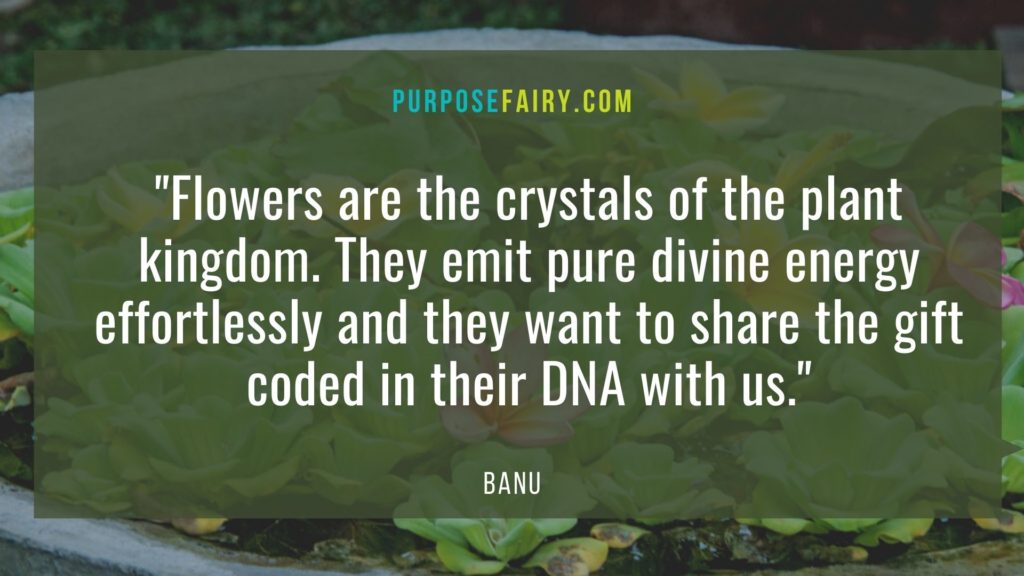
23. Lend a Helping Hand.
There are many studies proving that observing kindness affects our nervous system the same way it does of the person’s giving it. Offering kindness increases our vibration and sense of self-worth.
24. Smile More.
Not only it makes you more attractive but invites connections in. We become more available to receive when we smile.
I hope you find some of these helpful. Use them to upgrade your life this year. May your journey forward be filled with adventures and priceless personal discoveries.

Banu is an intuitive coach and a healer. Her passion is removing mental, emotional and energetic blocks that hold people back from the ultimate joy of living. You can connect with her on her website and her budding Facebook Group.
You may also like
The 4 stages of life according to carl g. jung.
“Thoroughly unprepared, we take the step into the afternoon of life. Worse still, we take this step with the false presupposition that our […]
Stress Less Live More
Let’s talk about STRESS Everyone seems to be stressed out by something in this world we are living. Stressing about money, stressing about […]
In the Pain There Is Powerful Healing
I love Wayne Dyer! I love his wisdom and I simply can’t describe in words what I feel every time I listen to this […]
© Copyright Purposefairy.com

50 Self-Love Journaling Prompts for Self-Discovery & Reflection
By: Author Taylor Lorenz
Posted on Last updated: 12/12/2023

Journaling is a powerful practice that allows you to reflect on yourself and become more self-aware. By becoming more aware of yourself through understanding your thoughts and habits is what has the ability to completely transform your life.
When you journal for self-love you’re really journaling to discover more about yourself, to reflect on yourself, thoughts, and actions. In the process of learning to love yourself, you go through periods of acceptance, and forgiveness and learn to grow your confidence and worthiness too.
By journaling, you’re really tackling your own self-care, which is without a doubt, directly linked to your own love. Expect these journal prompts to cover a wide range of self-care journaling ideas that all contribute to your overall mental health, raising your vibration and revealing what is holding you back.
It’s not necessary to commit to self-journaling daily, but if you’re new to journaling then I highly recommend doing a couple of these prompts a day to keep you in a beautifully high state of love.
Grab your self-love journal and get ready for the most amazing journey of discovering yourself.
Table of Contents
Self-Love Journal Prompts

The following self-love journaling prompts are broken down into sections to help you navigate through which kinds of questions you need to answer for yourself. Self-love is not something that happens overnight as it is a high vibration and feeling that is accessed after other emotions such as acceptance, happiness, joy, and more.
I truly believe that in order to wholeheartedly love yourself you must first accept yourself and forgive yourself. Once you have moved through these stages then love will come so much easier. Letting go of your past and your limiting beliefs is the hard part but it is so worth the effort.

Journal Prompts for Self-Love
Return to these journal prompts as often as you need, most of these reflective questions we need to answer at different times or phases of our life because the answers can change!
- What would I do today if I loved myself?
- What do I imagine/believe self-love feels like?
- How can I support myself today?
- What makes me happy?
- What does a person who loves themself do for themself?
- What makes me feel alive?
- What boundaries do I need to set for myself?
- What am I doing that is distracting me from being with myself?
- Where can I say no more?
- If I loved myself, what would I do every day?
- What’s a commitment I can make to myself to love myself every day?
- Who can I give more love to? (When you give more love, you’ll get more back in return from yourself and others).
- What does my perfect day look like?
- How do I treat people that I love? How can I treat myself the same?
- Who inspires me? What is it about them that I love? How can I be just as inspiring to myself?
- Where in my life can I stop playing the victim and instead play the victor?
- What did I love to do as a child? How can I bring more of that info my life?
- Write down 5 self-love affirmations that I need to hear. Repeat them daily.
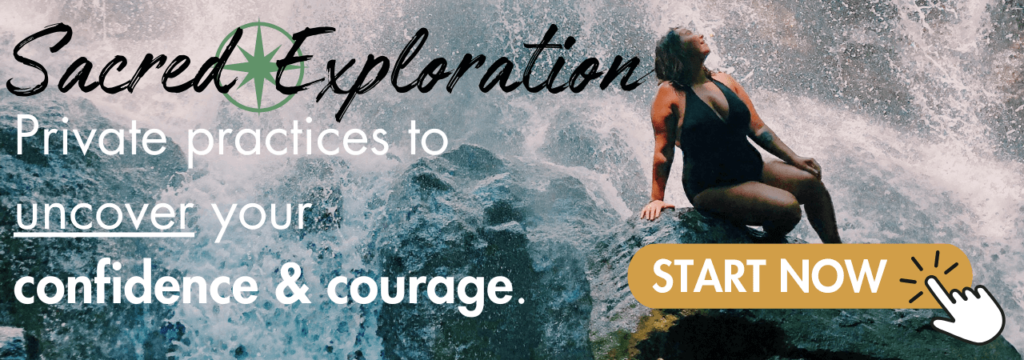
Journal Prompts for Acceptance
I deeply believe that journaling for self-love must always begin with acceptance. If you aren’t quite sure where to start in your journey to loving yourself then start here.
- What are the five things that I currently accept about myself?
- What do I want to change most about myself? How can I first accept that part of myself and love it?
- Where am I letting myself play small?
- Do I allow myself to accept compliments from others?
- What do I struggle to love most about myself? What can I do to begin to love that part of myself?
- Where in my life do I have feelings of unworthiness for my own love?
- Where am I blocking my own love from myself?

Journal Prompts for Forgiveness
An often overlooked part of the journey of life is healing through forgiveness. These journal prompts will greatly affect your mental health and allow you to release so much shit that you may not have even realized that you were holding on to.
- What habits do I have that keep me comparing myself to others? How can I let these habits go?
- What activities, habits or people make me feel unhappy? Can I let them go?
- What negative beliefs do I have about myself? Are they true?
- What am I holding onto that I need to forgive myself for?
- What can I thank myself for?
- What do I judge myself for? How can I let go of that judgment?

Journal Prompts for Self-Worth & Confidence
The more you love yourself the more confident you’ll feel. Add these questions to your notebook to help you feel more positive about yourself, your body, your mind and habits.
- What am I grateful for about myself ?
- What am I proud of myself for?
- What is the best compliment I’ve ever been given?
- List 5 things I dislike about myself. How can I rephrase them to become an opposite belief? Example: I hate my thighs to I love my thighs because they allow me to walk.
- What are my talents?
- What are my biggest dreams? What can I do today to start making one of those dreams happen?
- What makes me unique? How can I use this uniqueness more in my life?
- What is something I wish someone else would tell me? How can I tell myself that more often?
- What do I believe I deserve? Why am I deserving of it?
- What is one thing I can do today that will make me feel great?
- What’s something that I’m really good at?
- What clothes do I love wearing and feel good in?
- List one thing I’m grateful for, for each part of my body.
- Write a letter to me from my highest self who knows that everything is working out for me. What would she say to me?
- What are 5 things my past self would love about my current self?
- What is a challenge that I have overcome?
- What do I love about my personality?
- What do I love about my body ?
- What do I love about my mind?

I hope these self-love journaling prompts were eye-opening and have helped you become more self-aware. If your self-love journey is just starting then congratulations, it’s truly an adventure of a lifetime.
Want more self-love practices?
- 10 Best Self-Love Books for Women
- A Short & Simple Meditation for Self-Love
- Body Acceptance Quotes to Feel Great Now
- Inspiring Body Love Quotes
- More Self-Love Tips!
Disclaimer: This post may contain affiliate links which I earn a small commission from and are at no additional cost to you. See my disclosure policy for details. Thank you for supporting my small business!
Disclaimer: Taylor’s Tracks is a participant in the Amazon Services LLC Associates Program, an affiliate advertising program designed to provide a means for us to earn fees by linking to Amazon.Com and affiliated sites.

Love Beyond The Battle
Love beyond the battle, micah bravery.
In "Love Beyond the Battle," prepare to be taken on an extraordinary expedition through the realms of courage, resilience, and the ultimate power of love. This captivating memoir recounts my personal odyssey as I confronted the daunting battle with cancer, and the transformative redemption that followed.
As cancer's dark shadow loomed over my life, I confronted the harsh realities of pain and suffering. But amid the turmoil, I discovered a beacon of hope that would lead me to unexpected revelations. Love, the most potent elixir, became the central theme of my journey of self discovery. It was a force that transcended the physical confines of my body, reaching deep into my soul.
_edited.jpg)
Embark on a transformative journey with "Healing Unanonymous," a profound exploration into the heart of healing and human connection. Inspired by the rich tapestry of shared experiences and individual resilience, this guide beckons you to traverse a path filled with introspection, renewal, and deep communal ties. Anchored in the life lessons of Micah Bravery, whose odyssey through emotional transparency and authenticity is both a beacon of courage and a testament to the power of vulnerability, "Healing Unanonymous" offers a lighthouse for those adrift in the tumultuous seas of emotional turmoil.

Healing Un Anonymously
All books under the tittle of.
.png)
Love Beyond the Battle The Book! TheMovement!
Love Beyond the Battle" is not merely a memoir; it is a compass for navigating life's most tumultuous storms. Whether you've been touched by the trials of illness, the weight of personal battles, or simply seek an understanding of the human spirit's tenacity, this self love story books offers a luminous testament to the healing power of love. Through an intimate odyssey marked by courage, humor, and self-discovery, readers are reminded that even in the darkest moments, redemption and resilience are within reach. This deeply personal journey resonates with anyone who has faced challenges, offering both solace and a guiding light. Embrace the transformative power of love and find strength in its boundless depths. Purchase "Love Beyond the Battle" to embark on a soul-stirring journey of hope and redemption.
A Journey of Cancer & Redemption
I n "Love Beyond the Battle," prepare to be taken on an extraordinary expedition through the realms of courage, resilience, and the ultimate power of love in this self-love journey book. This captivating memoir recounts my personal odyssey as I confronted the daunting battle with cancer, and the transformative redemption that followed on this self-love journey.
A s cancer's dark shadow loomed over my life, I confronted the harsh realities of pain and suffering, and this self-love journey book serves as a testament to the enduring power of love for oneself. But amid the turmoil, I discovered a beacon of hope that would lead me to unexpected revelations about my self-love journey. Love, the most potent elixir, became the central theme of my healing journey, showcasing the importance of self-love.
I n the face of adversity, I found an oasis of love and laughter in this self-love journey book. Instead of succumbing to despair, I embraced the power of humor as my armor against the darkness. Laughter was my secret weapon in this self-love journey book, and it played an integral role in illuminating the path to healing.
B ut the real revelation lay in the profound act of self-love that emerged from the depths of my spirit as I embraced the cancer within, demonstrating the transformative power of self-love on this journey. I discovered that by acknowledging and embracing the cancer within, I unleashed a powerful transformation through self-love. In loving the very source of my pain, I discovered a newfound strength that shattered the chains of suffering on this self-love journey..
A s the pages unfold in "Love Beyond the Battle," it unveils a deeply sincere and intimate exploration of self and the profound understanding of self that can only come through the crucible of such a life-altering journey, making it an essential self-love journey book. My story weaves a tapestry of redemption, self-acceptance, and the indomitable human spirit, emphasizing the importance of self-love on this journey.
J oin me on this profound odyssey of love and redemption, as I navigate the uncharted waters of cancer with unyielding courage and unwavering determination in this self-love journey book. Together, we will celebrate the triumph of the human spirit over the darkest of adversaries, highlighting the importance of self-love.
" L ove Beyond the Battle" is not just a story; it's a testament to the enduring power of love for oneself in the context of a self-love journey book, and for those who walk this journey with us. It is a story that will resonate deeply with anyone who has faced life's greatest challenges, and a reminder that redemption lies in the depths of our own hearts in this self-love journey book.
I n this tale of hope, resilience, and transformation within the context of a self-love journey book, we will embark on a shared journey of healing and self-discovery. Let us embrace the power of love beyond the battle and the significance of self-love in this self-love journey book, for it is love that ultimately triumphs over all. Together, we shall find solace in the knowledge that redemption is possible, and love is the beacon that lights our way on this self-love journey book.

Journey of Healing

Power of Love
Resilience & redemption, self-discovery through adversity.

Yes, This book is for you!
One should buy "Love Beyond the Battle" because it is a transformative tale that delves deep into the human spirit's resilience against life's most formidable challenges. This memoir offers more than just a narrative; it provides a roadmap to redemption, drawing strength from vulnerability. Whether you've faced cancer, encountered insurmountable challenges, or simply seek inspiration from a testament of love's enduring power, this books in self love swill guide, uplift, and empower. It illuminates the profound realization that in the midst of darkness, it's love, self-acceptance, and laughter that can light our way and offer healing. It's not merely a memoir; it's a universal message of hope and resilience that will resonate with every reader.
While this books in self love may be set against the backdrop of my cancer journey, it is not merely an account of the medical battle. Instead, it dives deeply into the emotional odyssey that unfolded alongside it. It's about the profound metamorphosis of my laughter, the unexpected hues of emotions I navigated, and the unique love I fostered for the very challenge I faced. By embracing and loving my cancer, I aimed to diminish its power over me, using love not as a passive emotion but as an active weapon in my arsenal.
Why it works
- Embracing Emotions Instead of suppressing or denying feelings, acknowledging every emotion - be it fear, anger, or sadness - is essential. This acceptance can lead to a clearer understanding of oneself and can be cathartic, allowing for genuine healing.
- Finding Humor in Adversity Using laughter as a therapeutic tool, the book emphasizes finding moments of levity even in the gravest situations. Humor can be a coping mechanism, releasing endorphins and reducing stress.
- The Power of Self-Love The act of loving oneself, including the challenges or adversities one faces, can be transformative. By loving and acknowledging the very source of pain or challenge, one can foster resilience and empower oneself to overcome obstacles.
- Connecting with Others Sharing one's journey, being vulnerable, and connecting with others who might be going through similar challenges can offer mutual support and understanding. This fosters a sense of community and reduces feelings of isolation.
- Mindful Reflection Regular introspection and reflection can lead to deeper self-awareness and understanding. By contemplating and analyzing one's reactions, emotions, and choices, one can achieve mental clarity and peace, paving the way for personal growth.
Contact us any time
Thanks for submitting!
AND OVER 400 NEWS SITES
Activate your Feminine Magnetism
Tired of feeling stuck & clueless on how to tap into your feminine power? This book shows you exactly how.
hurry! get it now first 1000 sales get the shadow work book free.

become more confident & magnetic
100 self love quotes for your healing journey.
« Living For Yourself And Not Others’ Approval
37 Best Feminine Hobbies To Activate Your Feminine Energy »
Girl Therapy
Tea lovin pink pilates princess who is obsessed with girly things, self care and wellness. I’m Favour and I started this blog to help you reconnect with your femininity.
Amazon Must Haves
Bestseller ebook.

New On The shop

Shop My Etsy Shop

What's Hot Right Now!
150 Juicy Feminine Energy Texts To Keep Your Man Hooked!

How To Glow Up Into The Ultimate IT Girl
17 Feminine Outfits That Are Effortlessly Chic For Summer

Self love quotes are great reminders for you to be validated in your self worth just like affirmations . Practising self love isn’t always easy but it is worth it because it contributes to your happiness and success.
Loving yourself has so many benefits, some of them being less stress, anxiety and depression . When you do start to love yourself you start to practise more self care and this starts to show up in your relationships.
You no longer think it’s acceptable for you to keep chasing people who constantly shut the door on your face. Pain isn’t an emotion that is addicting to you and you’d rather opt for peace.
The love you have for yourself makes it easy to walk away from people who are unsure about you, or people who leave you feeling confused, anxious and up at night. You now understand that you truly deserve happiness, reciprocity from others and are worthy of love.
Theses quotes about self love, healing and self love poems from the likes of Rumi, R.H. sin and Rupi Kaur will help you stay on the right track in your healing journey.
You May Also Like : 51 Spiritual Quotes About Healing And Finding Inner Strength
Related: 17 Ways To Learn To Love Yourself Again
Related: 100 Powerful Affirmations For Self Love And Happiness
Read More On 7 Life Lessons I learned In My Healing Journey
Self Love & Healing Quotes

Healing doesn’t mean the damage never existed. It means the damage no longer controls your life.
Akshay Dubey

Sadly we settle for what we are used to even when what we are used to is pain.

If you walked away from a toxic, negative, abusive, one-sided, dead-end low vibrational relationship or friendship you won.

I hope you always have the courage to love yourself no matter how many times the world breaks your heart.
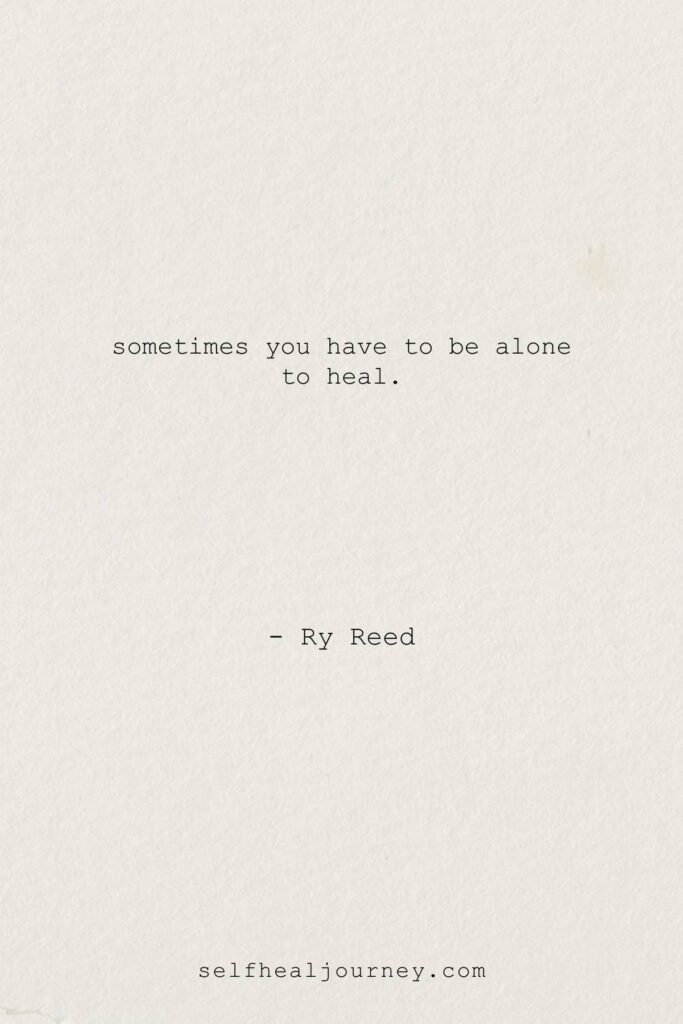
Sometimes you have to be alone to heal.
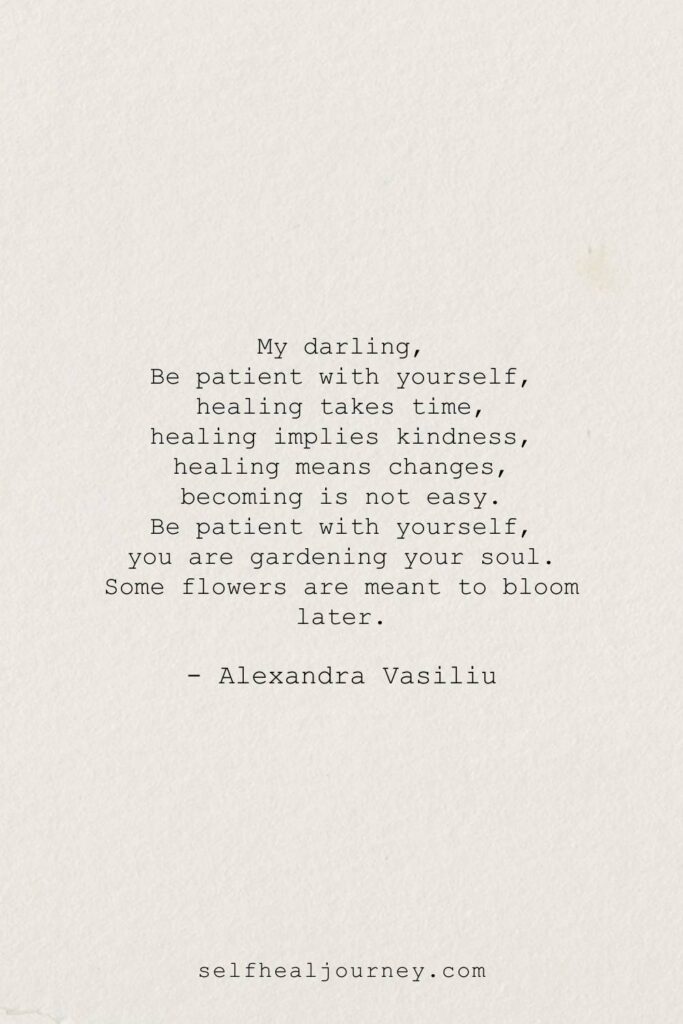
My darling, be patient with yourself, healing takes time, healing implies kindness, healing means changes, becoming is not easy. Be patient with yourself, you are gardening your soul. Some flowers are meant to bloom later.
Alexandra Vasiliu
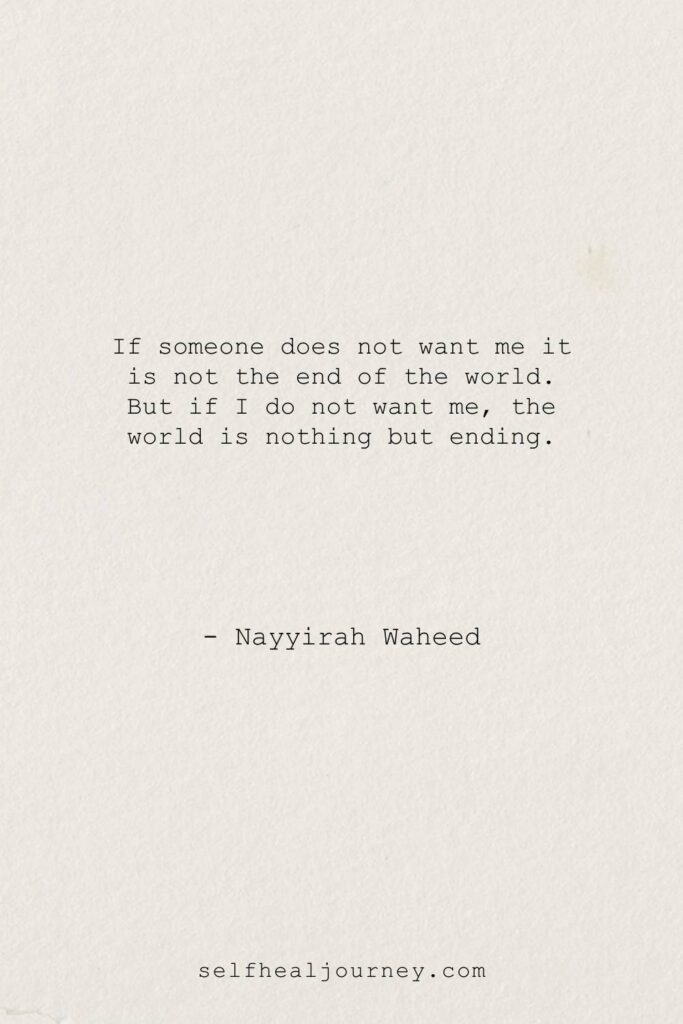
If someone does not want me it is not the end of the world. But if I do not want me, the world is nothing but ending.
Nayyirah Waheed
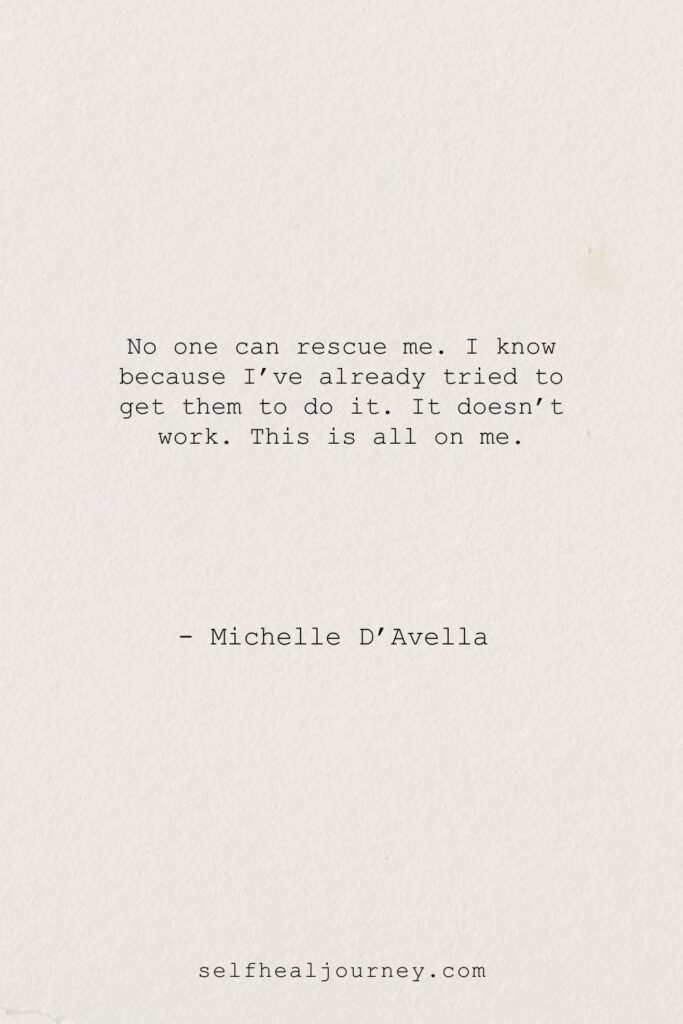
No one can rescue me. I know because I’ve already tried to get them to do it. It doesn’t work. This is all on me.
Michelle D’Avella
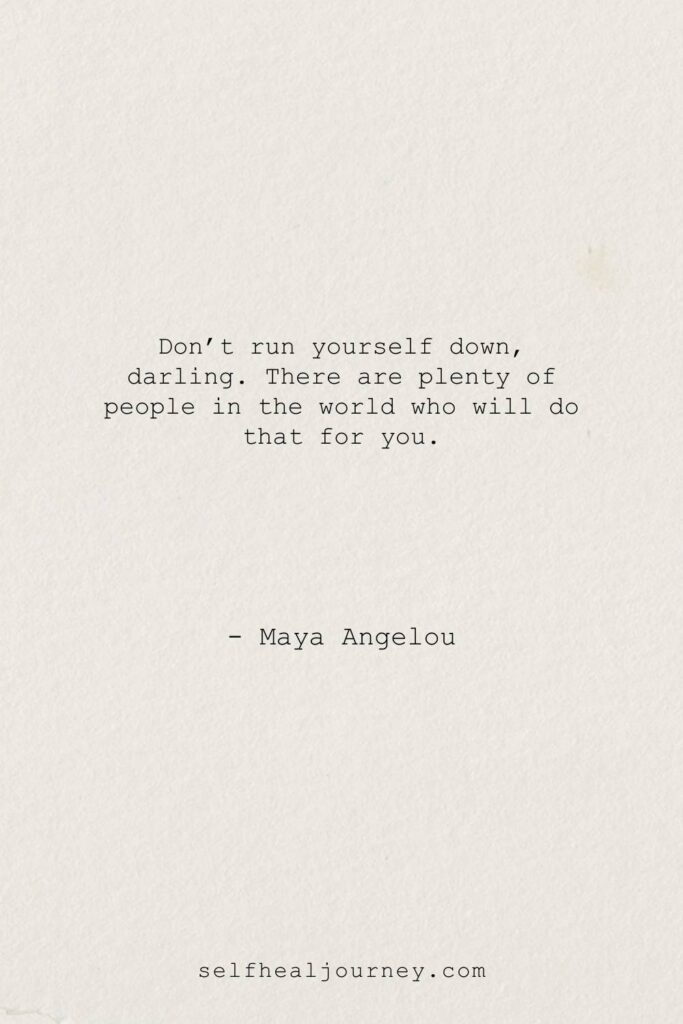
Don’t run yourself down, darling. There are plenty of people in the world who will do that for you.
Maya Angelou
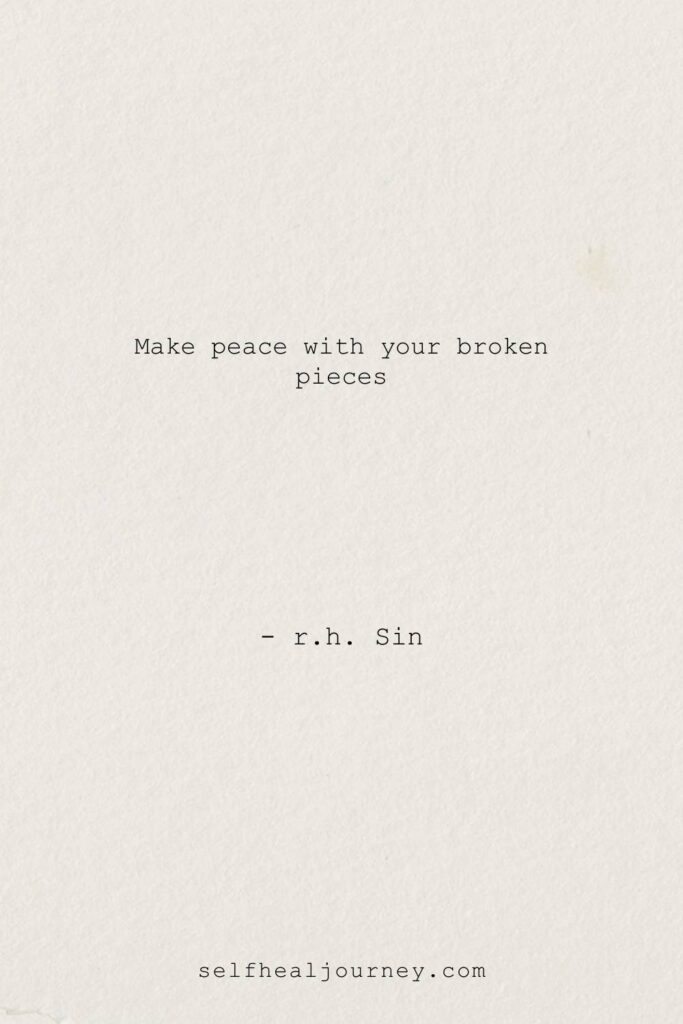
Make peace with your broken pieces.
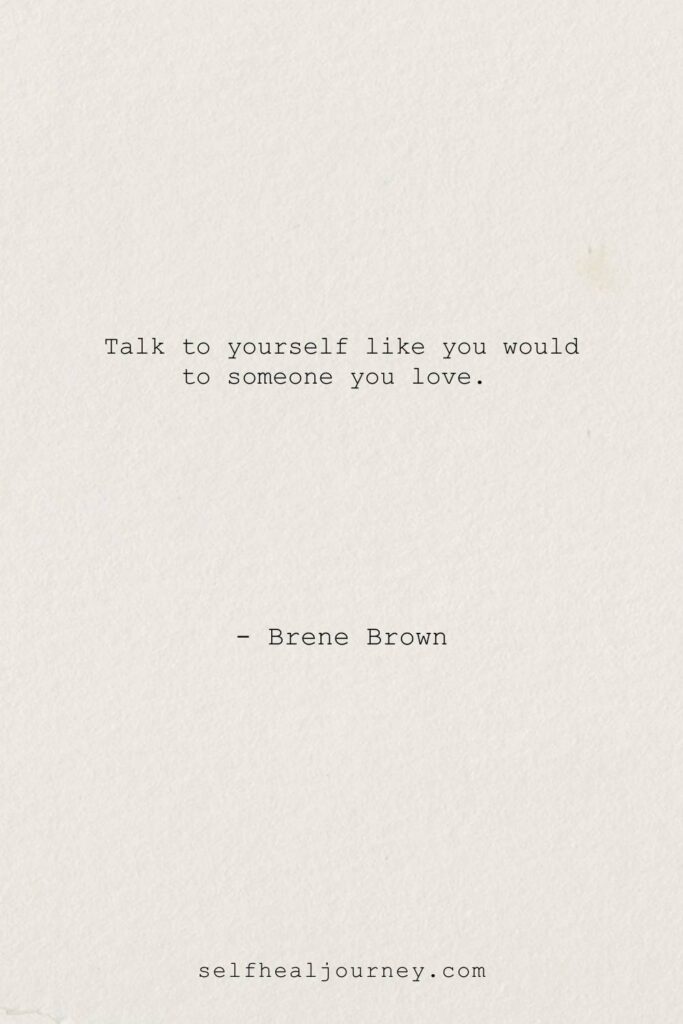
Talk to yourself like you would to someone you love.
Brene Brown
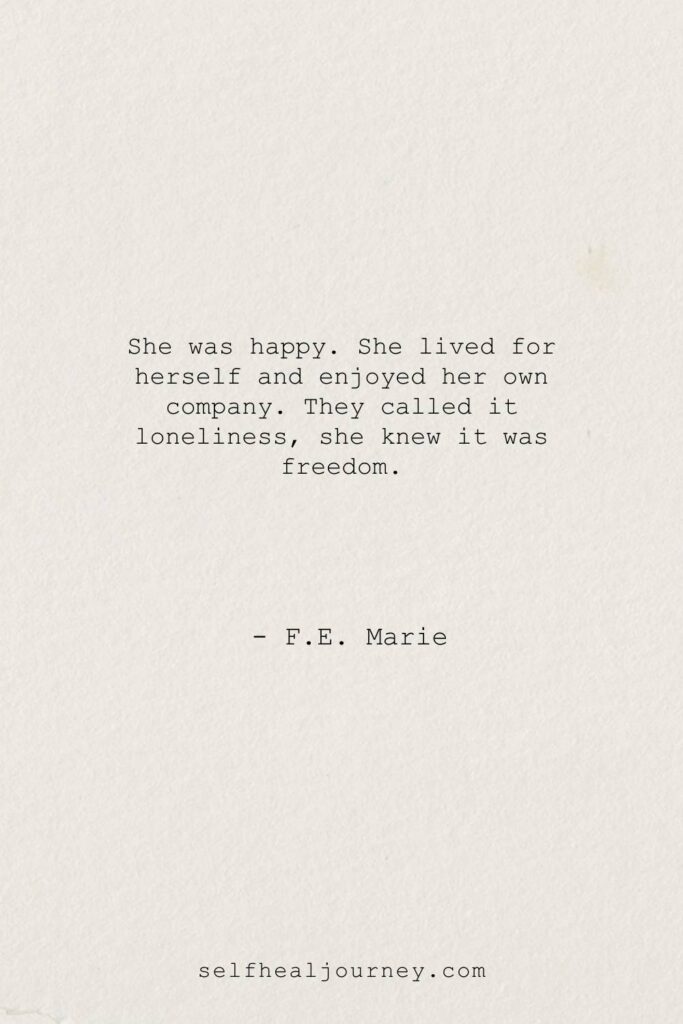
She was happy. She lived for herself and enjoyed her own company . They called it loneliness, she knew it was freedom.
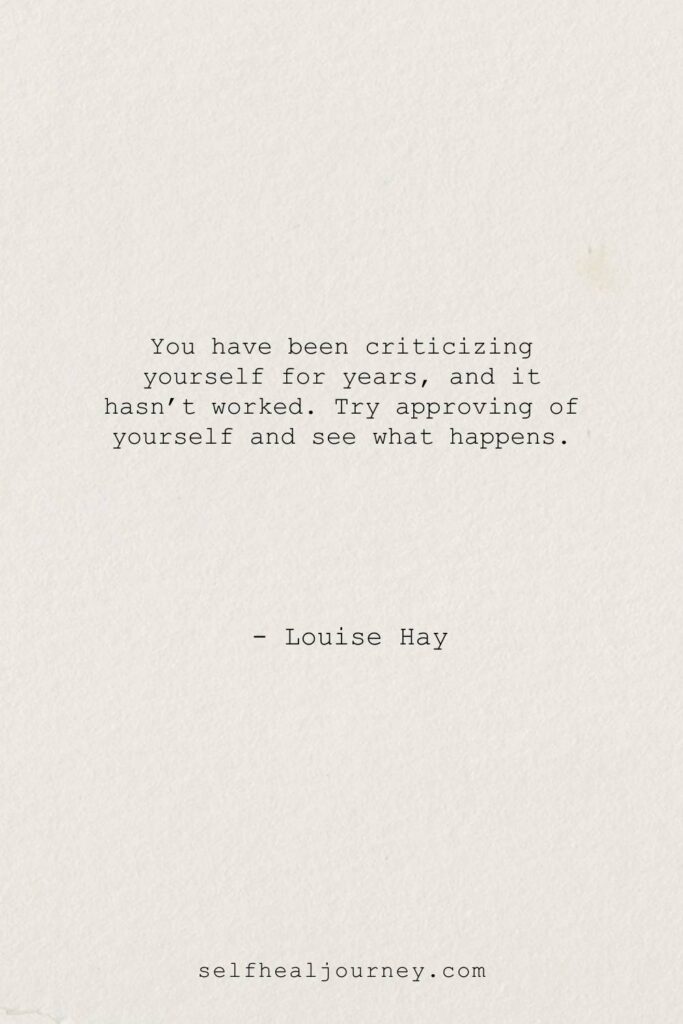
You have been criticizing yourself for years, and it hasn’t worked. Try approving of yourself and see what happens.
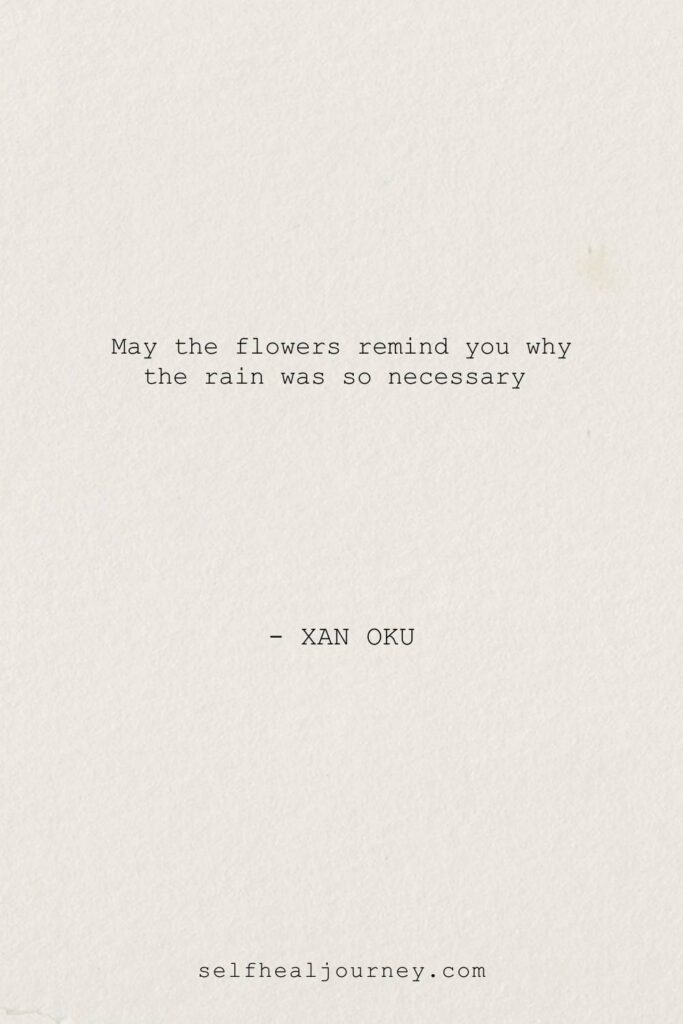
May the flowers remind you why the rain was so necessary.
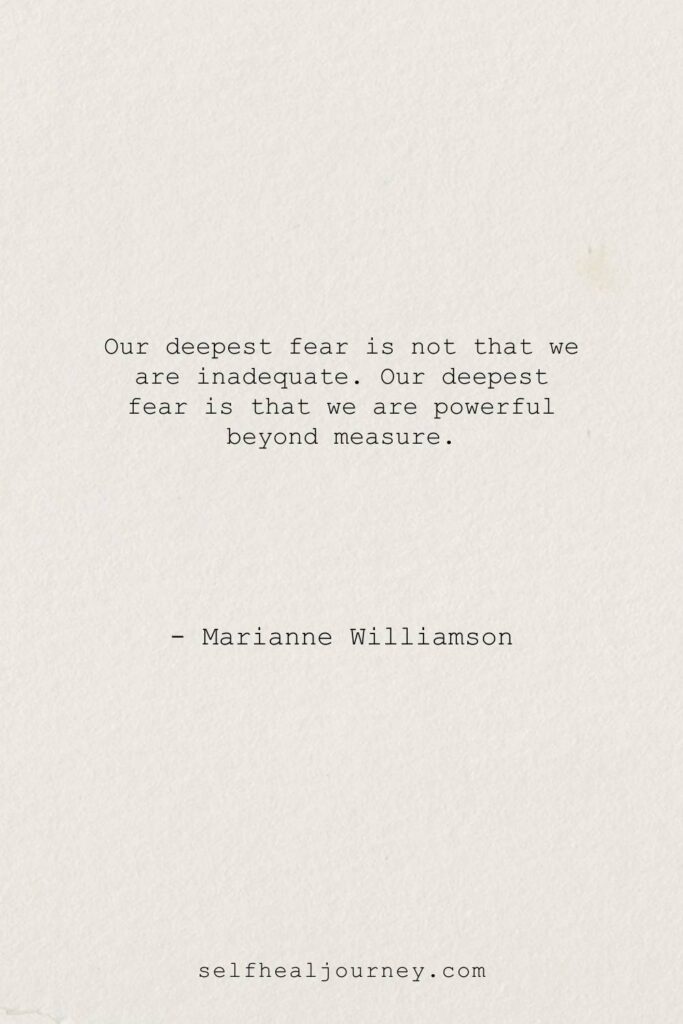
Our deepest fear is not that we are inadequate. Our deepest fear is that we are powerful beyond measure.
Marianne Williamson
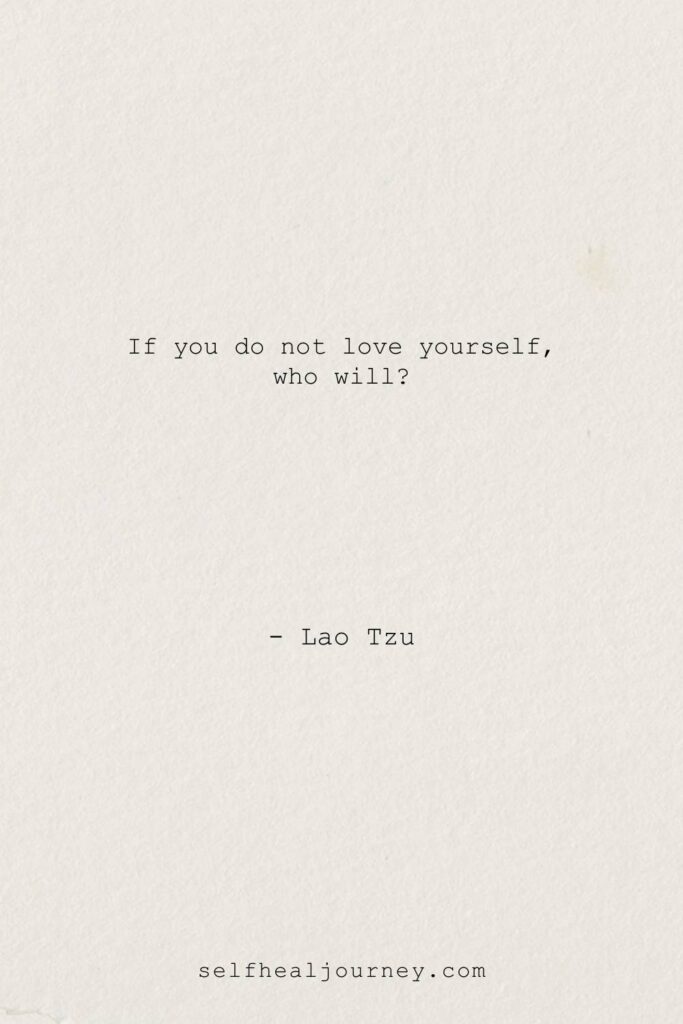
If you do not love yourself, who will?
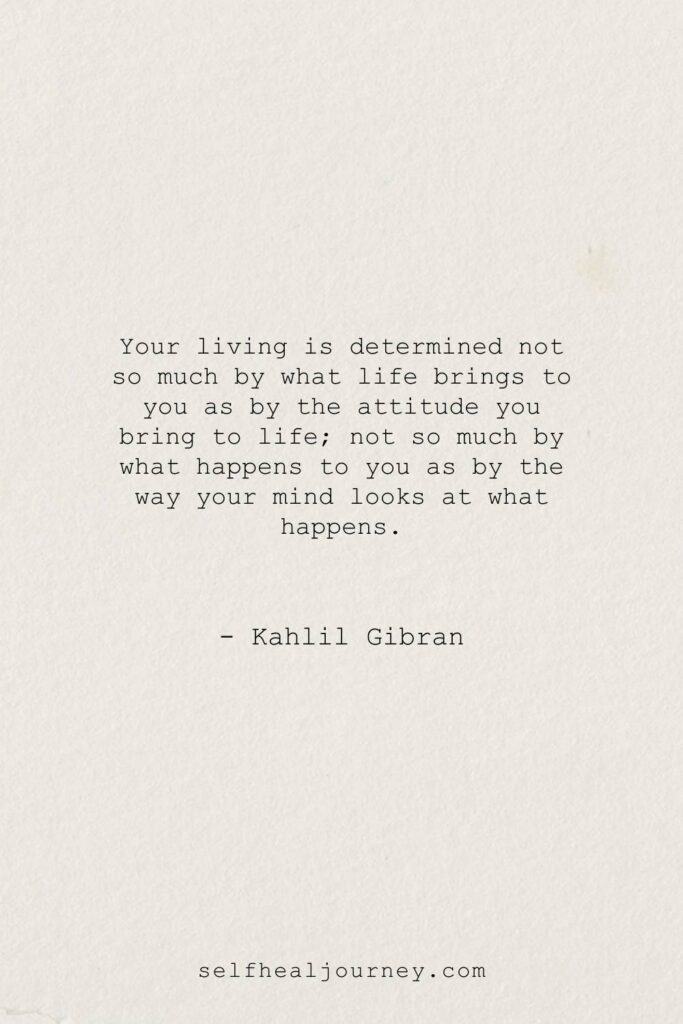
Your living is determined not so much by what life brings to you as by the attitude you bring to life; not so much by what happens to you as by the way your mind looks at what happens.
Kahlil Gibran
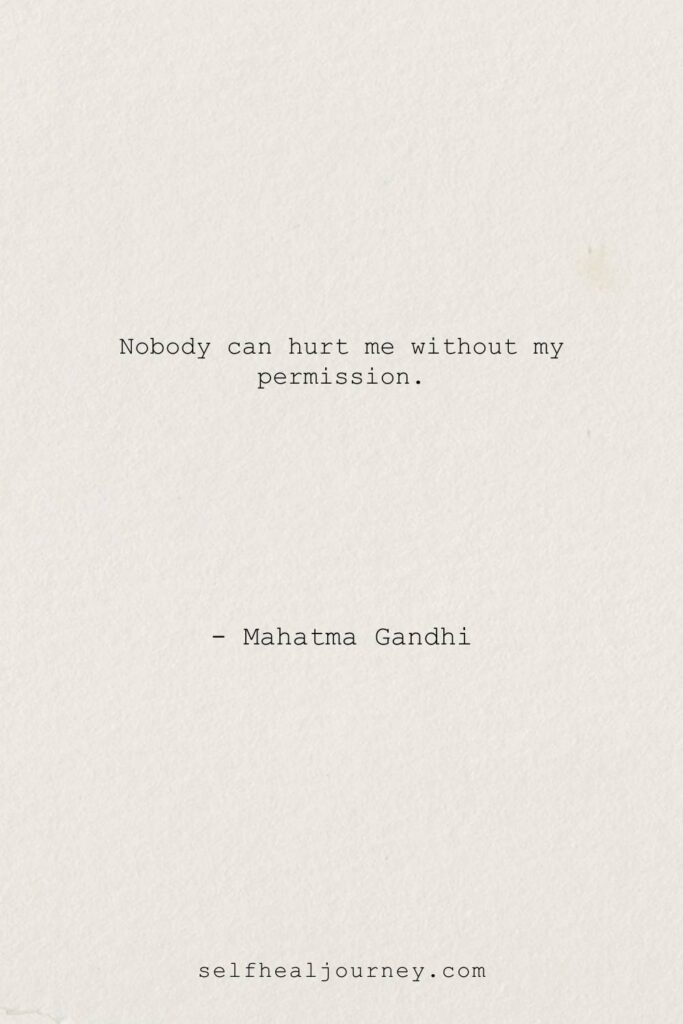
Nobody can hurt me without my permission.
Mahatma Gandhi
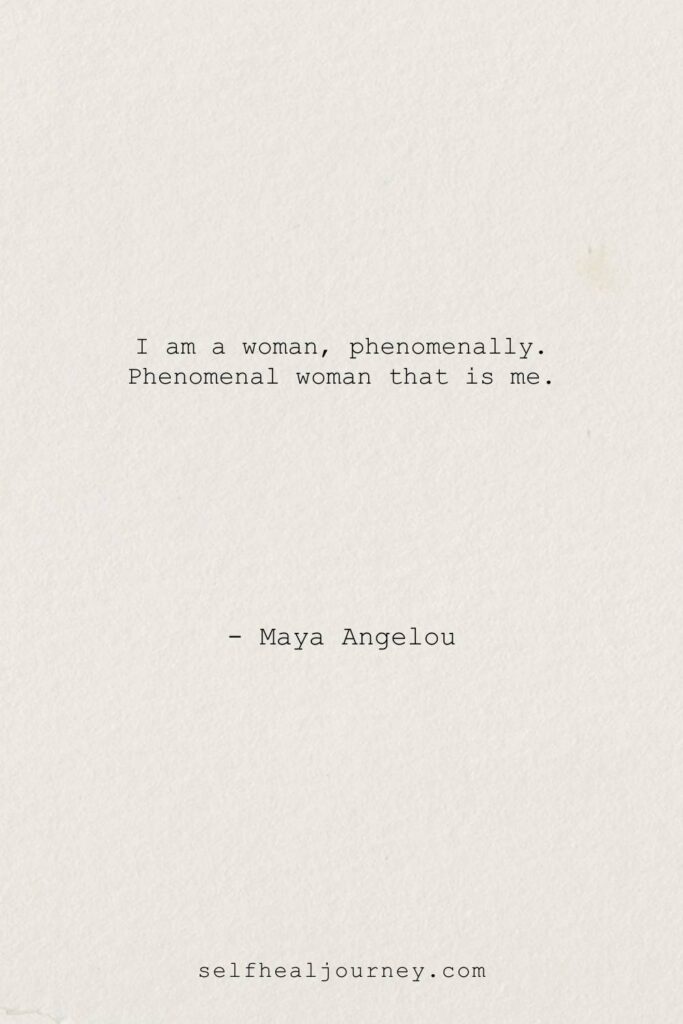
I am a woman, phenomenally. Phenomenal woman that is me.

You yourself, as much as anybody in the entire universe, deserve your love and affection.
Quotes On Self Love And Happiness
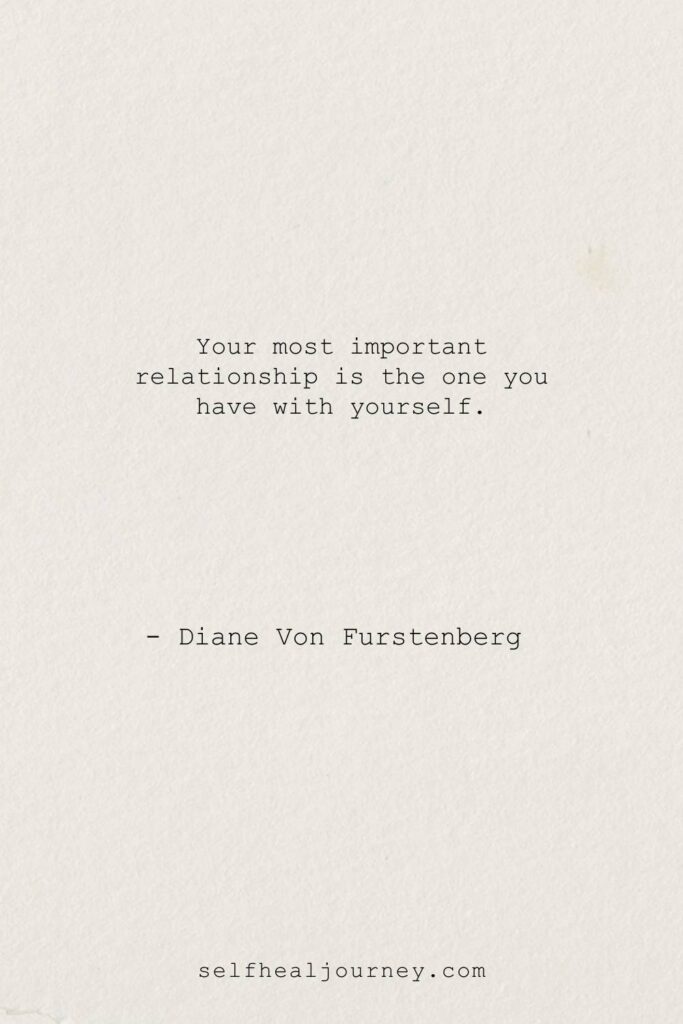
Your most important relationship is the one you have with yourself.
Diane Von Furstenberg
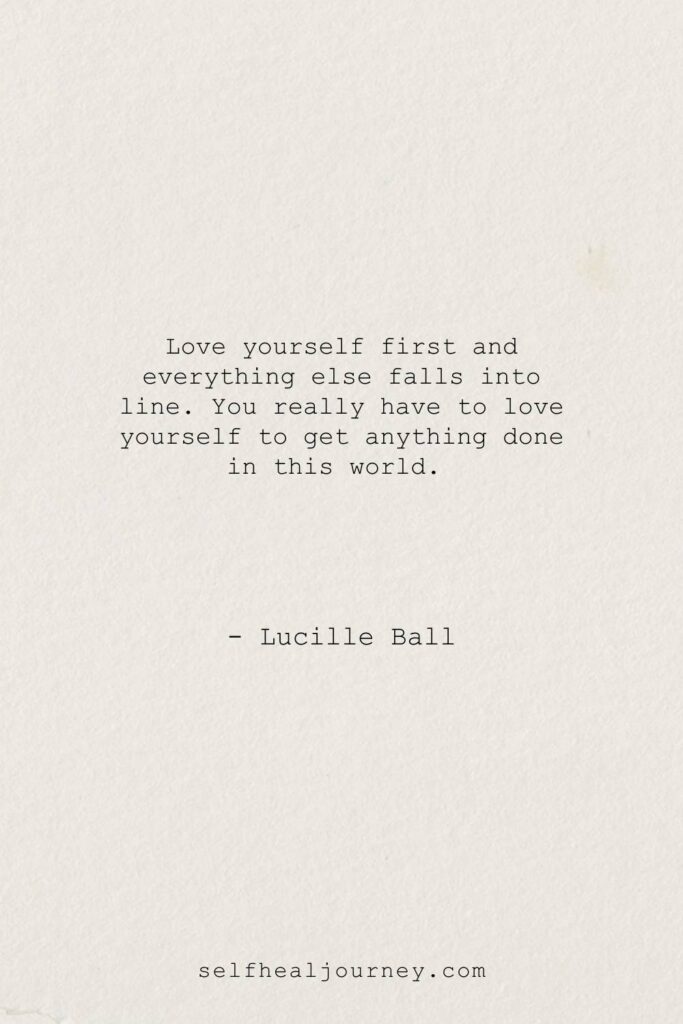
Love yourself first and everything else falls into line. You really have to love yourself to get anything done in this world.
Lucille Ball
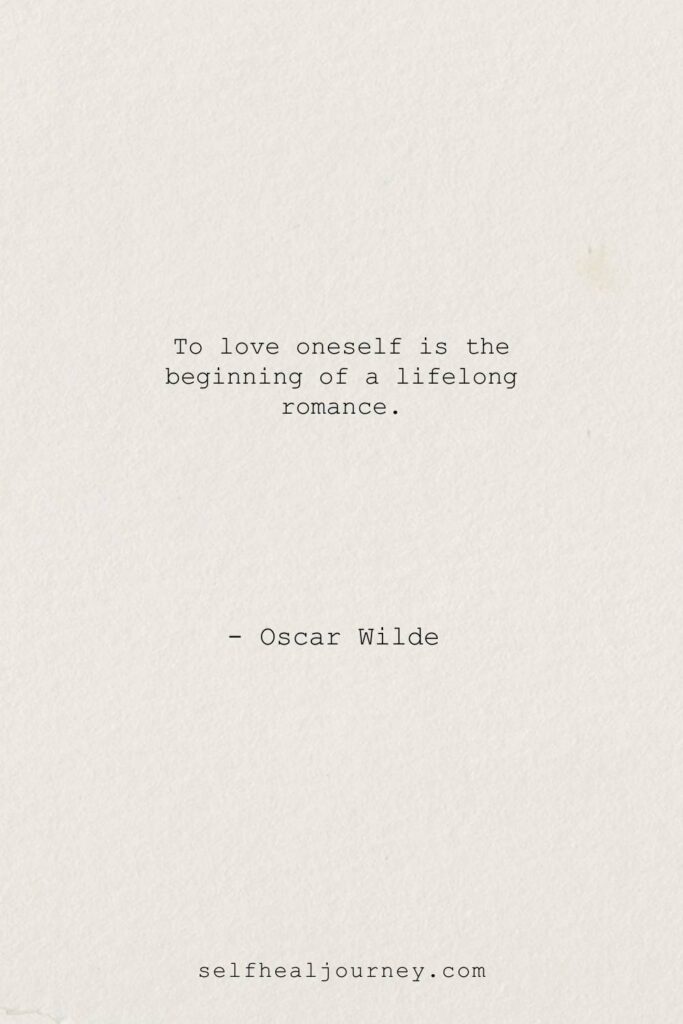
To love oneself is the beginning of a lifelong romance.
Oscar Wilde
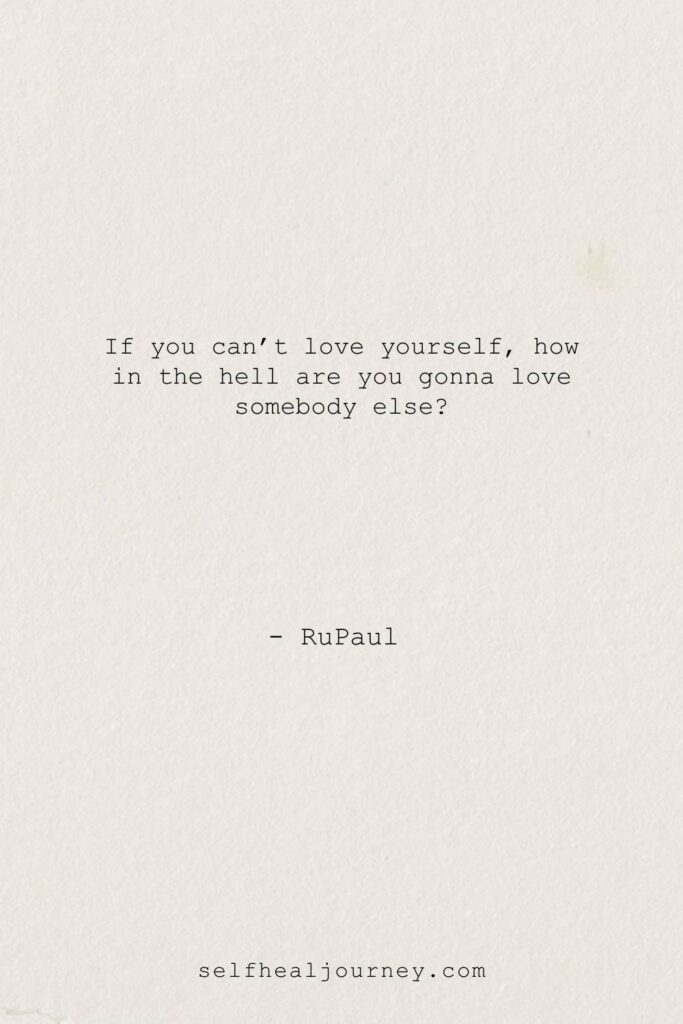
If you can’t love yourself, how in the hell are you gonna love somebody else?
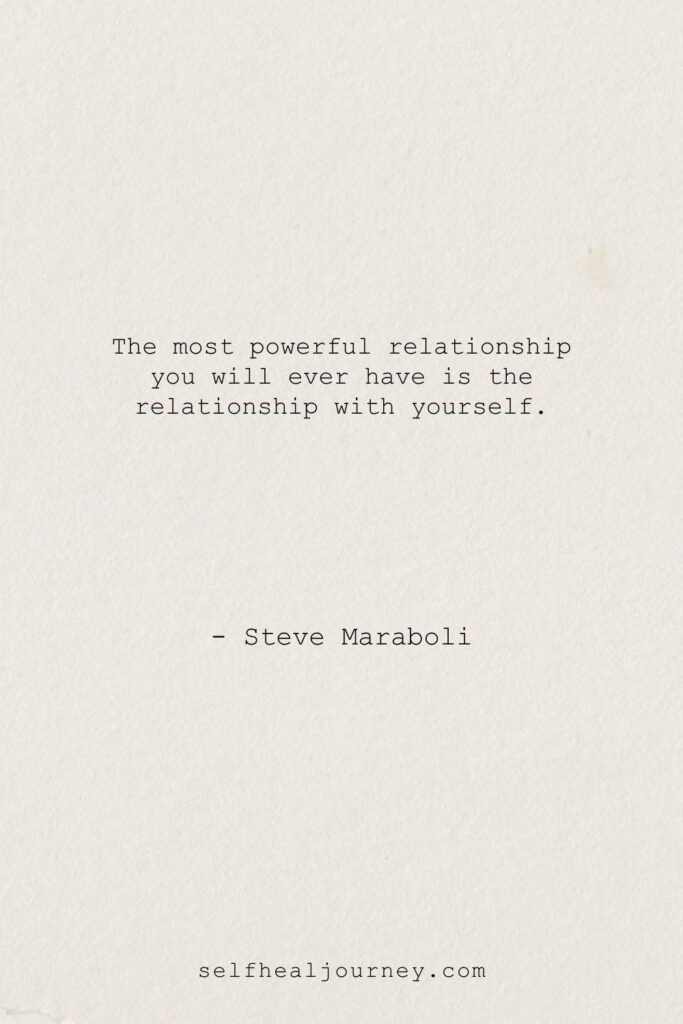
The most powerful relationship you will ever have is the relationship with yourself.
Steve Maraboli
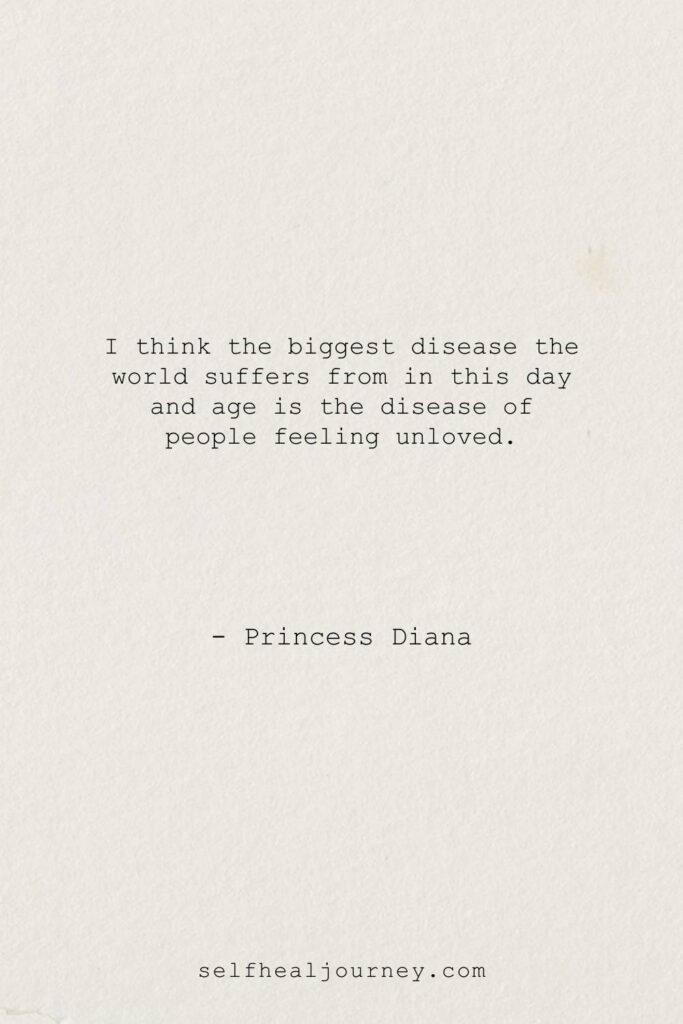
I think the biggest disease the world suffers from in this day and age is the disease of people feeling unloved.
Princess Diana
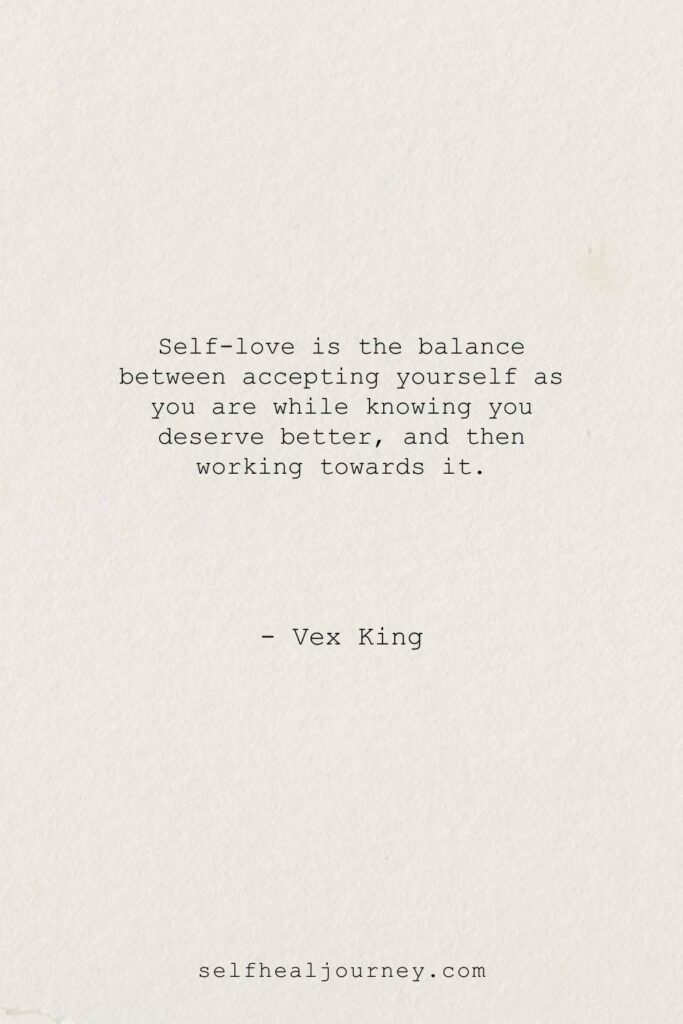
Self-love is the balance between accepting yourself as you are while knowing you deserve better, and then working towards it.
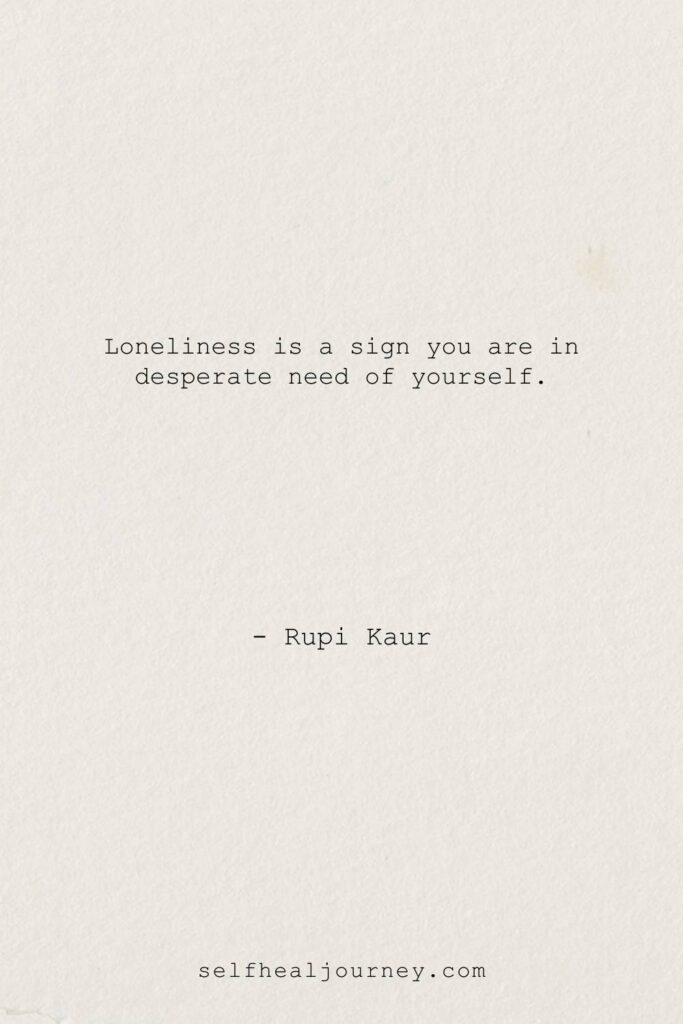
Loneliness is a sign you are in desperate need of yourself.
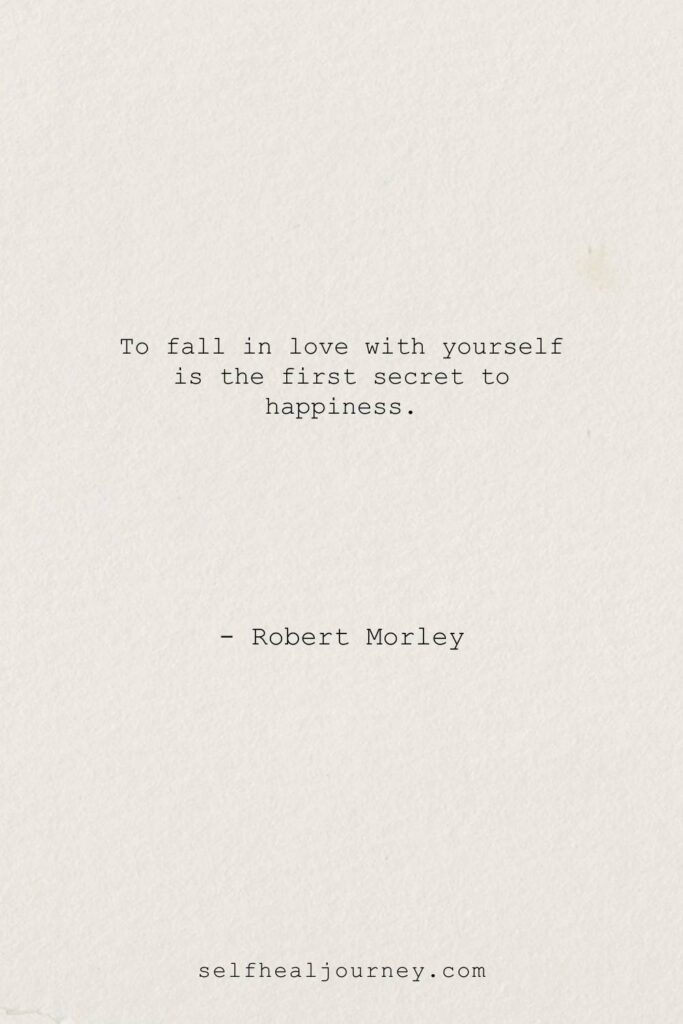
To fall in love with yourself is the first secret to happiness.
Robert Morley
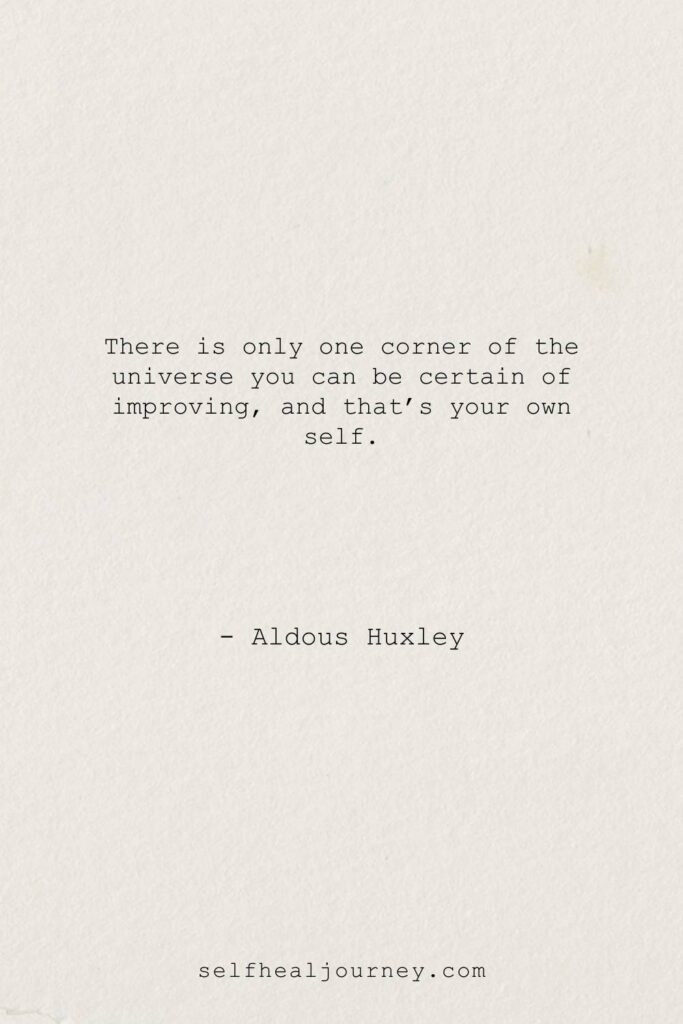
There is only one corner of the universe you can be certain of improving, and that’s your own self.
Aldous Huxley
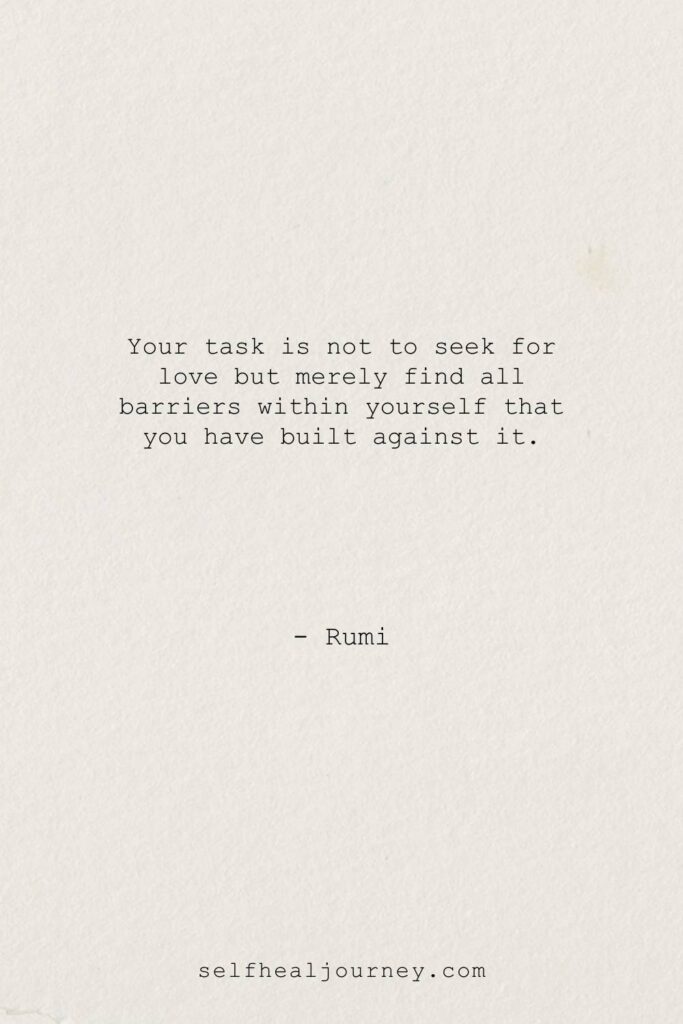
Your task is not to seek for love but merely find all barriers within yourself that you have built against it.
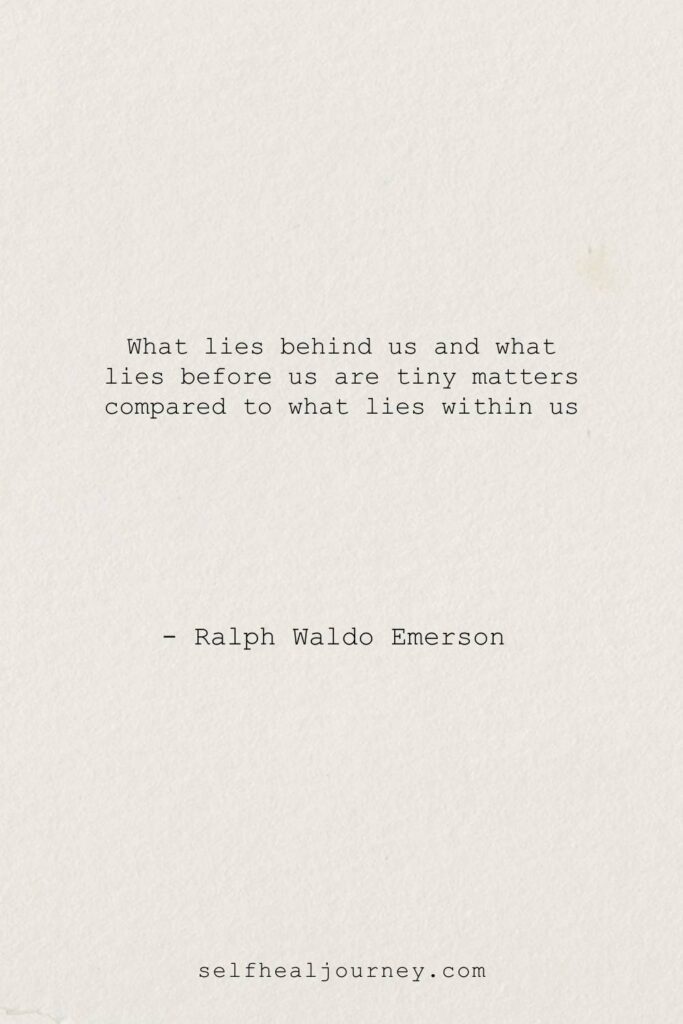
What lies behind us and what lies before us are tiny matters compared to what lies within us
Ralph Waldo Emerson
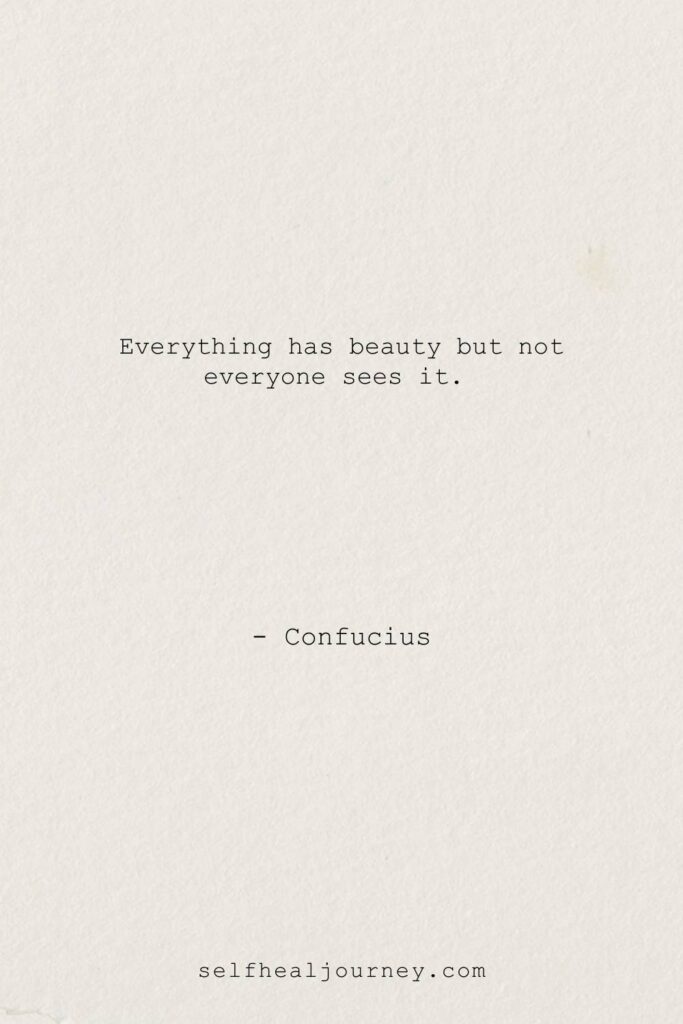
Everything has beauty but not everyone sees it.
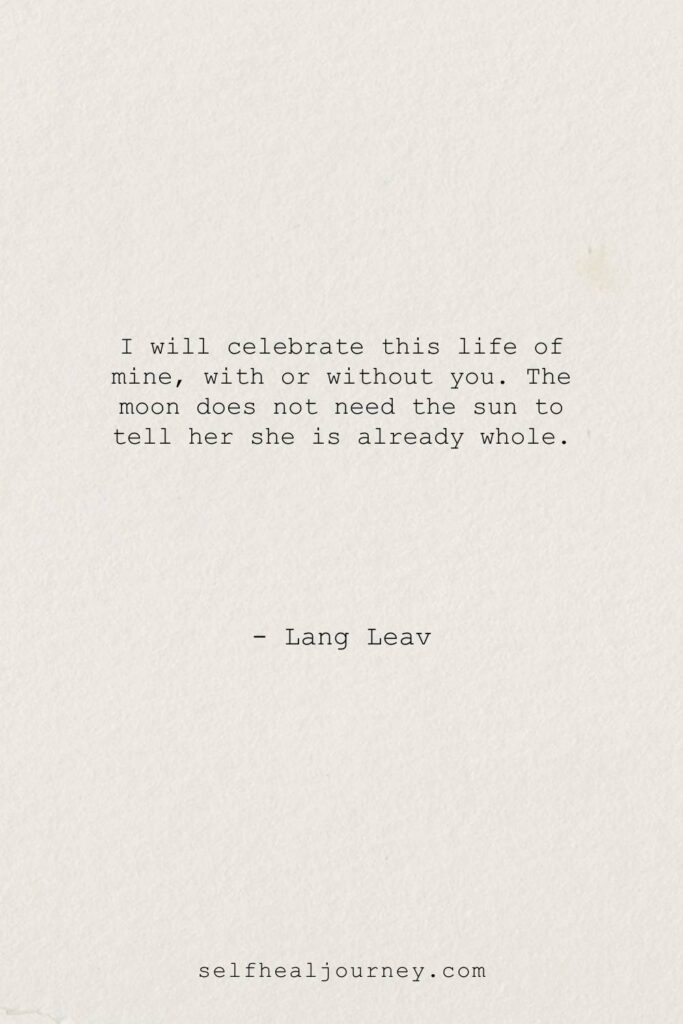
I will celebrate this life of mine, with or without you. The moon does not need the sun to tell her she is already whole.
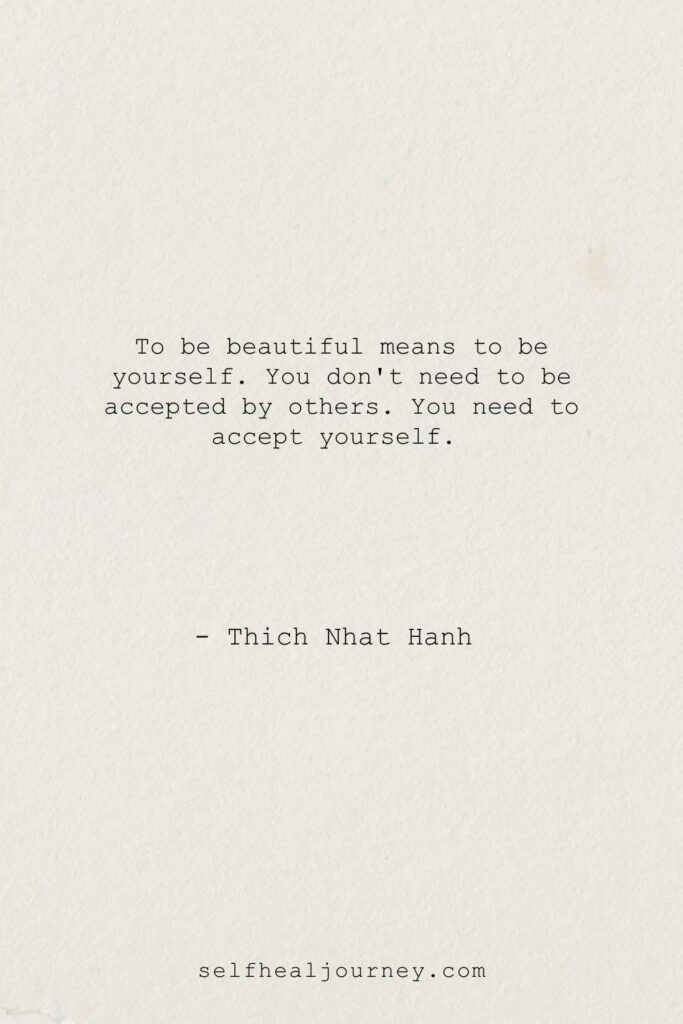
To be beautiful means to be yourself. You don’t need to be accepted by others. You need to accept yourself.
Thich Nhat Hanh
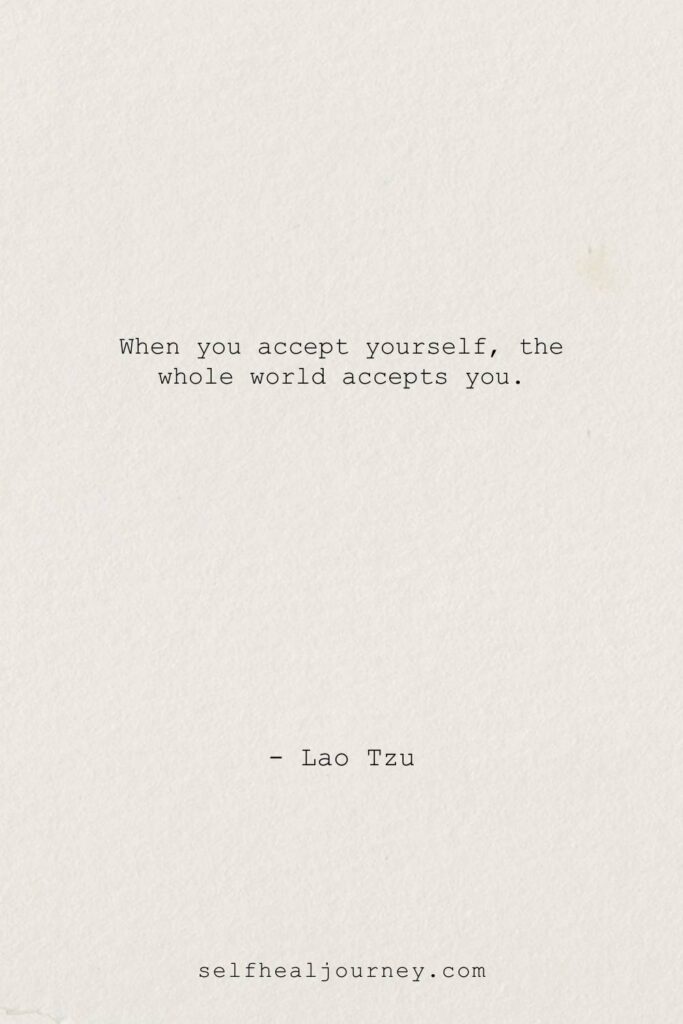
When you accept yourself, the whole world accepts you.
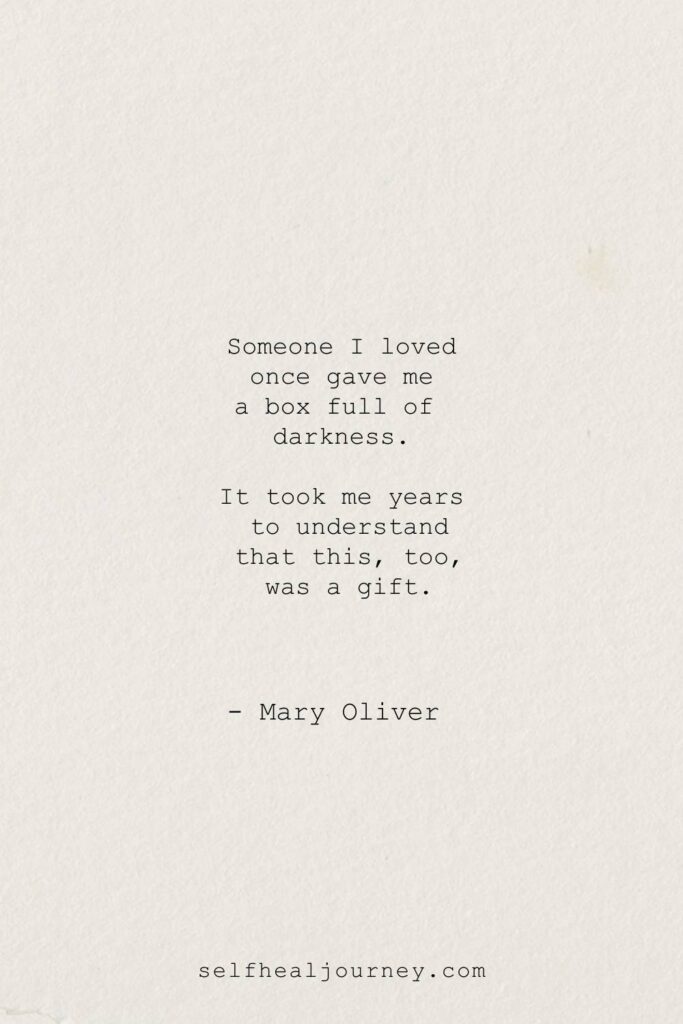
Someone I loved once gave me
a box full of darkness.
It took me years to understand
that this, too, was a gift.
Mary Oliver
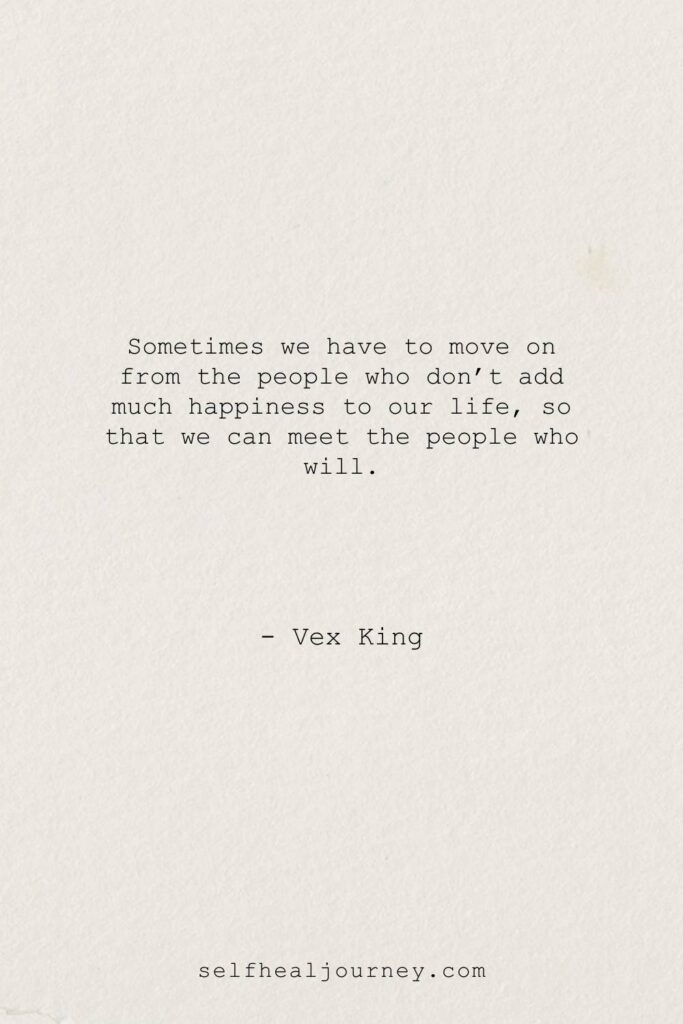
Sometimes we have to move on from the people who don’t add much happiness to our life, so that we can meet the people who will.
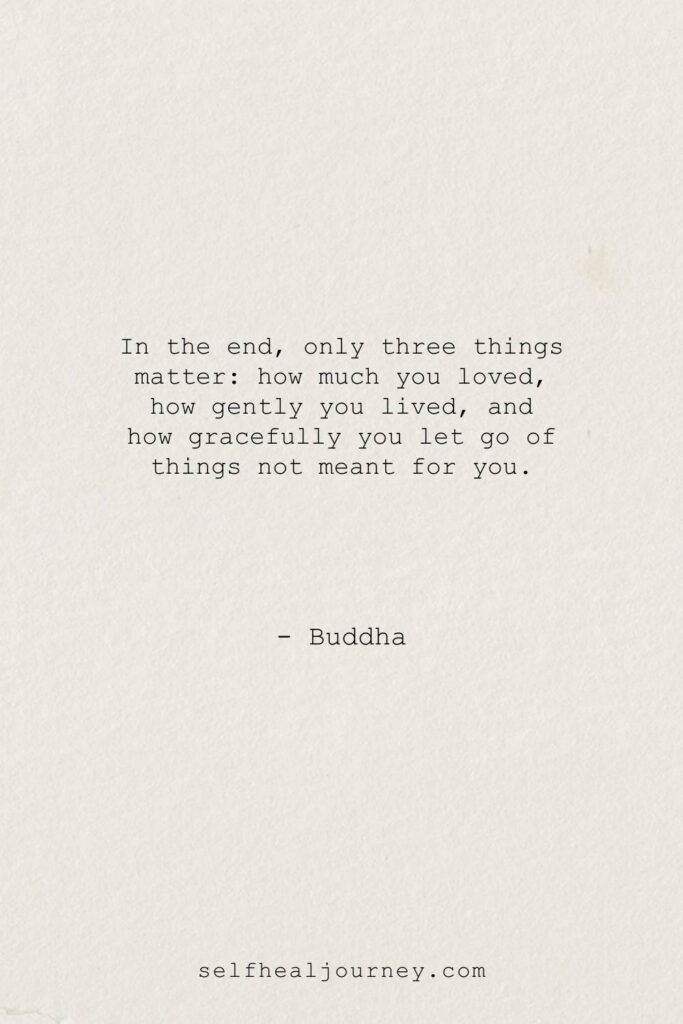
In the end, only three things matter: how much you loved, how gently you lived, and how gracefully you let go of things not meant for you.
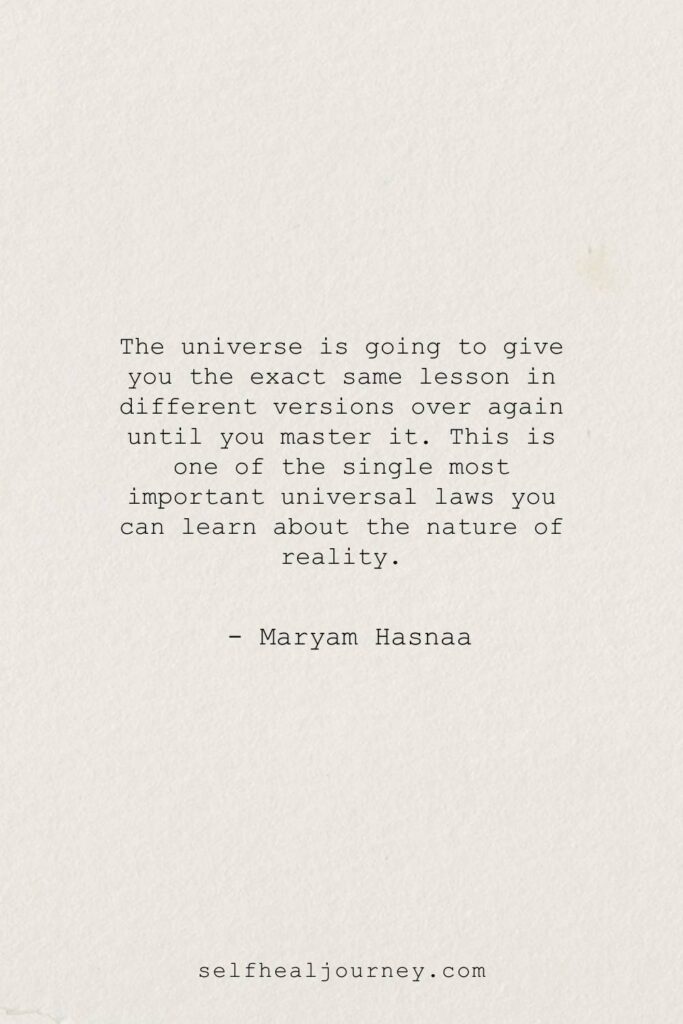
The universe is going to give you the exact same lesson in different versions over again until you master it. This is one of the single most important universal laws you can learn about the nature of reality.
Maryam Hasnaa
Short Self Love Quotes
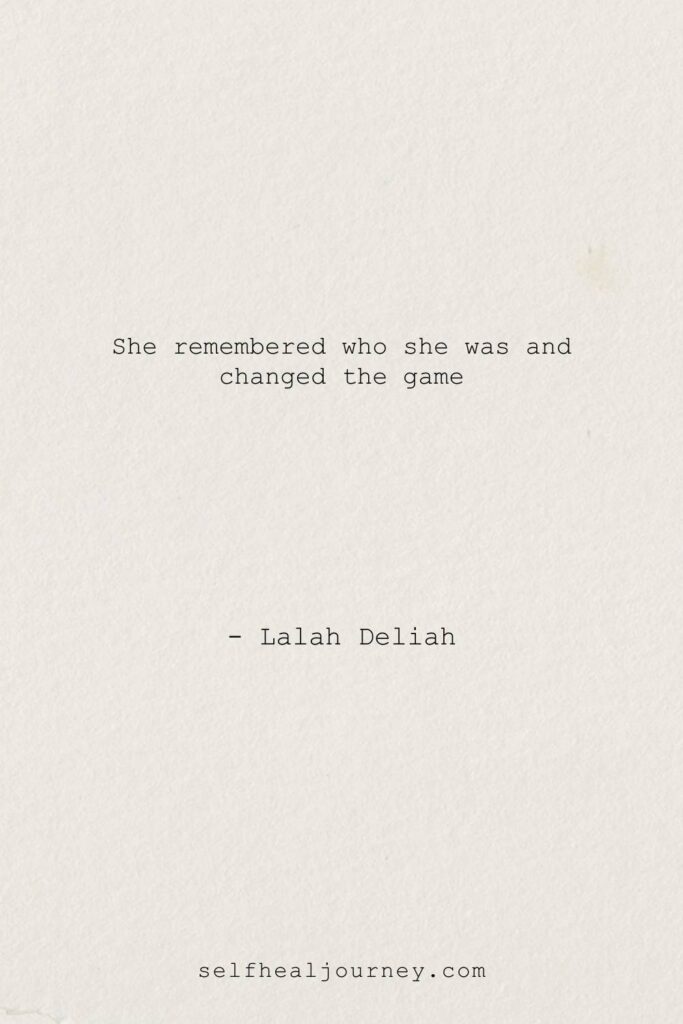
She remembered who she was and changed the game
Lalah Deliah
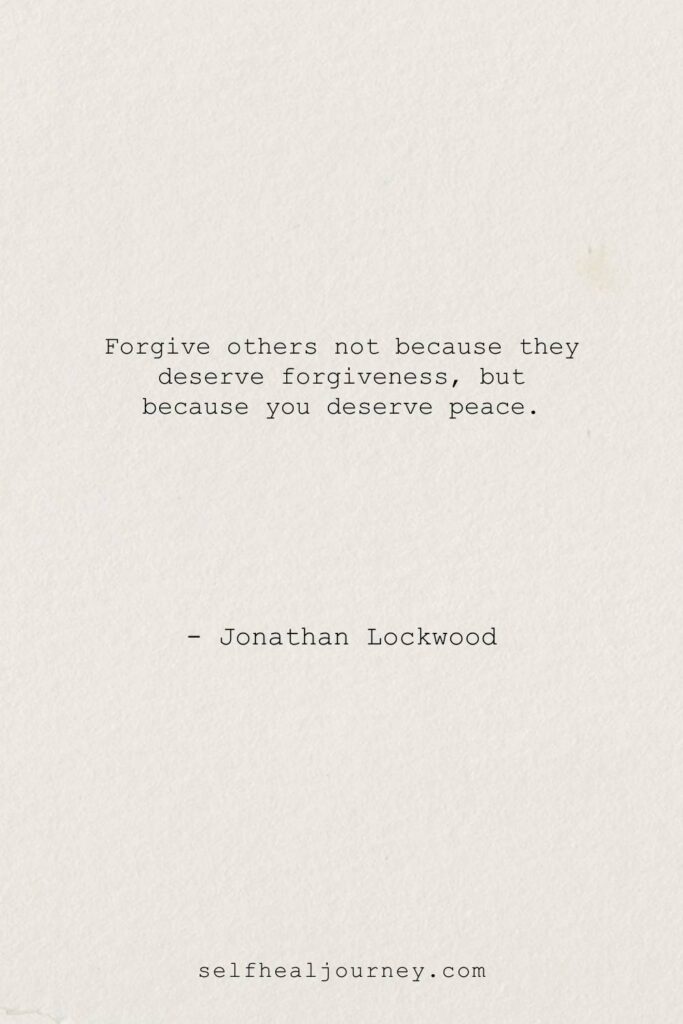
Forgive others not because they deserve forgiveness, but because you deserve peace.
Jonathan Lockwood
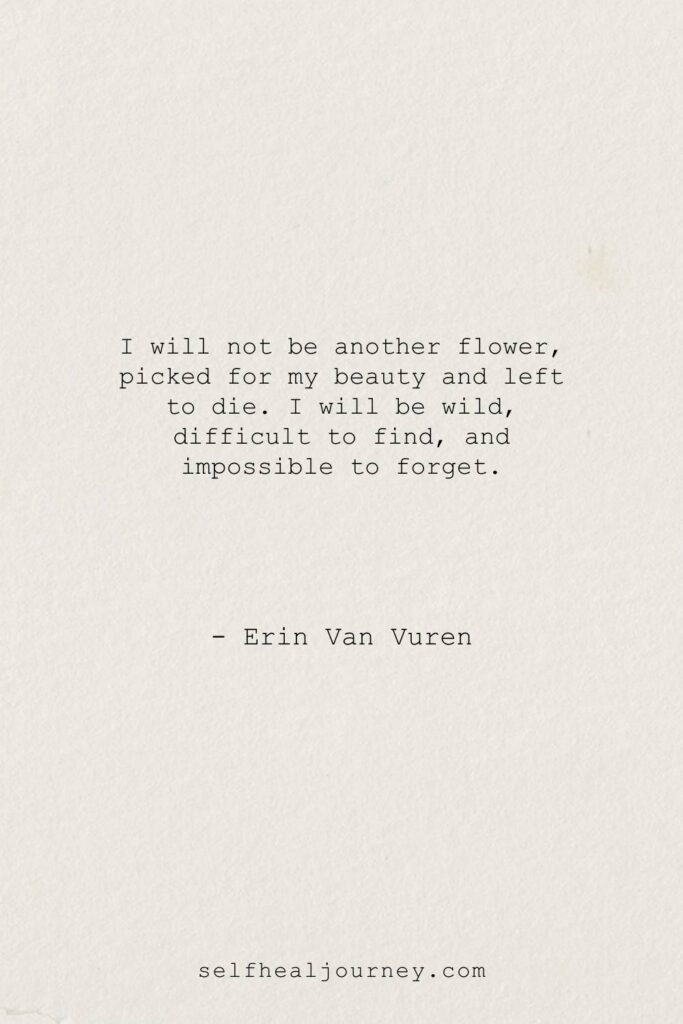
I will not be another flower, picked for my beauty and left to die. I will be wild, difficult to find, and impossible to forget.
Erin Van Vuren
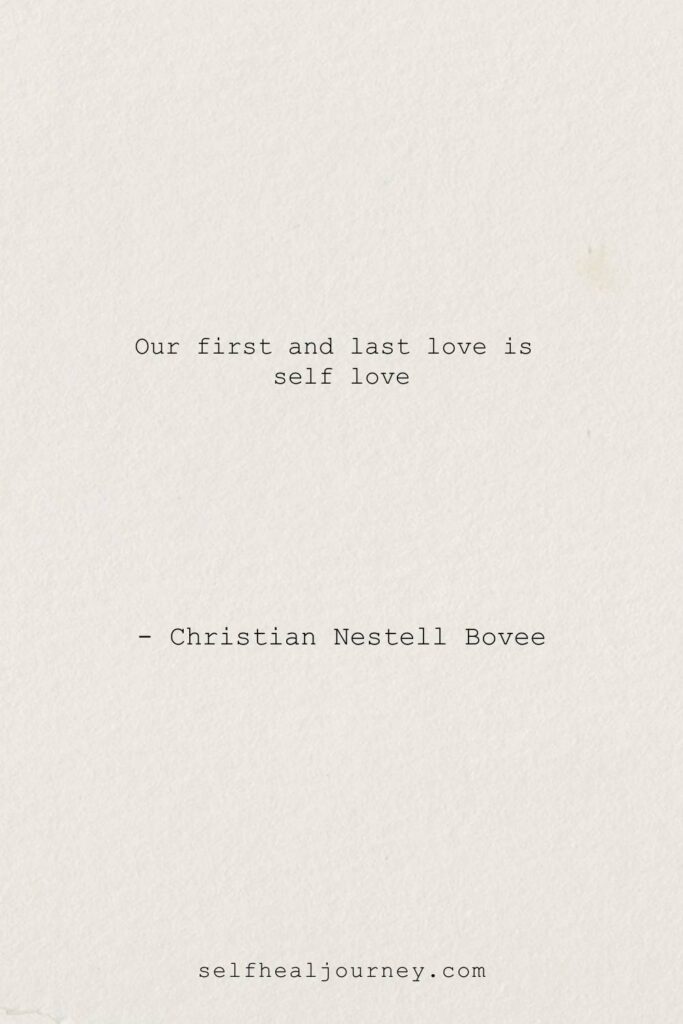
Our first and last love is self love
Christian Nestell Bovee
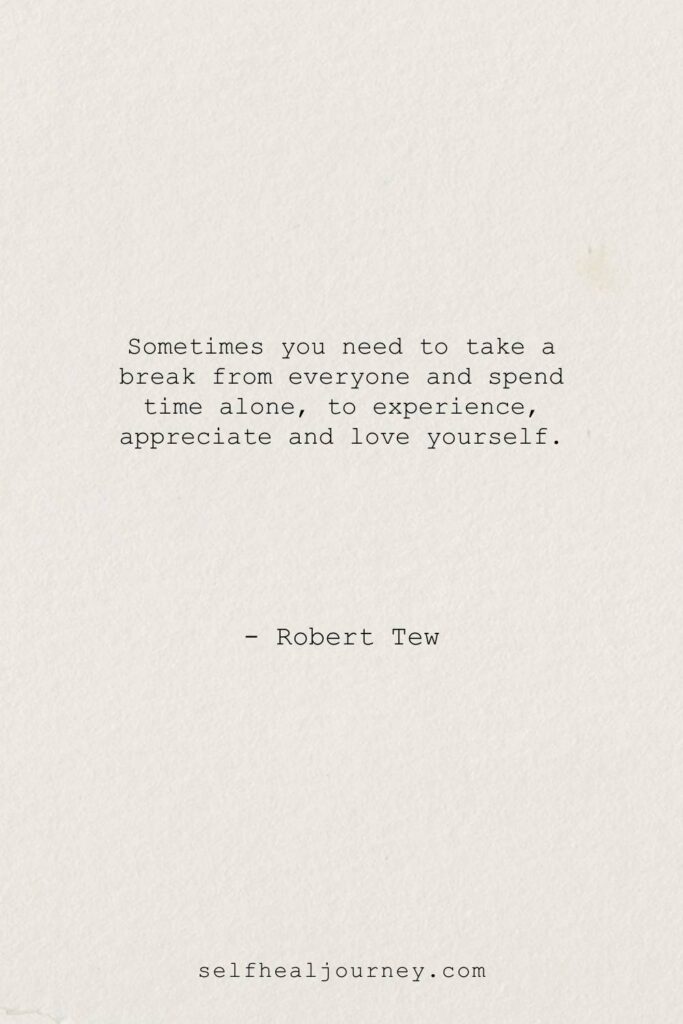
Sometimes you need to take a break from everyone and spend time alone, to experience, appreciate and love yourself.
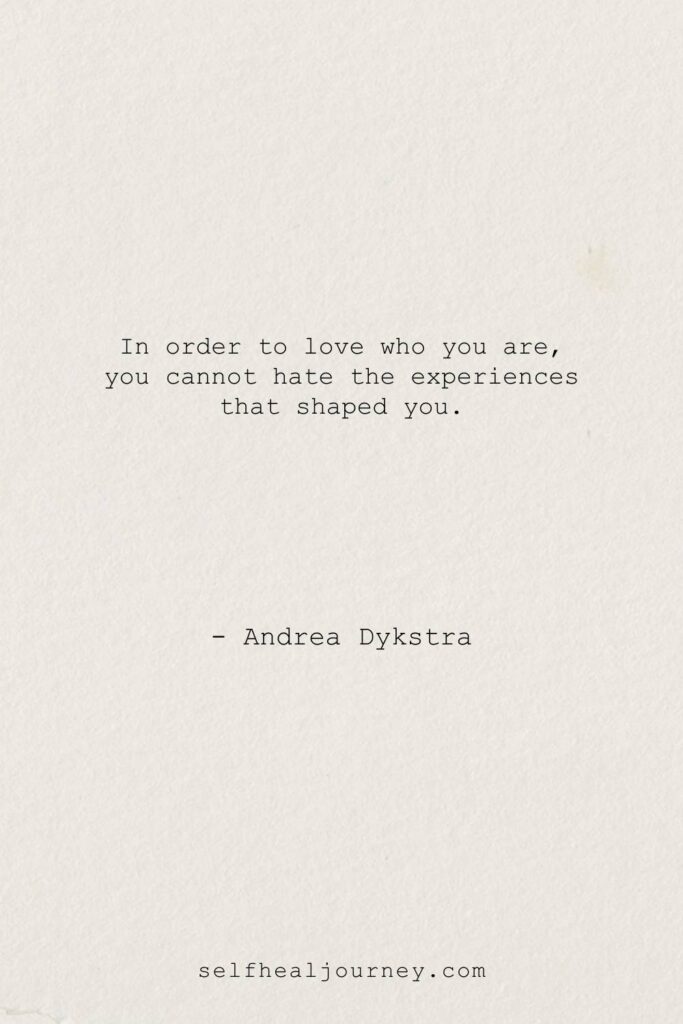
In order to love who you are, you cannot hate the experiences that shaped you.
Andrea Dykstra
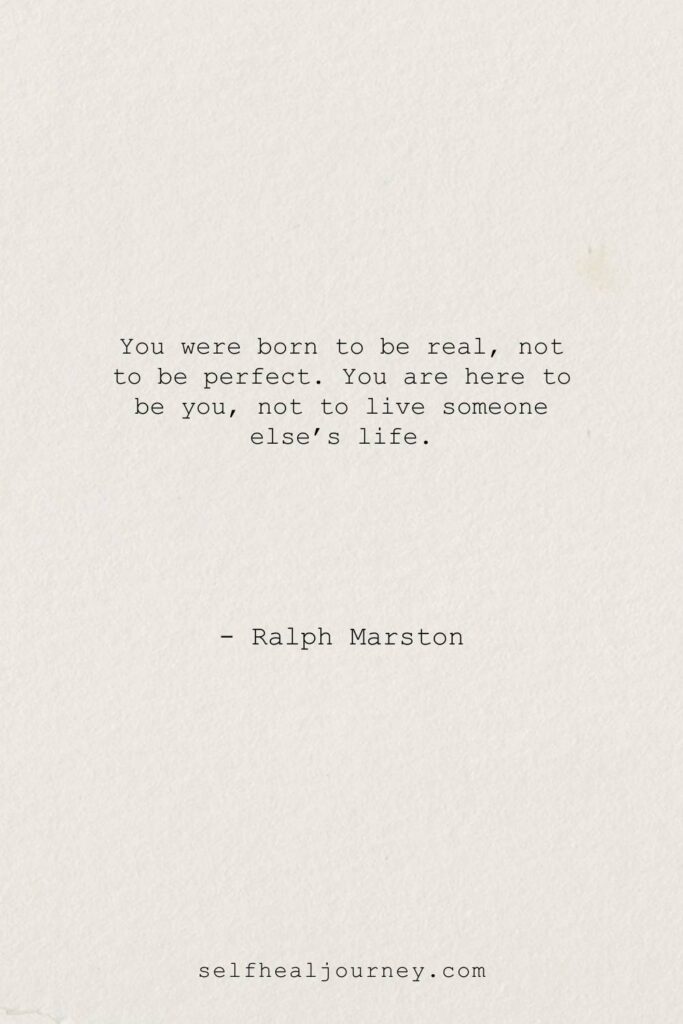
You were born to be real, not to be perfect. You are here to be you, not to live someone else’s life.
Ralph Marston
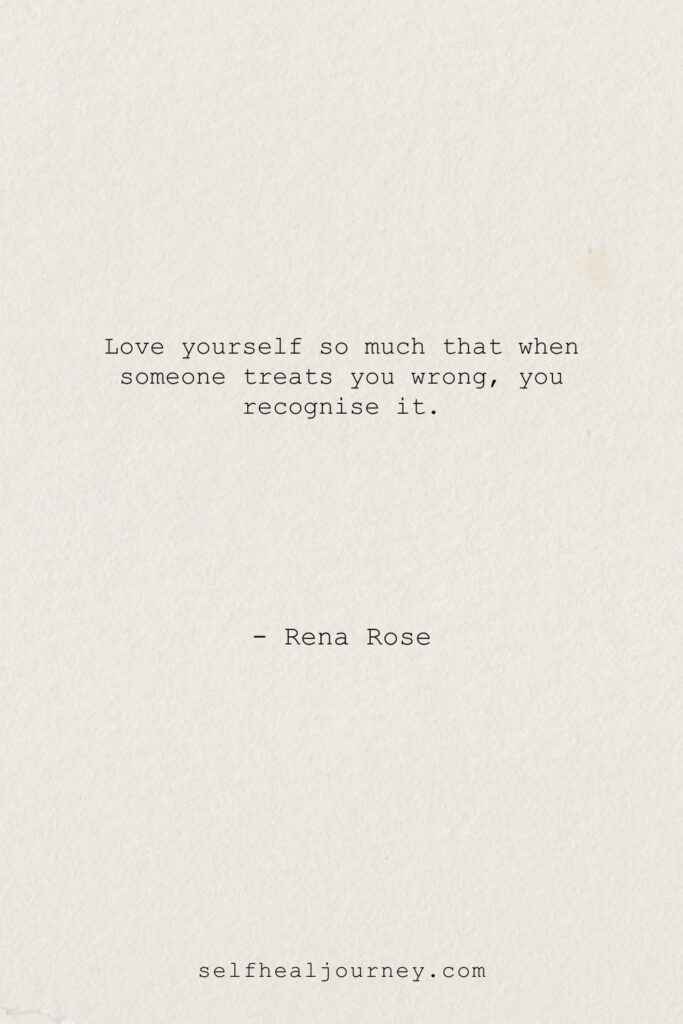
Love yourself so much that when someone treats you wrong, you recognise it.
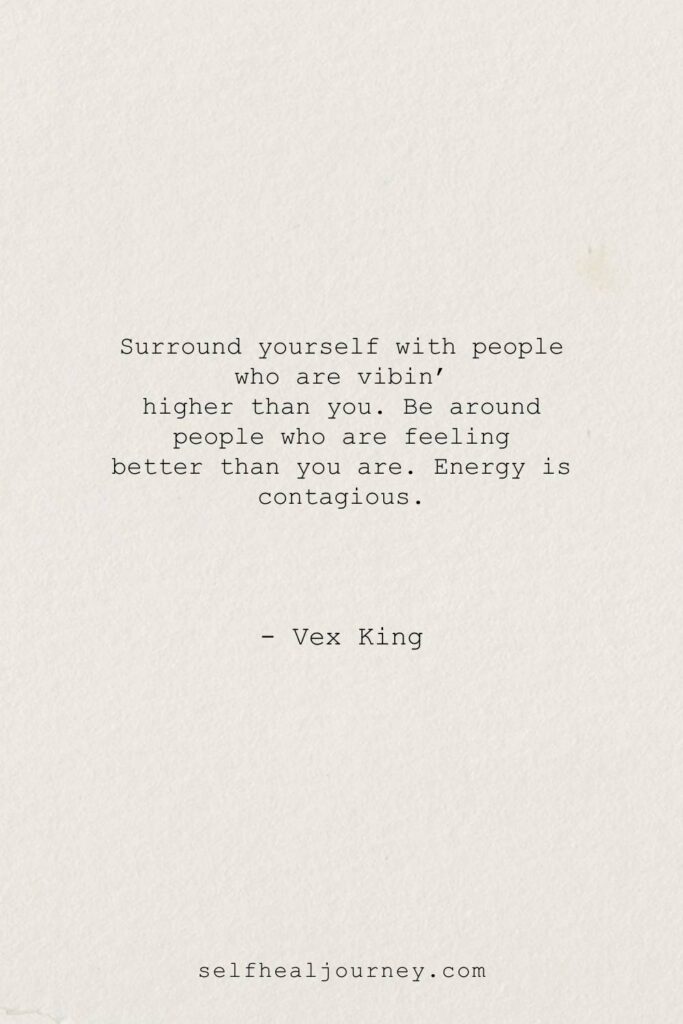
Surround yourself with people who are vibin’ higher than you. Be around people who are feeling better than you are. Energy is contagious.
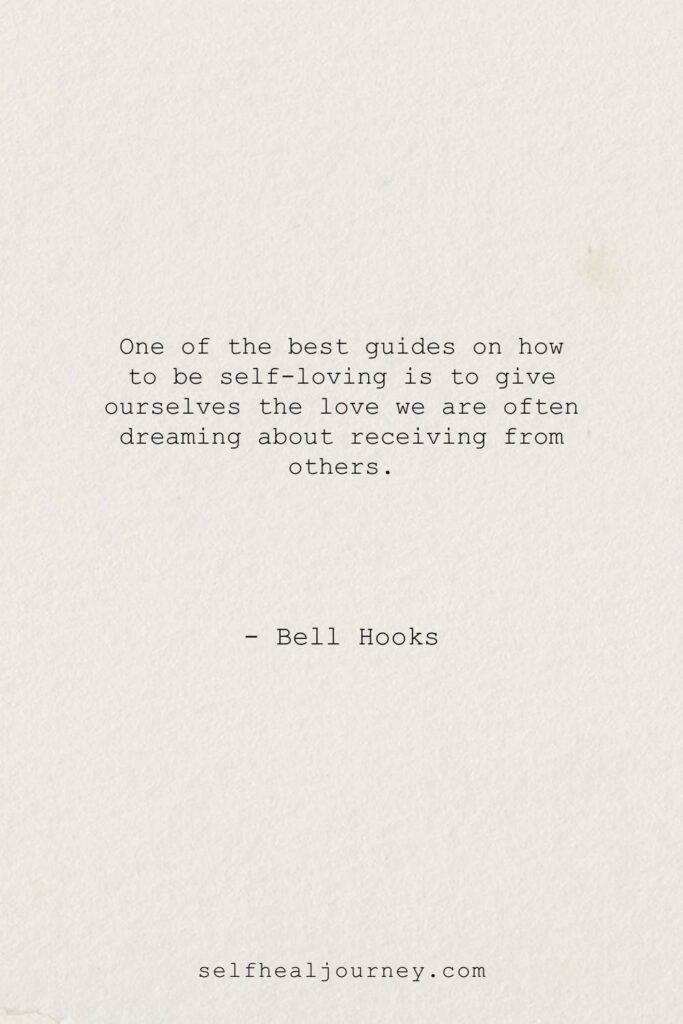
One of the best guides on how to be self-loving is to give ourselves the love we are often dreaming about receiving from others.
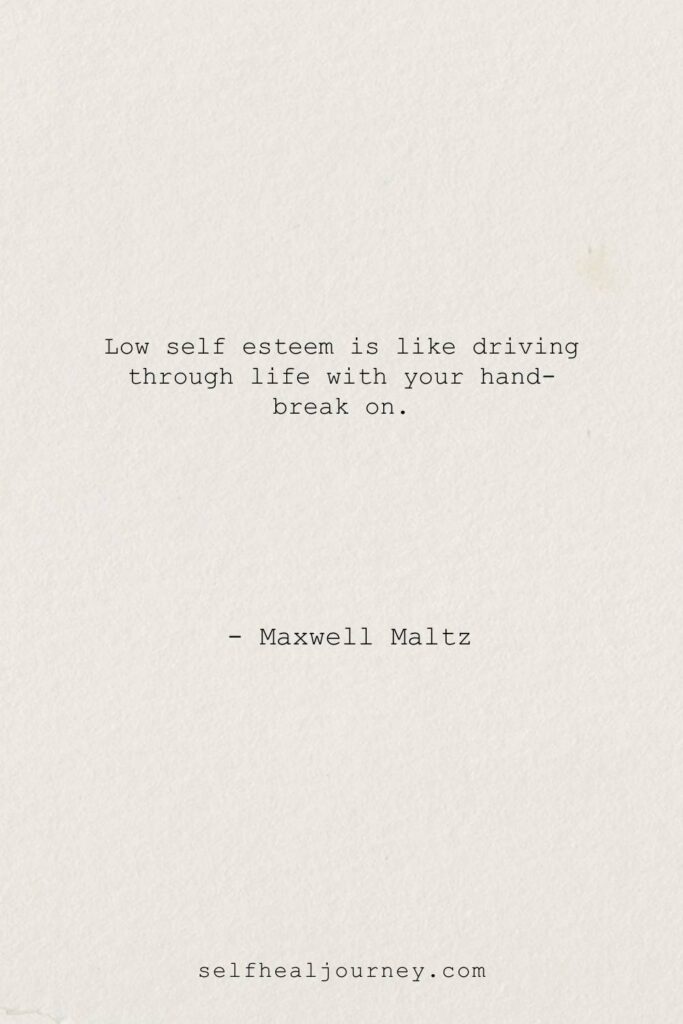
Low self esteem is like driving through life with your hand-break on.
Maxwell Maltz
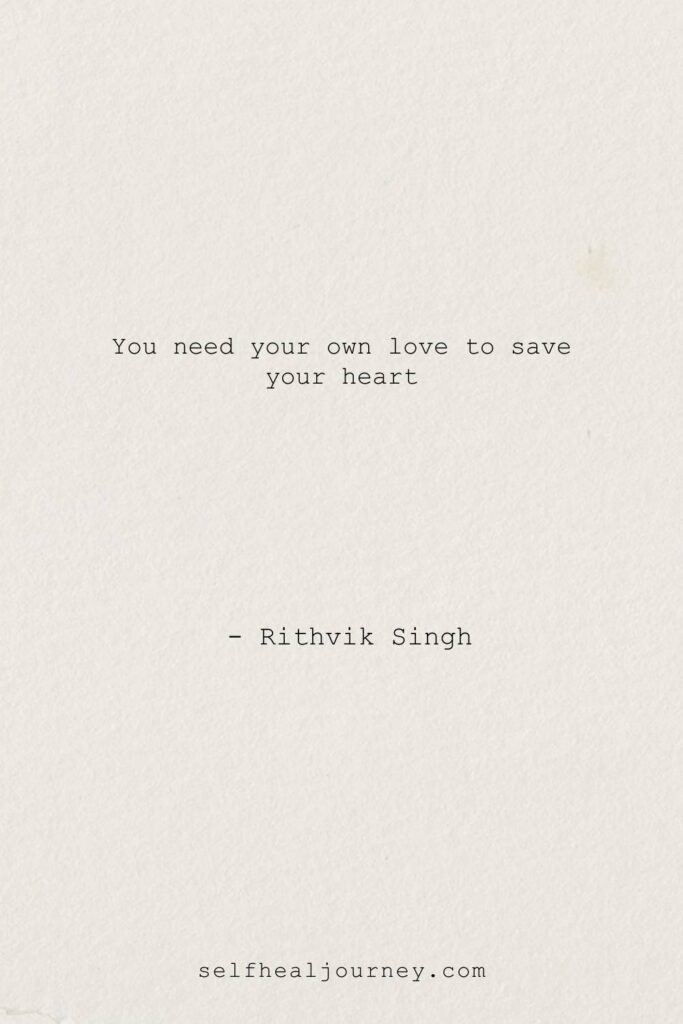
You need your own love to save your heart.
Rithvik Singh
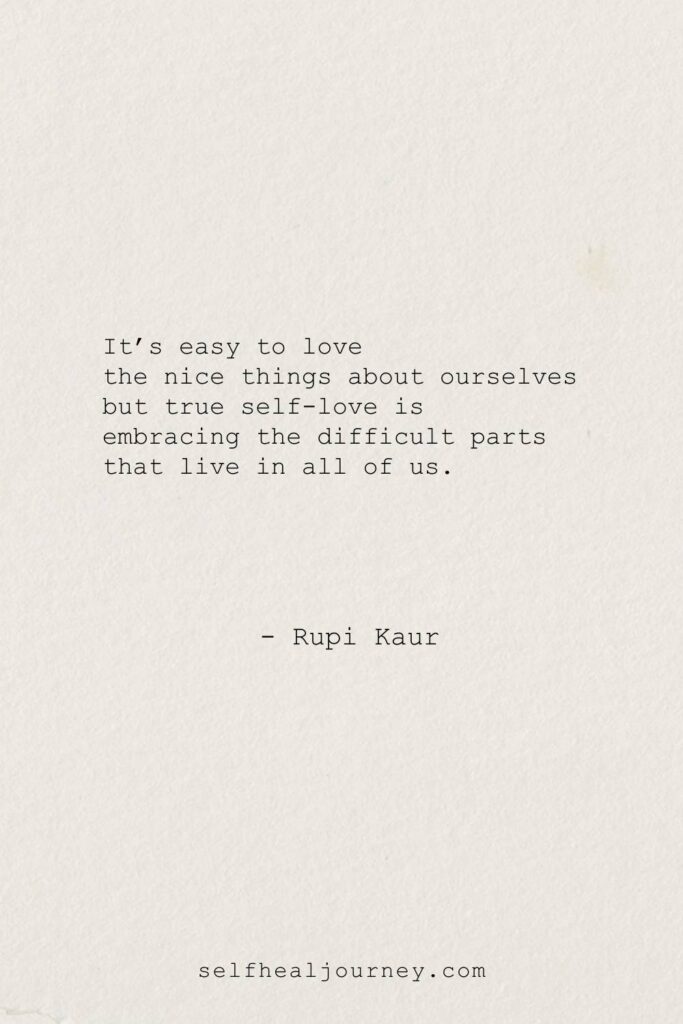
It’s easy to love
the nice things about ourselves
but true self-love is
embracing the difficult parts
that live in all of us.
– Rupi Kaur
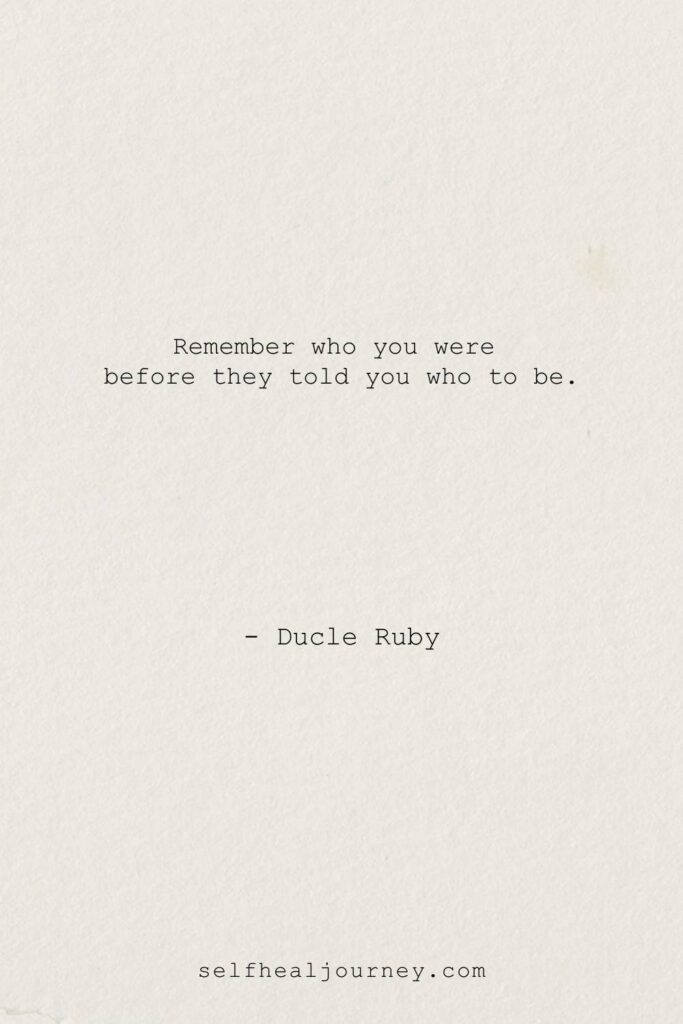
Remember who you were
before they told you who to be.
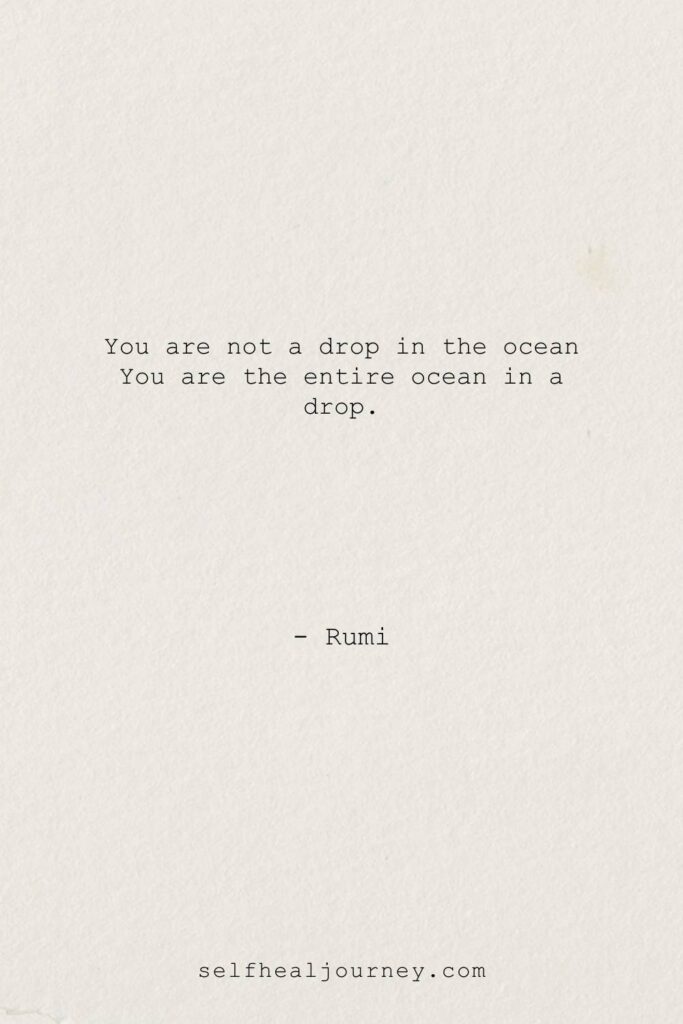
You are not a drop in the ocean
You are the entire ocean in a drop.
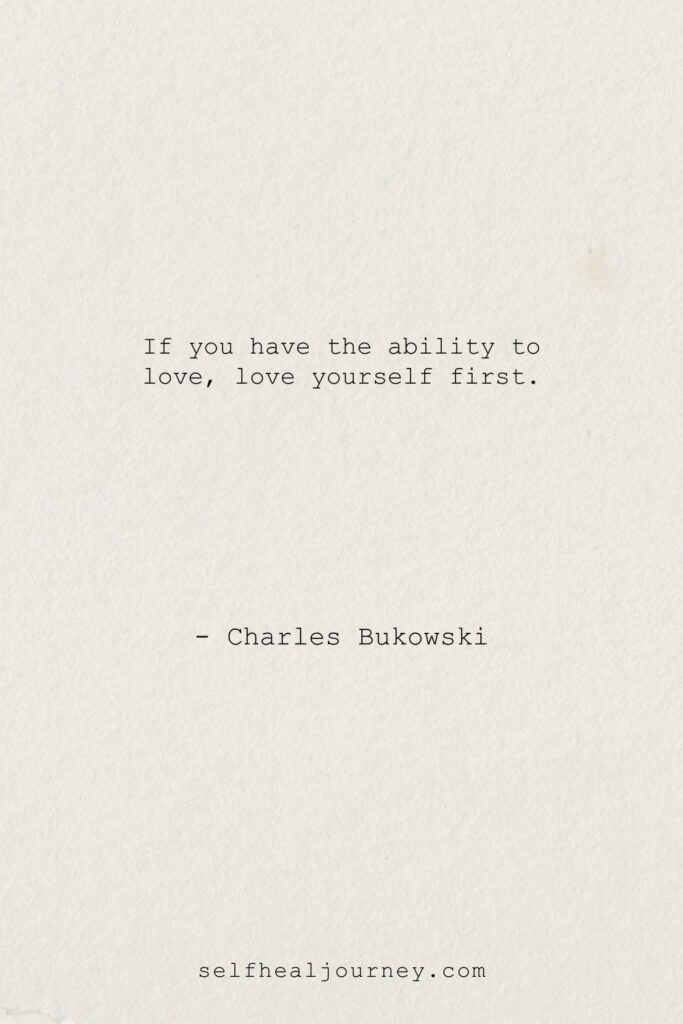
If you have the ability to love, love yourself first.
Charles Bukowski
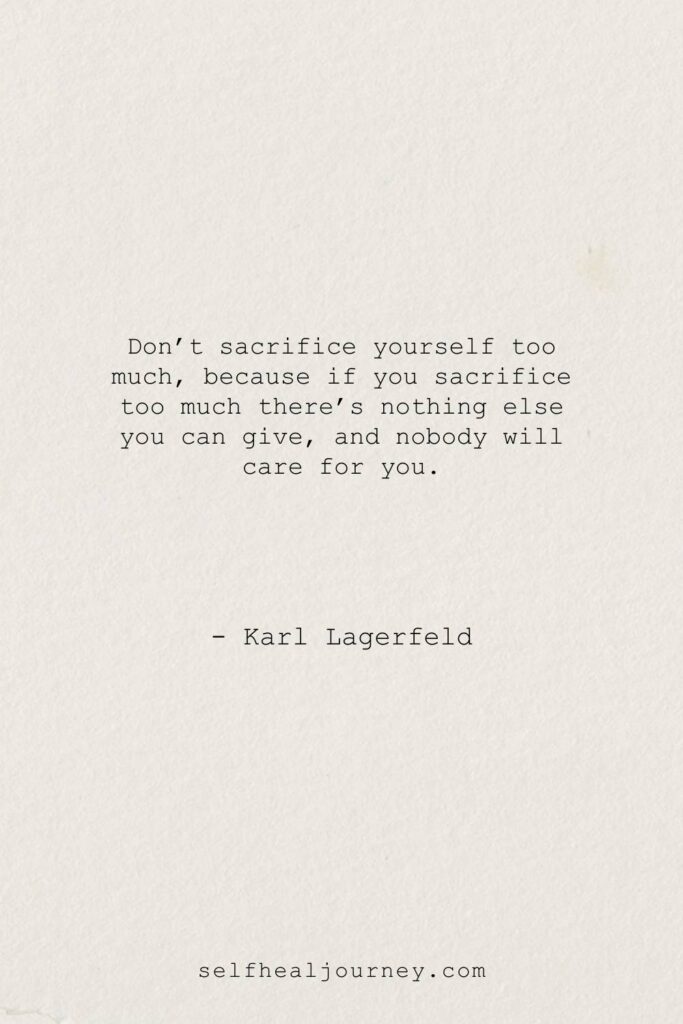
Don’t sacrifice yourself too much, because if you sacrifice too much there’s nothing else you can give, and nobody will care for you.
Karl Lagerfeld
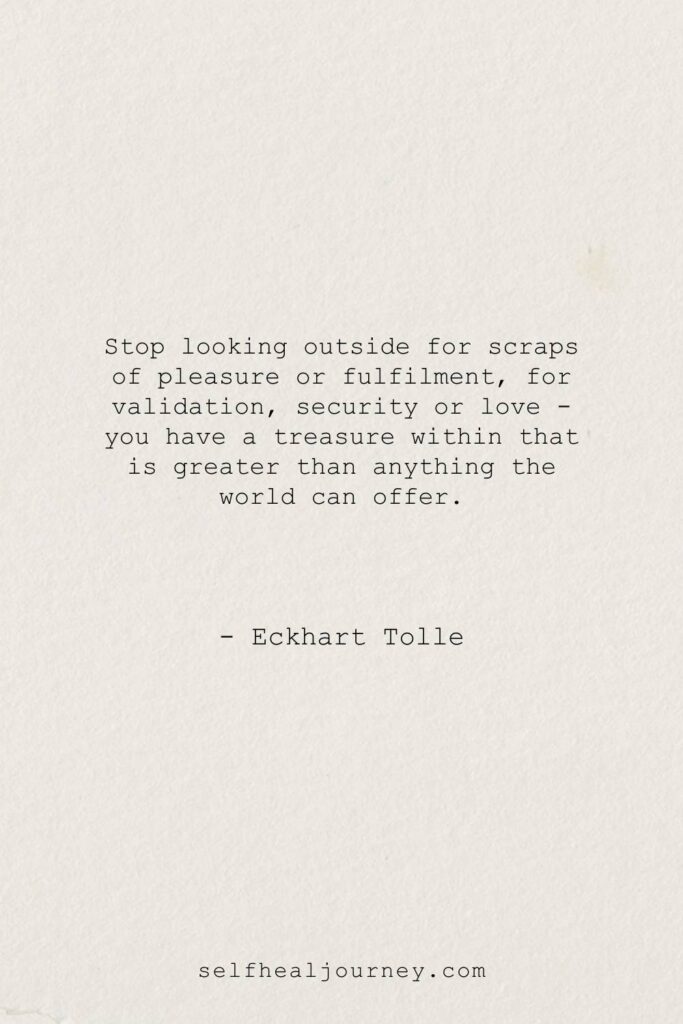
Stop looking outside for scraps of pleasure or fulfilment, for validation, security or love – you have a treasure within that is greater than anything the world can offer.
Eckhart Tolle
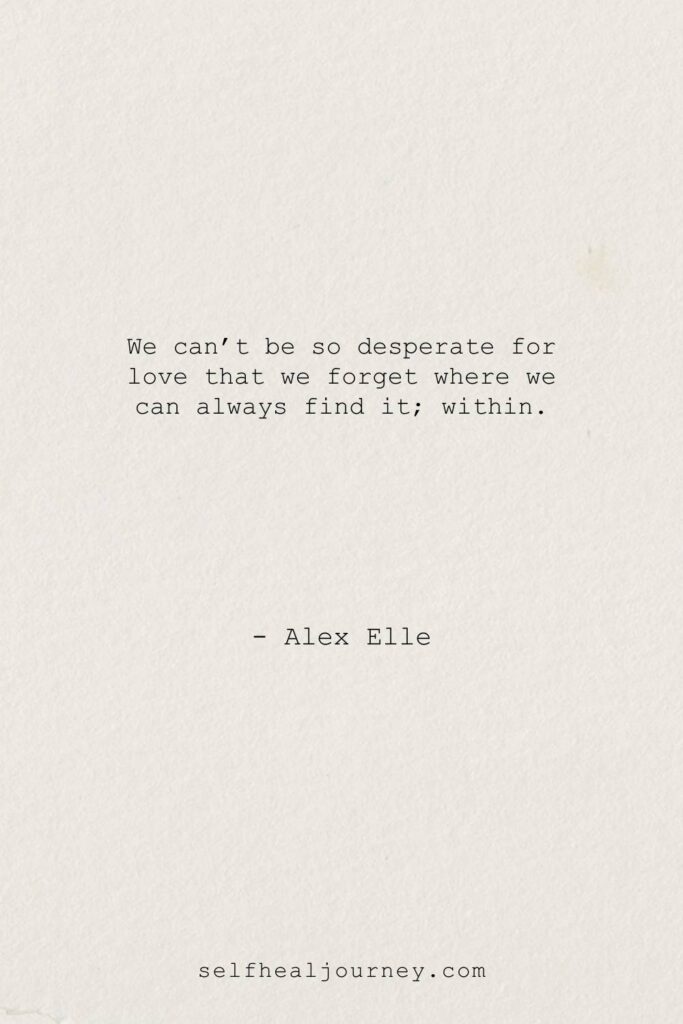
We can’t be so desperate for love that we forget where we can always find it; within.
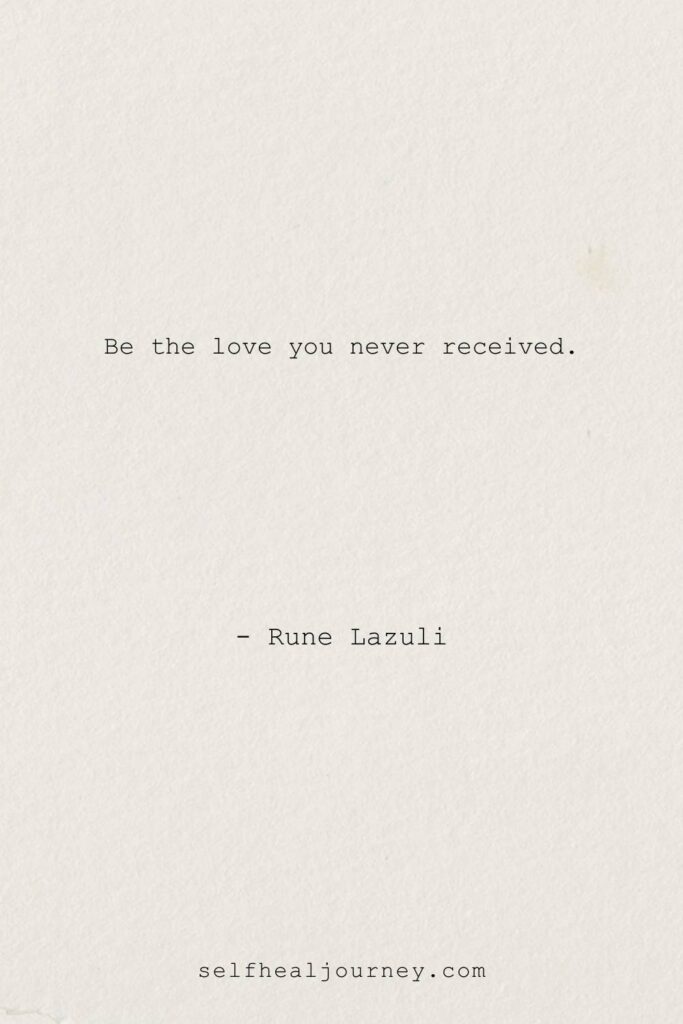
Be the love you never received.
Rune Lazuli
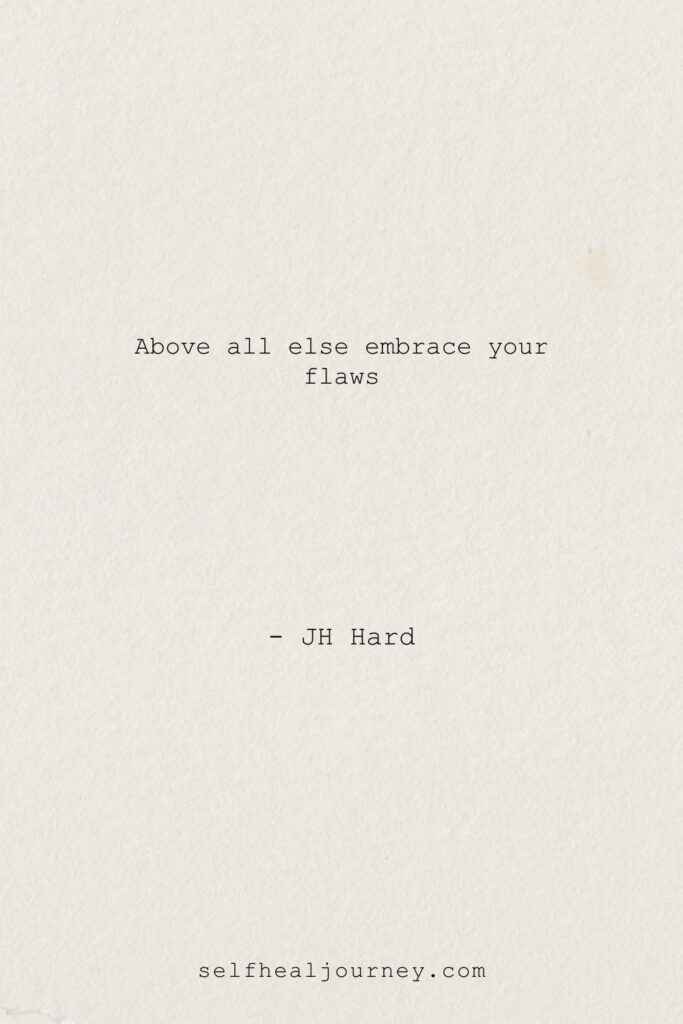
Above all else embrace your flaws.
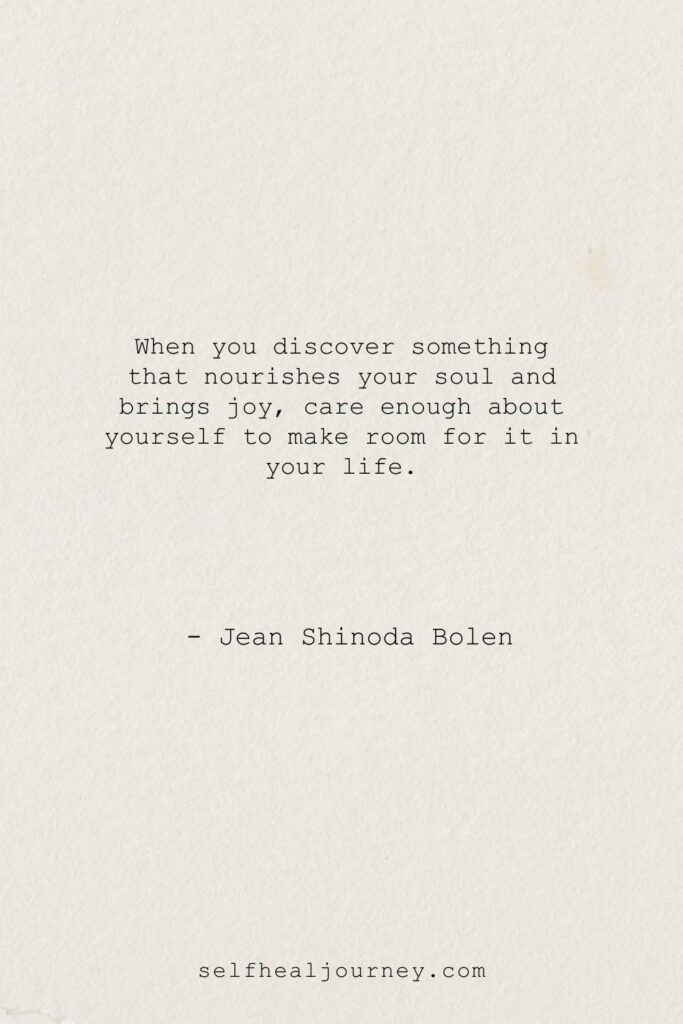
When you discover something that nourishes your soul and brings joy, care enough about yourself to make room for it in your life.
Jean Shinoda Bolen
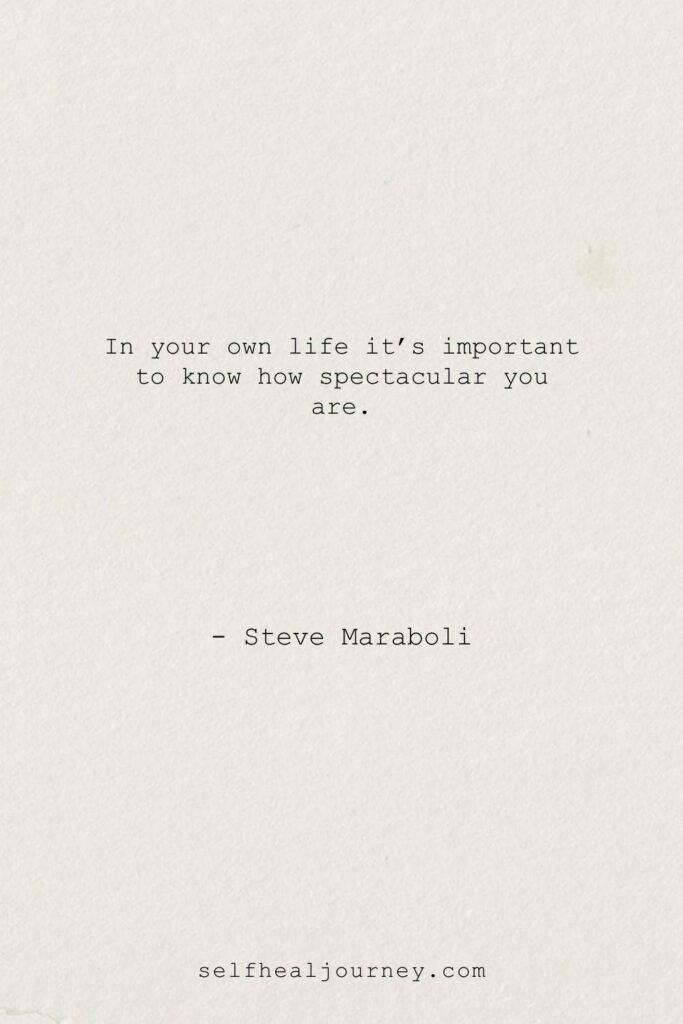
In your own life it’s important to know how spectacular you are.
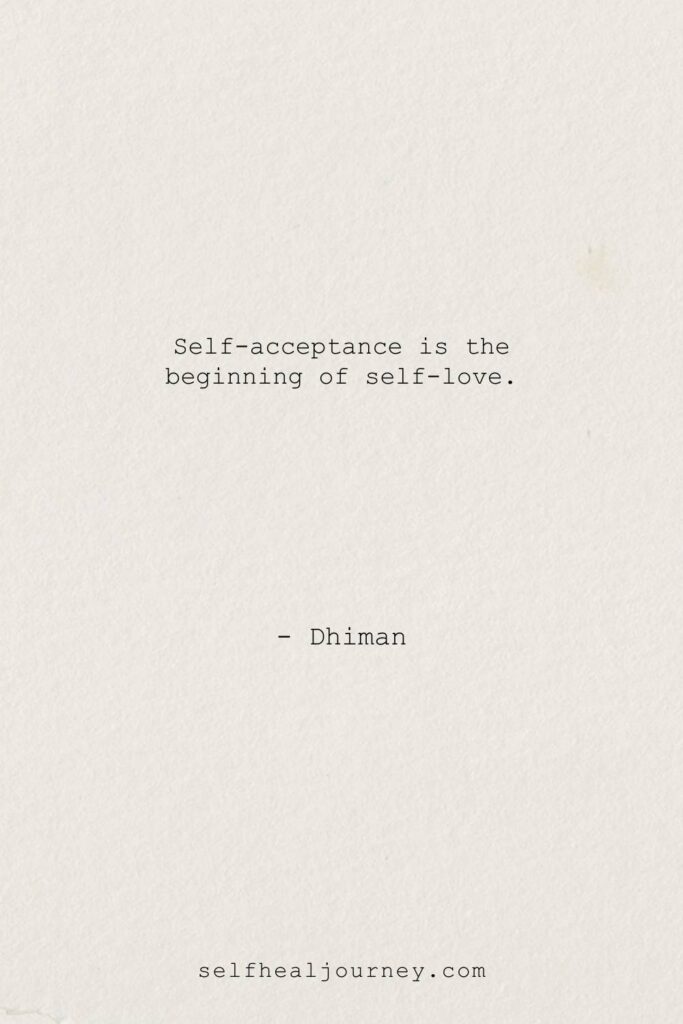
Self-acceptance is the beginning of self-love.
Self Inspirational Quotes
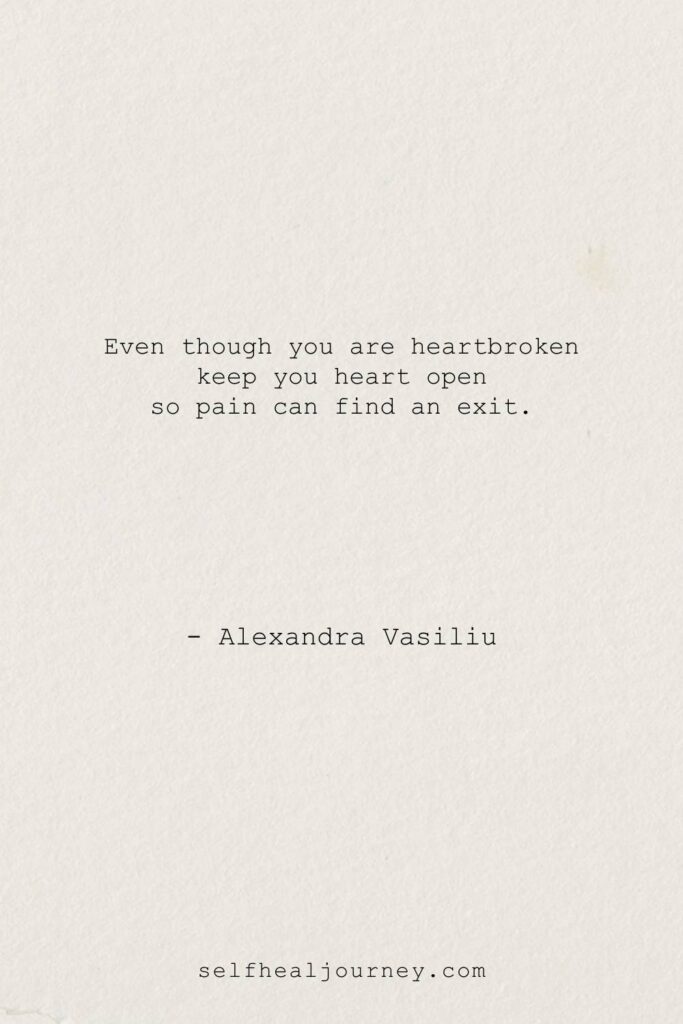
Even though you are heartbroken
keep you heart open
so pain can find an exit.
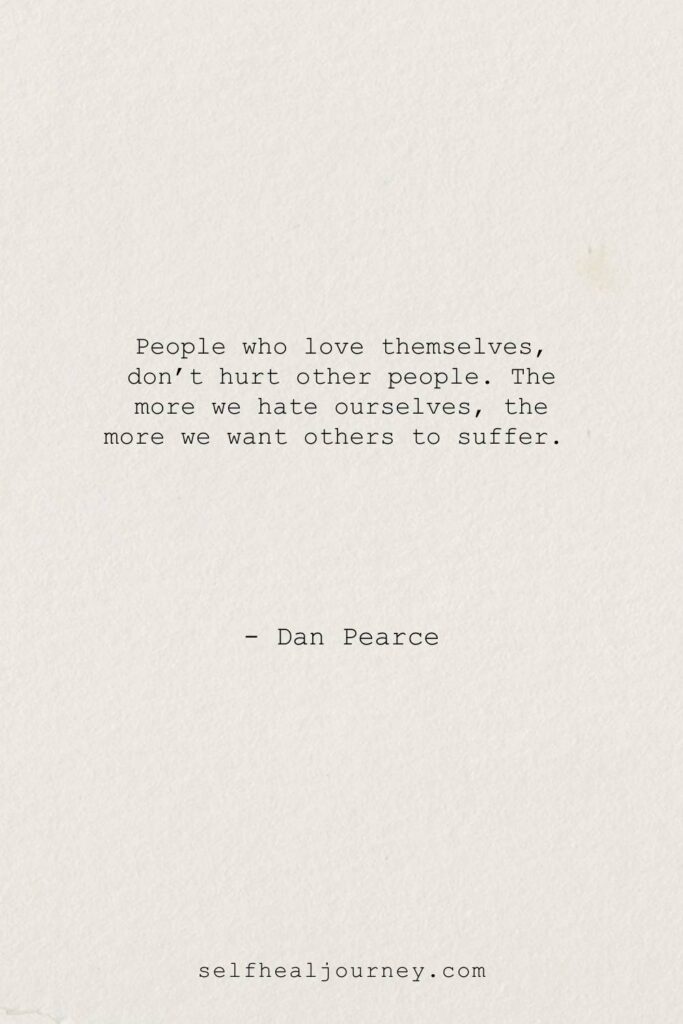
People who love themselves, don’t hurt other people. The more we hate ourselves, the more we want others to suffer.
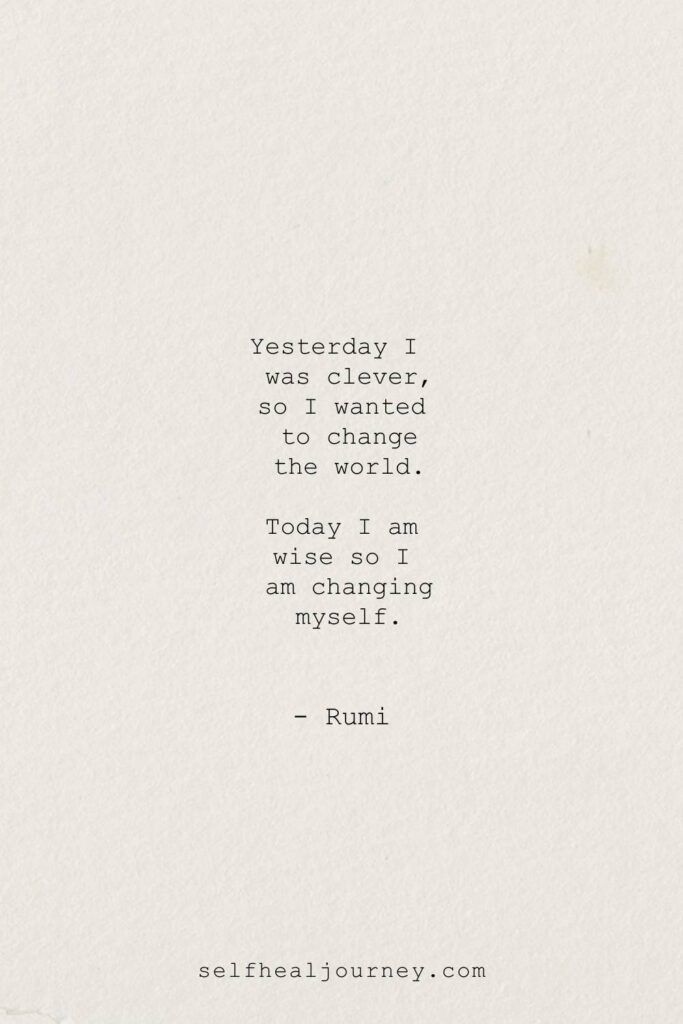
Yesterday I was clever,
so I wanted to change the world.
Today I am wise so I am changing
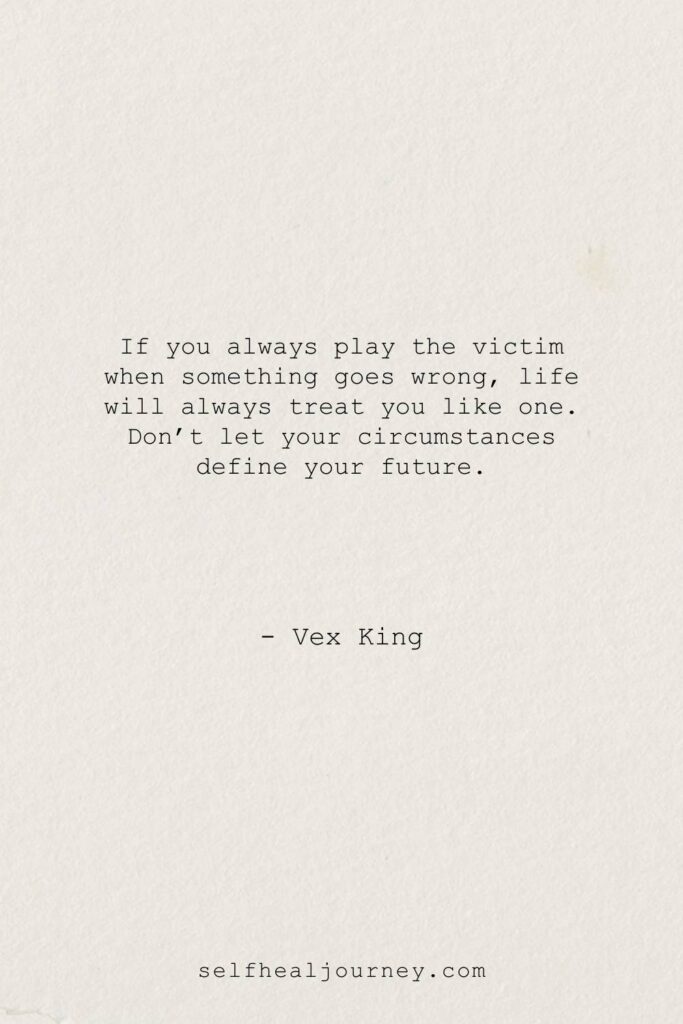
If you always play the victim when something goes wrong, life will always treat you like one. Don’t let your circumstances define your future.
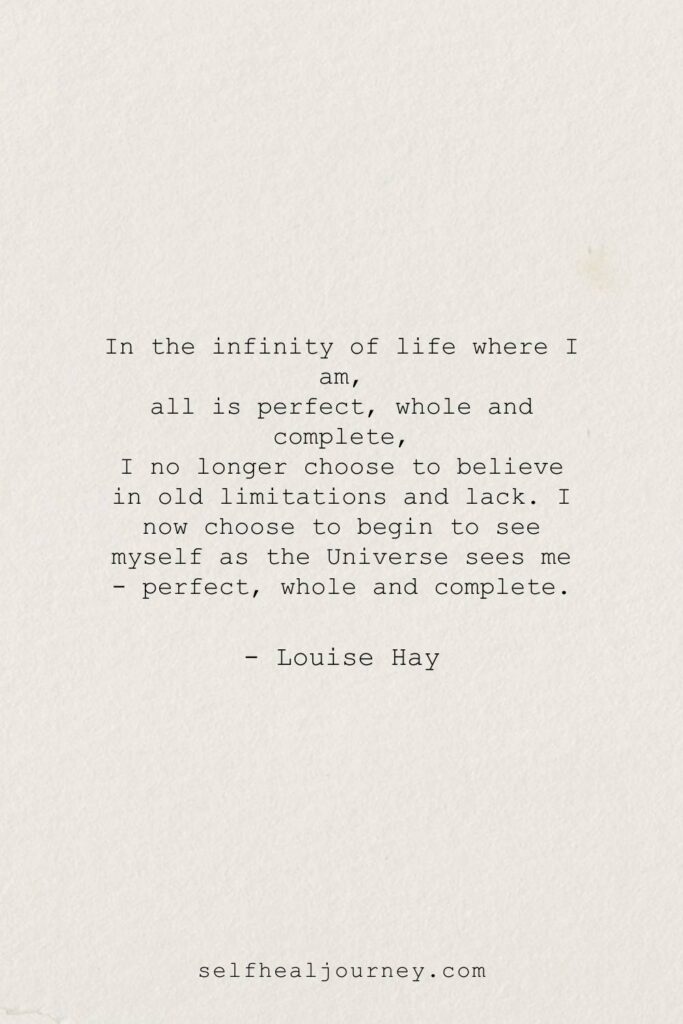
In the infinity of life where I am, all is perfect, whole and complete, I no longer choose to believe in old limitations and lack. I now choose to begin to see myself as the Universe sees me – perfect, whole and complete.
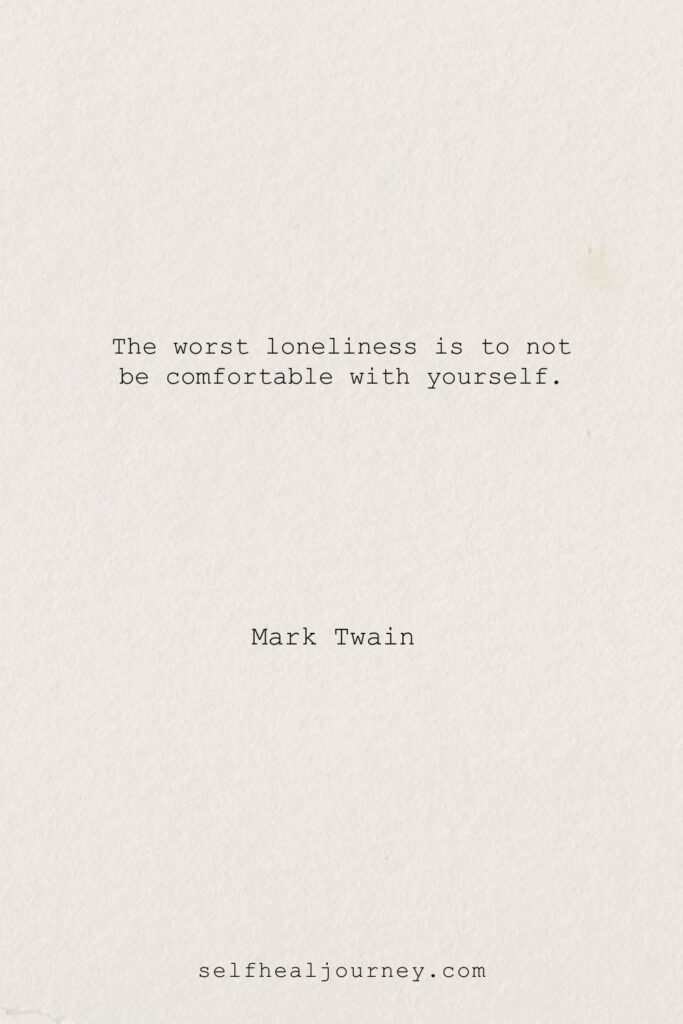
The worst loneliness is to not be comfortable with yourself.
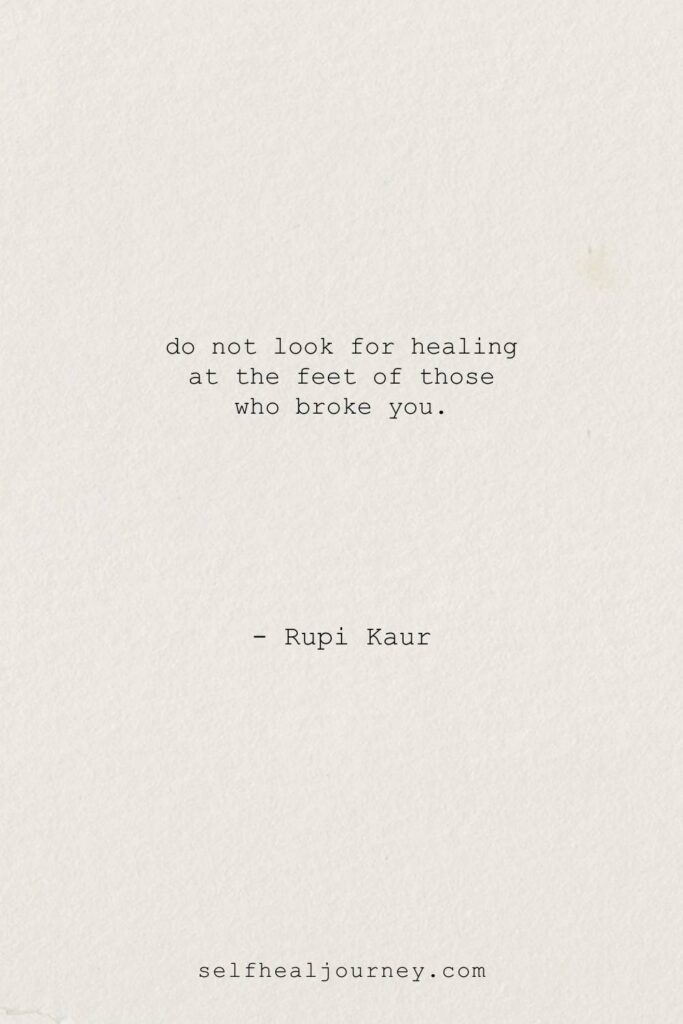
do not look for healing
at the feet of those
who broke you.
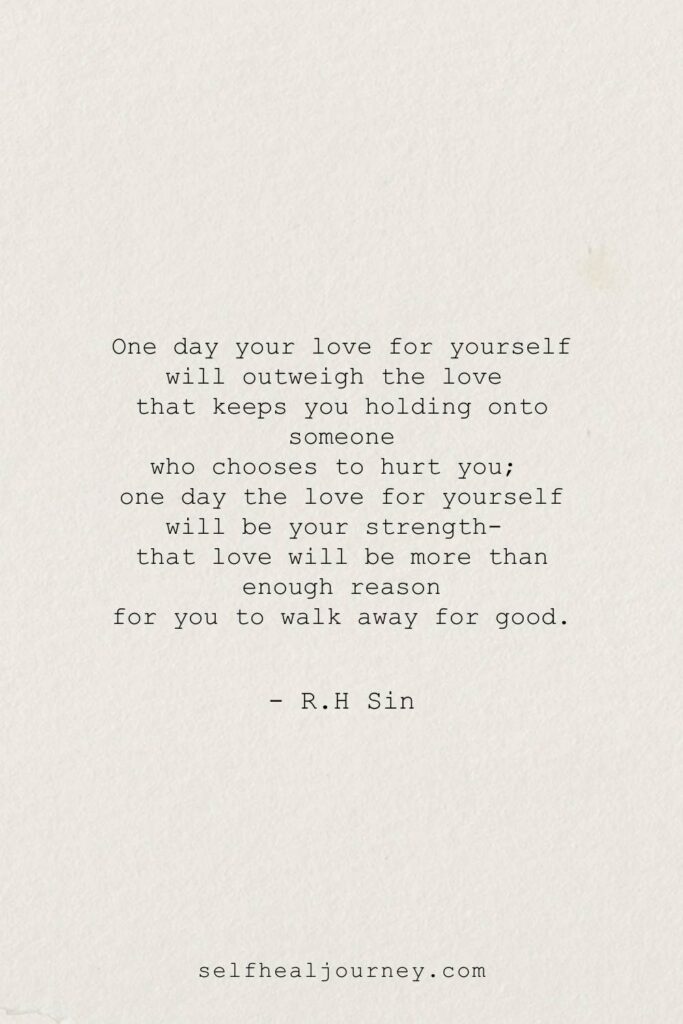
One day your love for yourself will outweigh the love that keeps you holding onto someone who chooses to hurt you; one day the love for yourself will be your strength-that love will be more than enough reason for you to walk away for good.
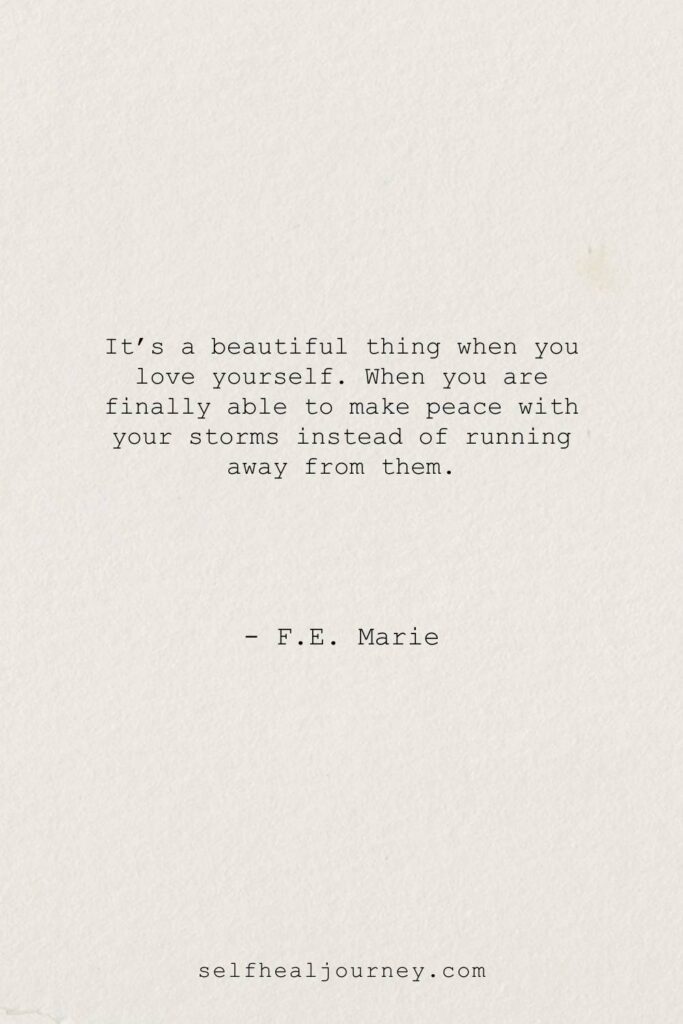
It’s a beautiful thing when you love yourself. When you are finally able to make peace with your storms instead of running away from them.
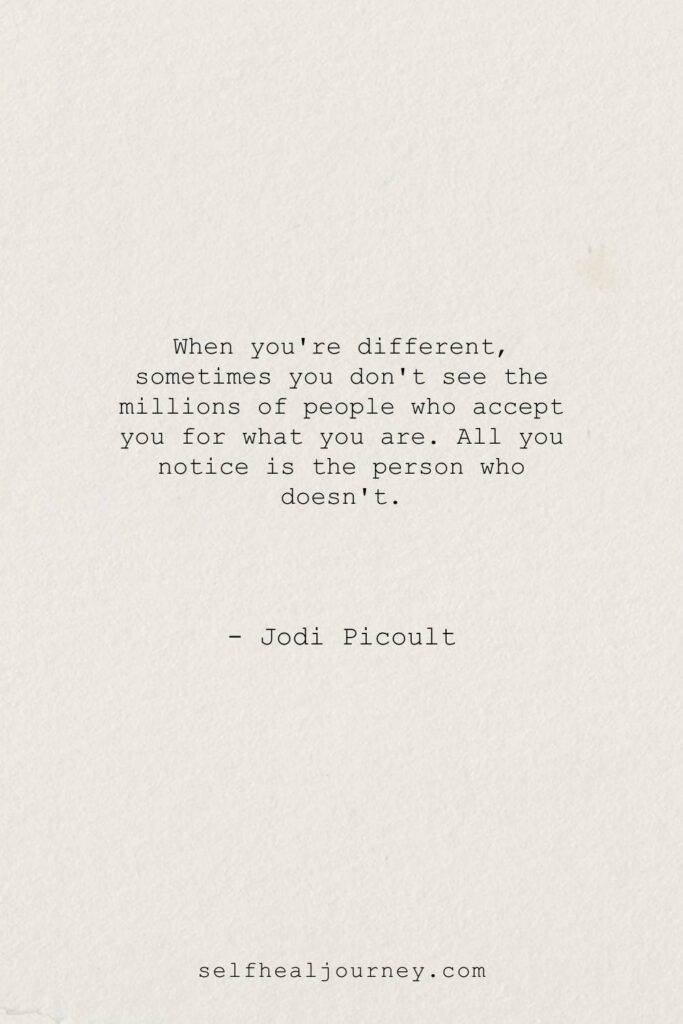
When you’re different, sometimes you don’t see the millions of people who accept you for what you are. All you notice is the person who doesn’t.
Jodi Picoult
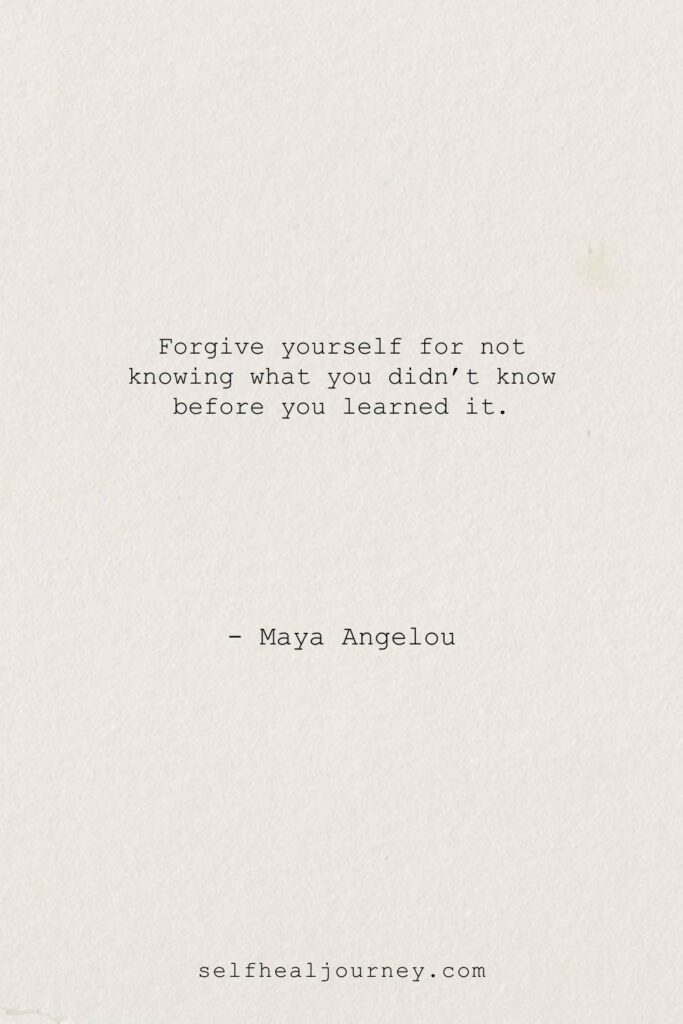
Forgive yourself for not knowing what you didn’t know before you learned it.
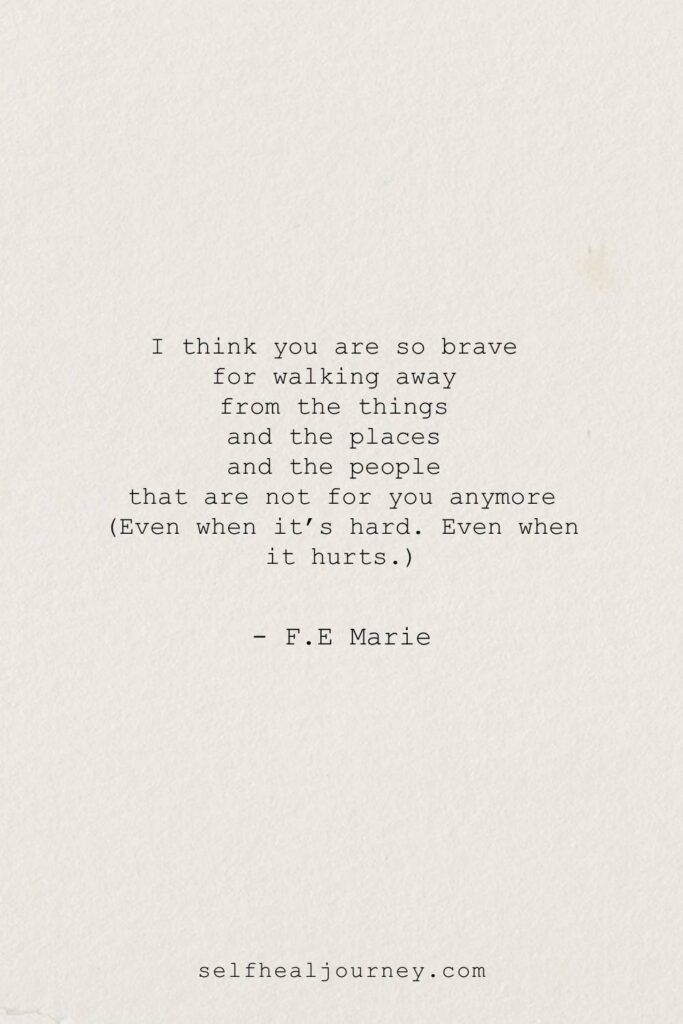
I think you are so brave for walking away from the things and the places and the people that are not for you anymore (Even when it’s hard. Even when it hurts.)
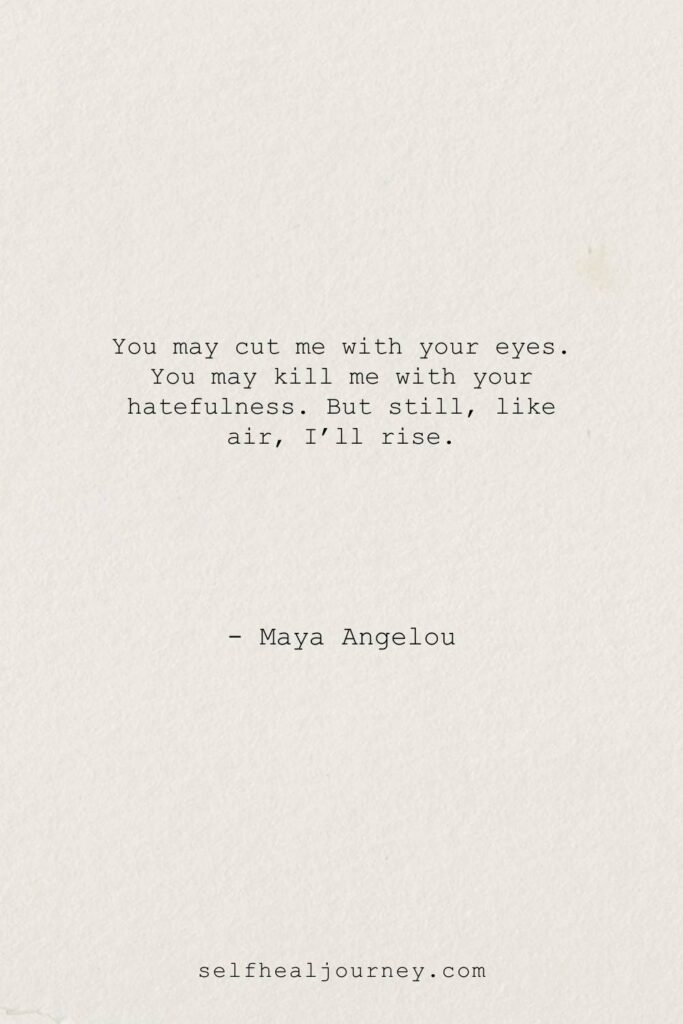
You may cut me with your eyes. You may kill me with your hatefulness. But still, like air, I’ll rise.
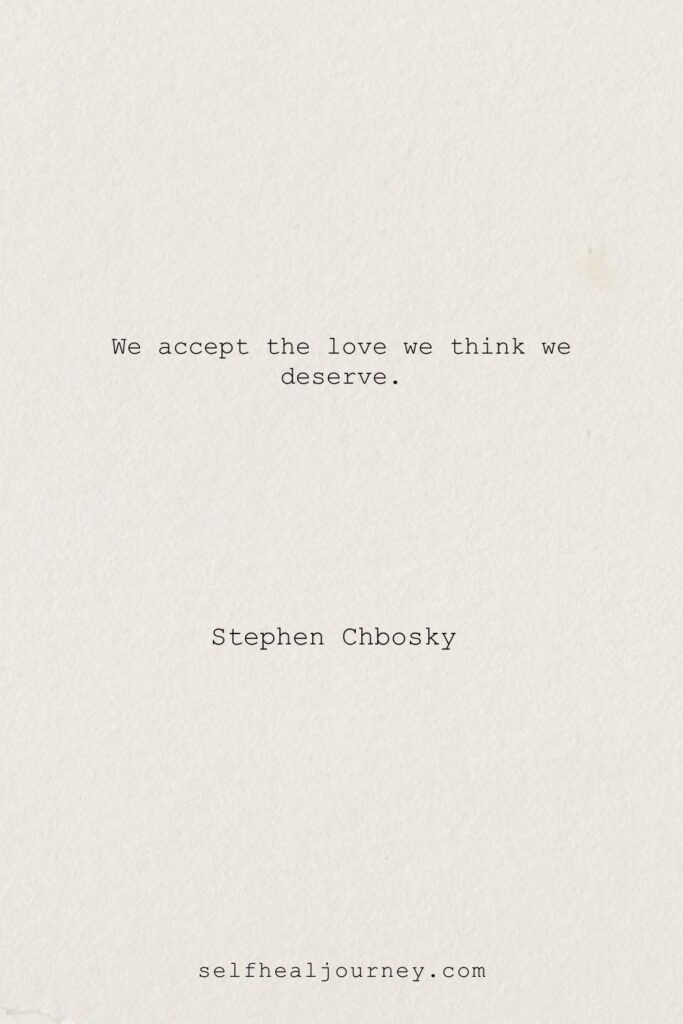
We accept the love we think we deserve.
Stephen Chbosky
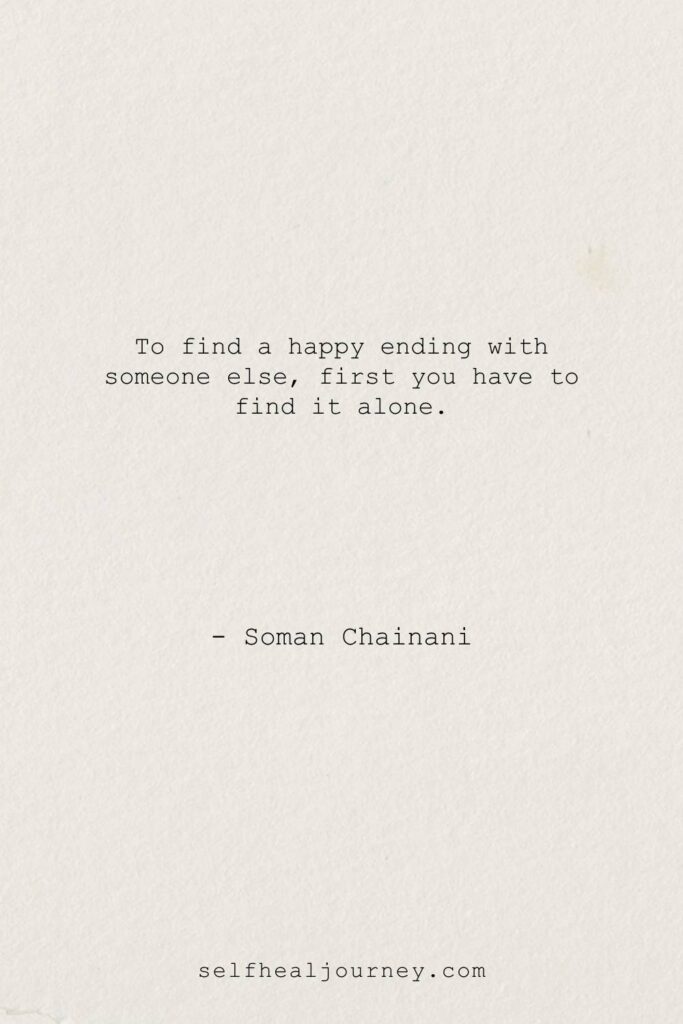
To find a happy ending with someone else, first you have to find it alone.
Soman Chainani
Deep Self Healing Quotes
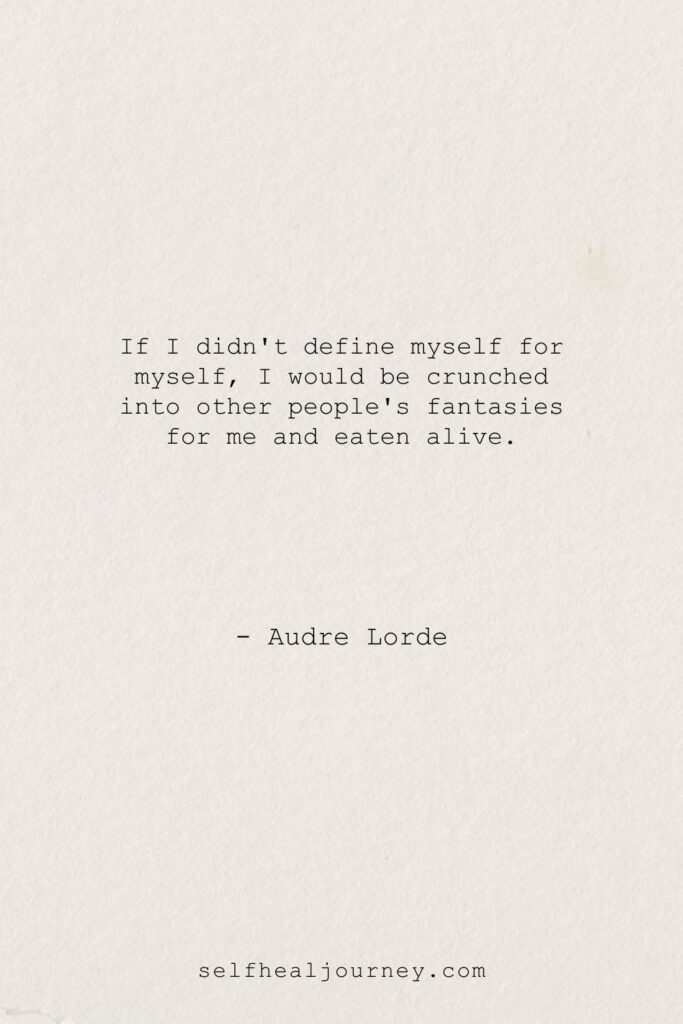
If I didn’t define myself for myself, I would be crunched into other people’s fantasies for me and eaten alive.
Audre Lorde
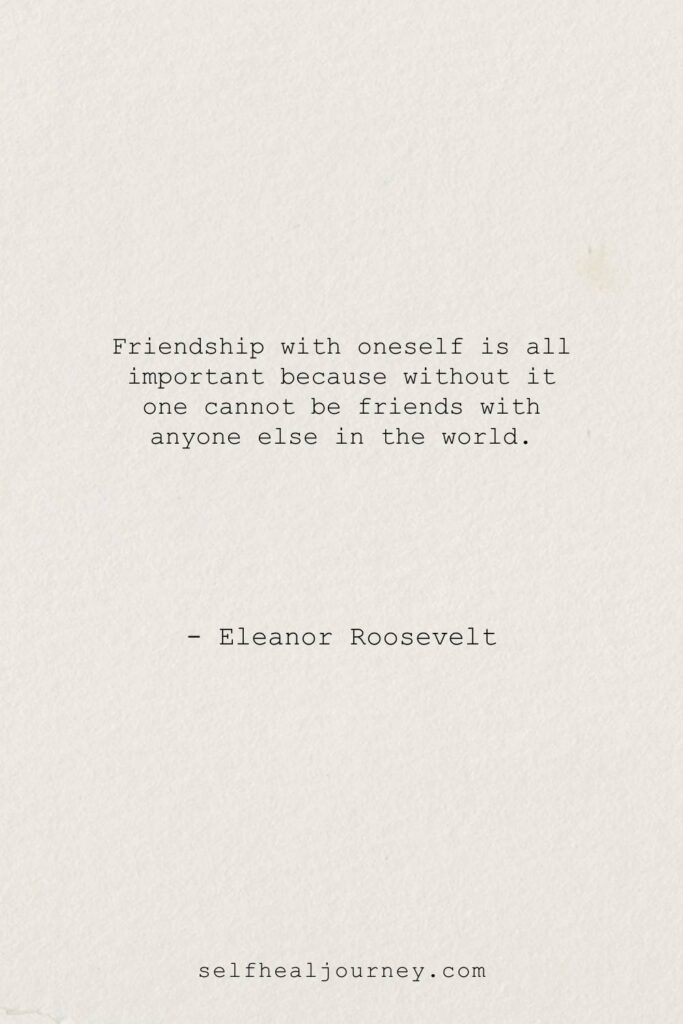
Friendship with oneself is all important because without it one cannot be friends with anyone else in the world.
Eleanor Roosevelt
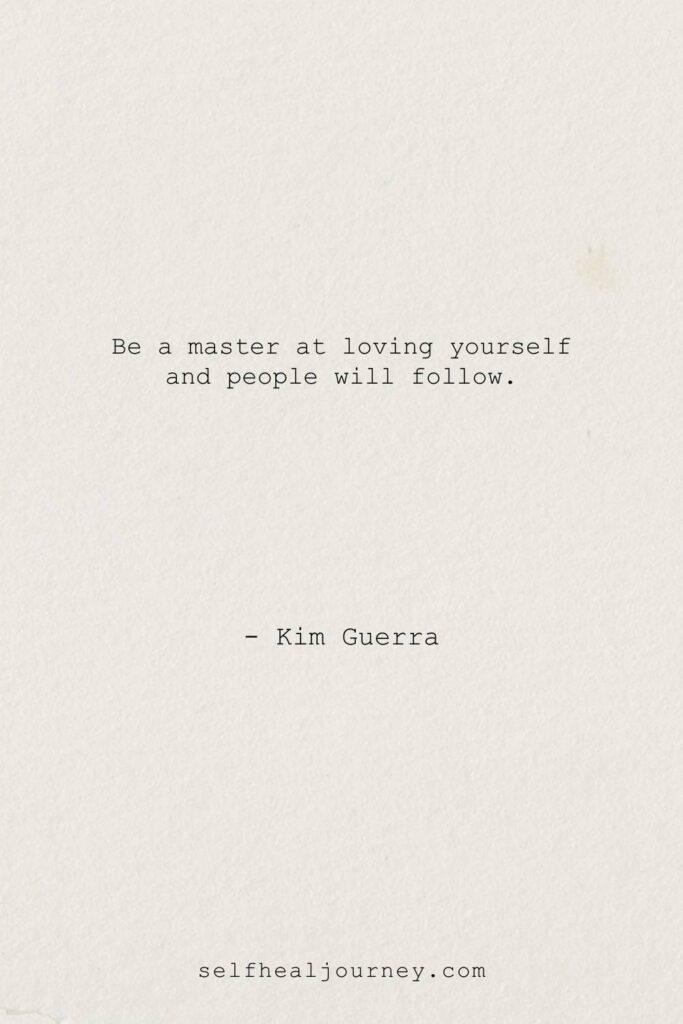
Be a master at loving yourself and people will follow.
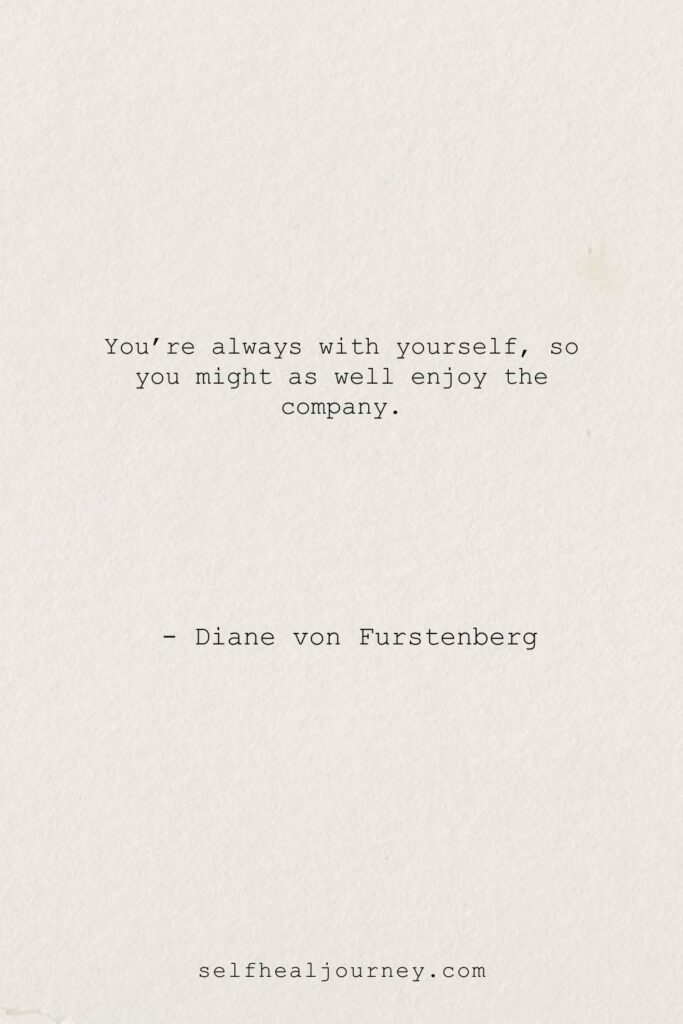
You’re always with yourself, so you might as well enjoy the company.
Diane von Furstenberg
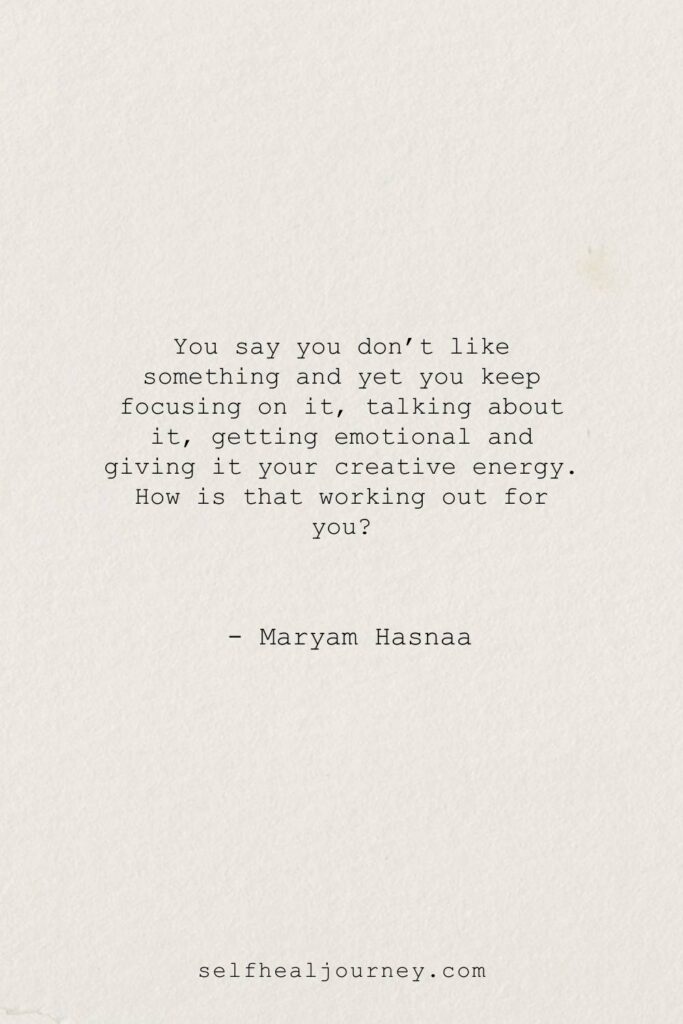
You say you don’t like something and yet you keep focusing on it, talking about it, getting emotional and giving it your creative energy. How is that working out for you?
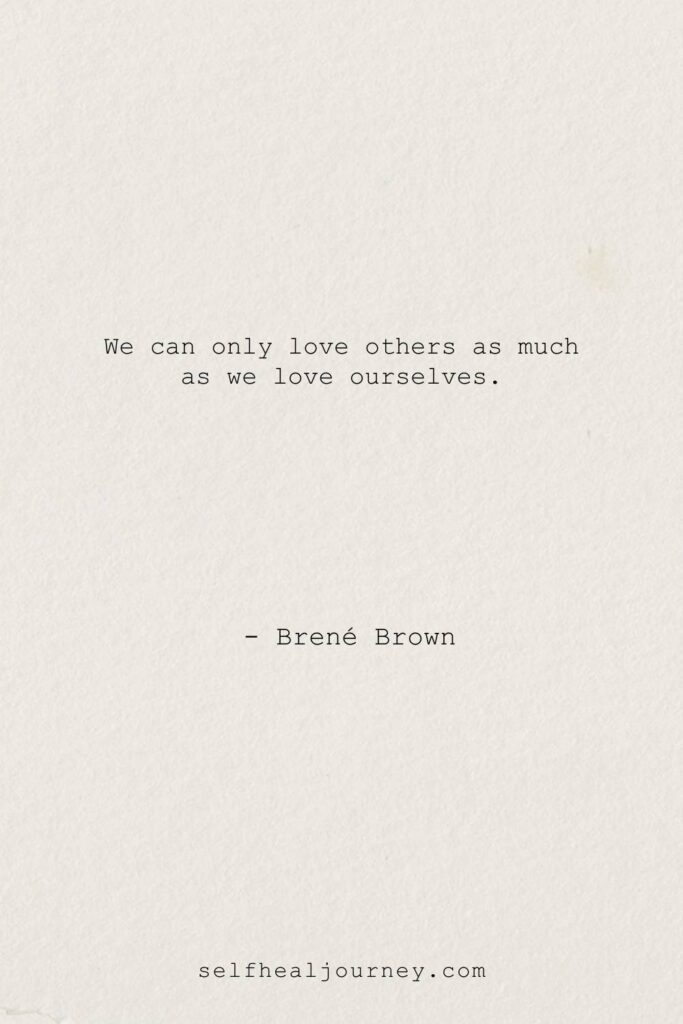
We can only love others as much as we love ourselves.
Brené Brown
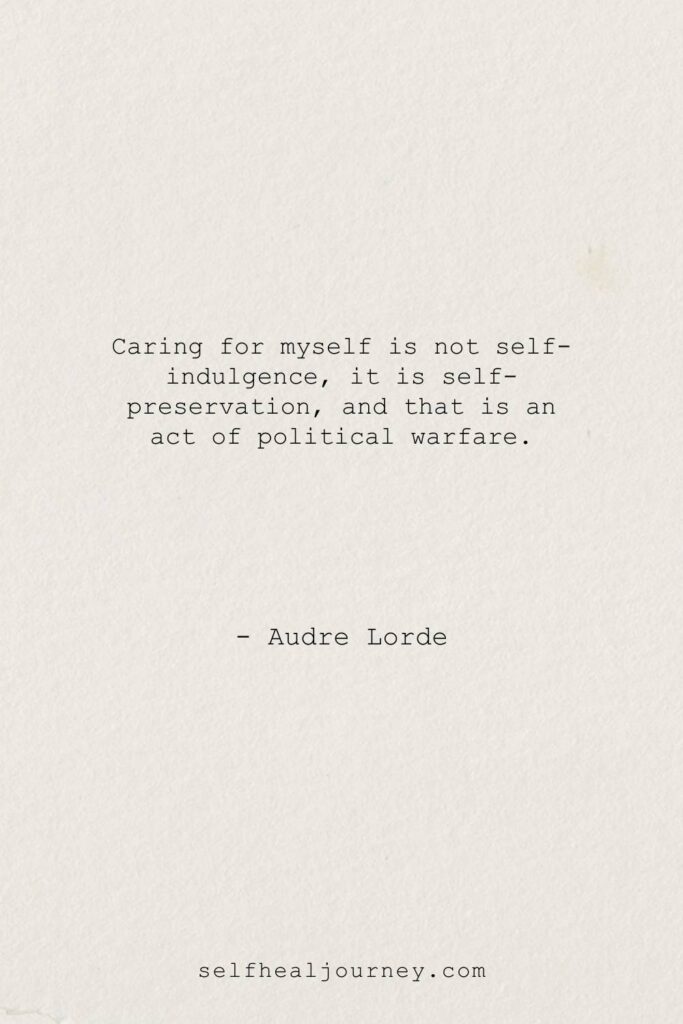
Caring for myself is not self-indulgence, it is self-preservation, and that is an act of political warfare.
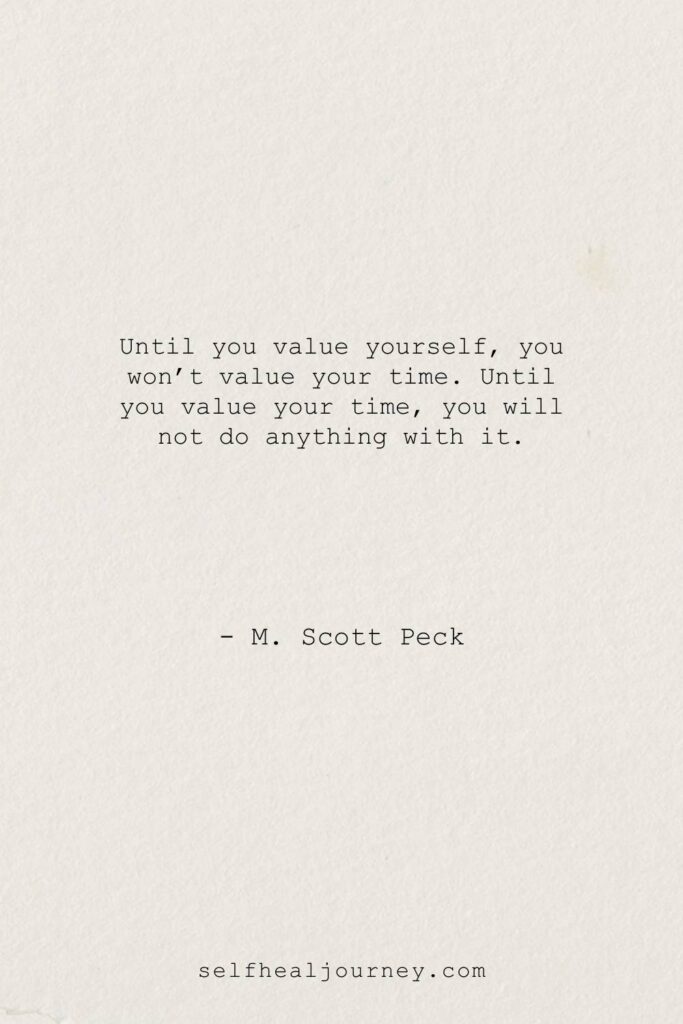
Until you value yourself, you won’t value your time. Until you value your time, you will not do anything with it.
M. Scott Peck
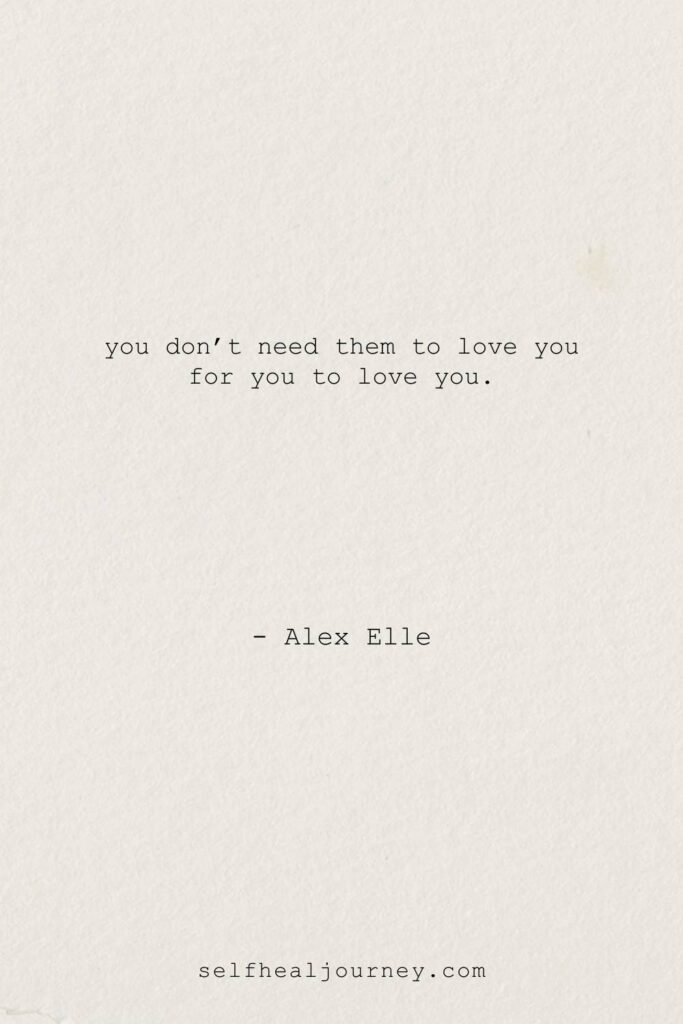
You don’t need them to love you for you to love you.
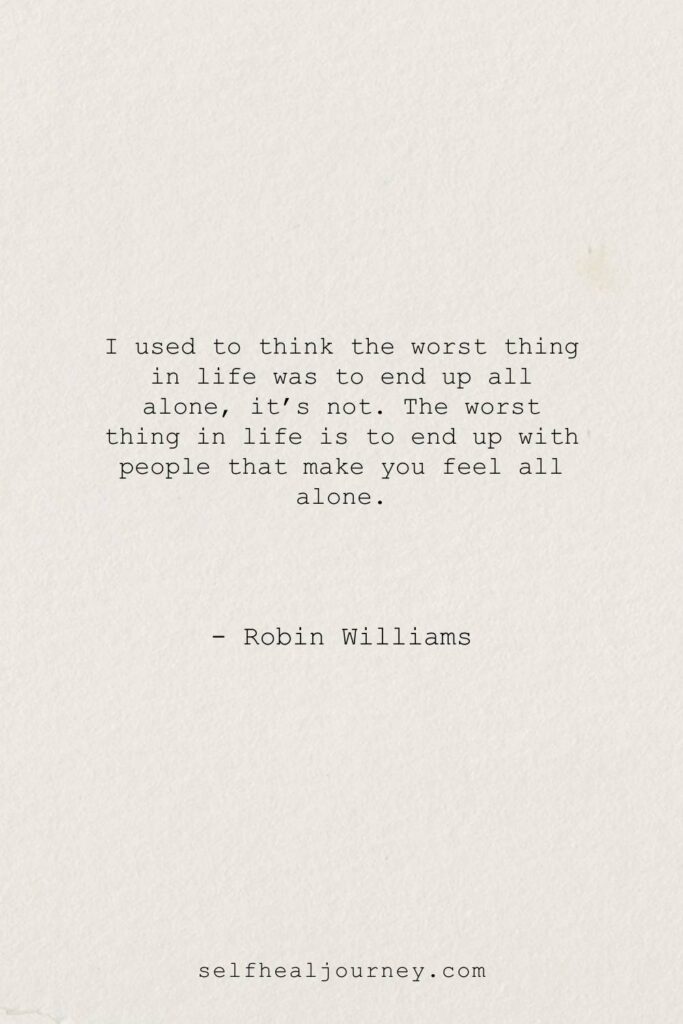
I used to think the worst thing in life was to end up all alone, it’s not. The worst thing in life is to end up with people that make you feel all alone.
Robin Williams
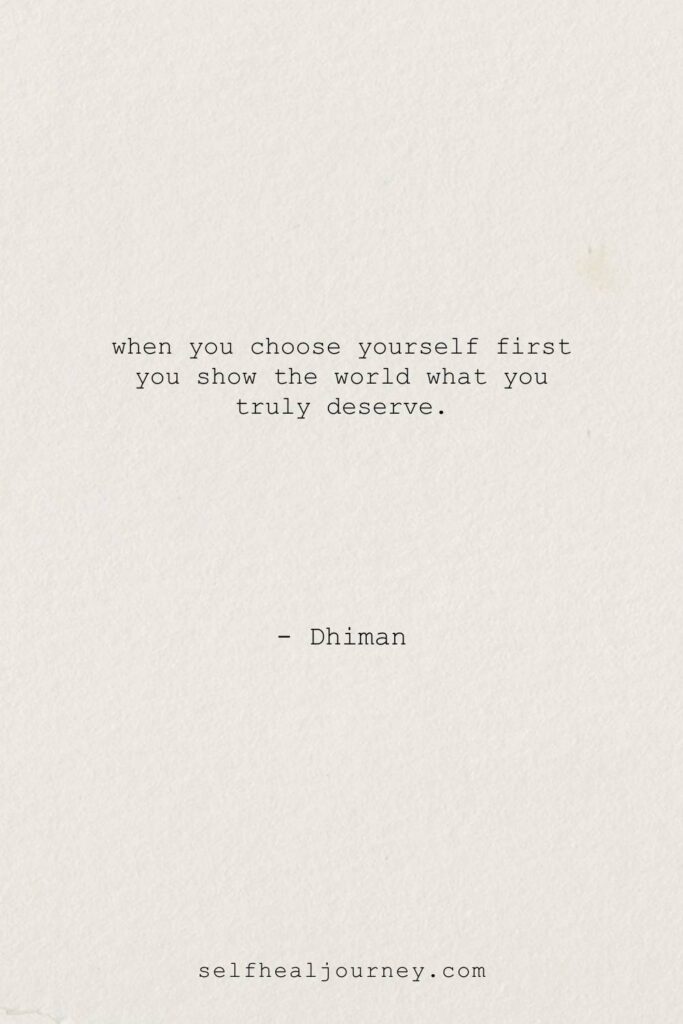
When you choose yourself first you show the world what you truly deserve.
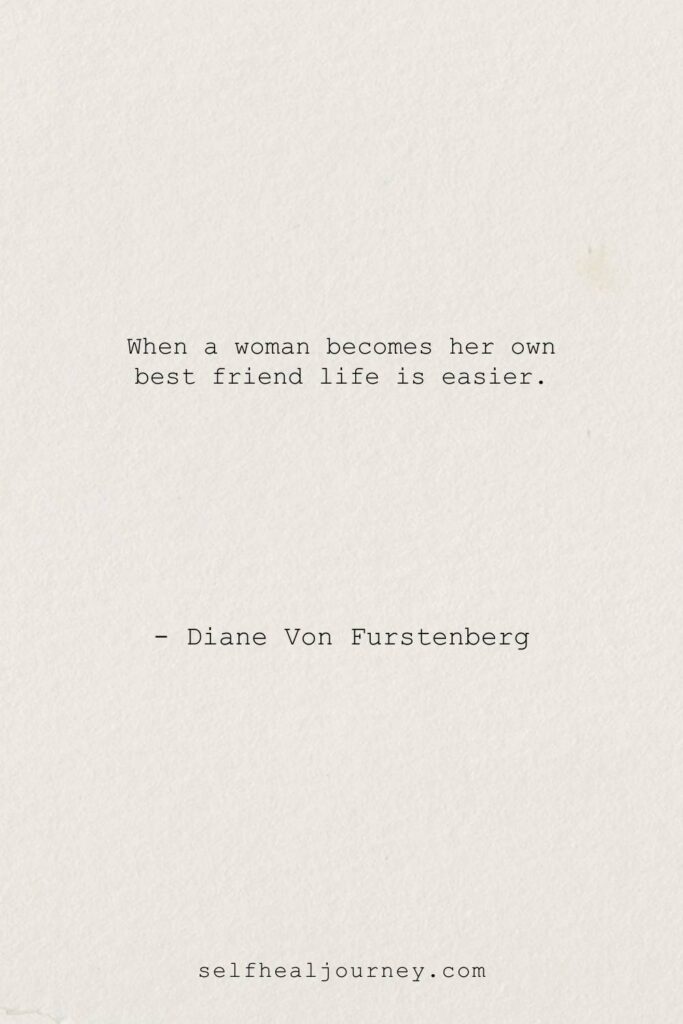
When a woman becomes her own best friend life is easier.
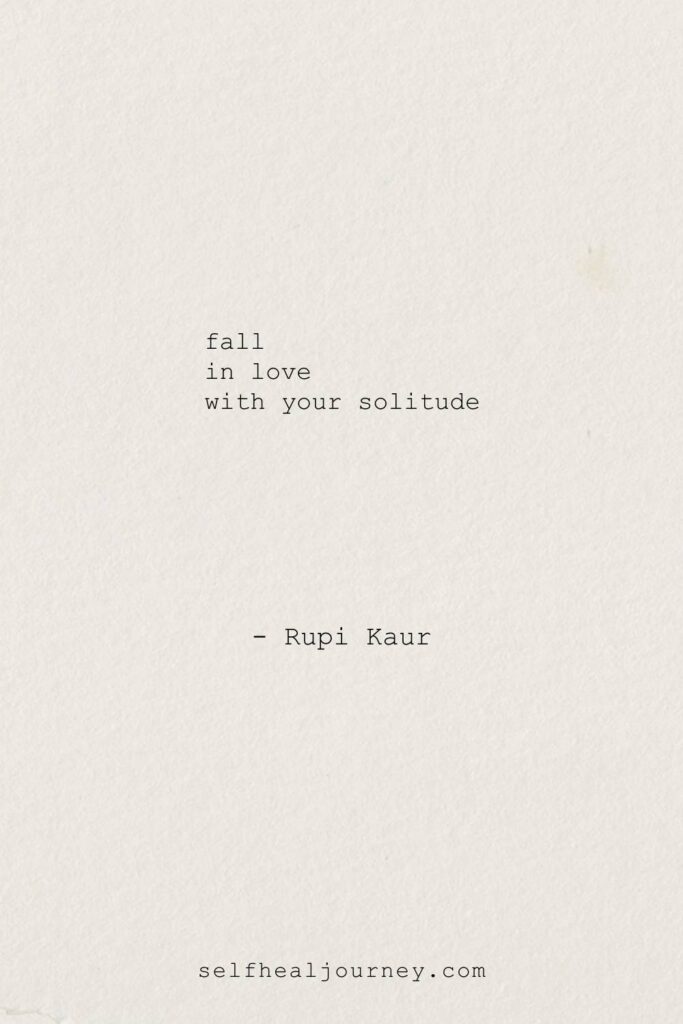
with your solitude
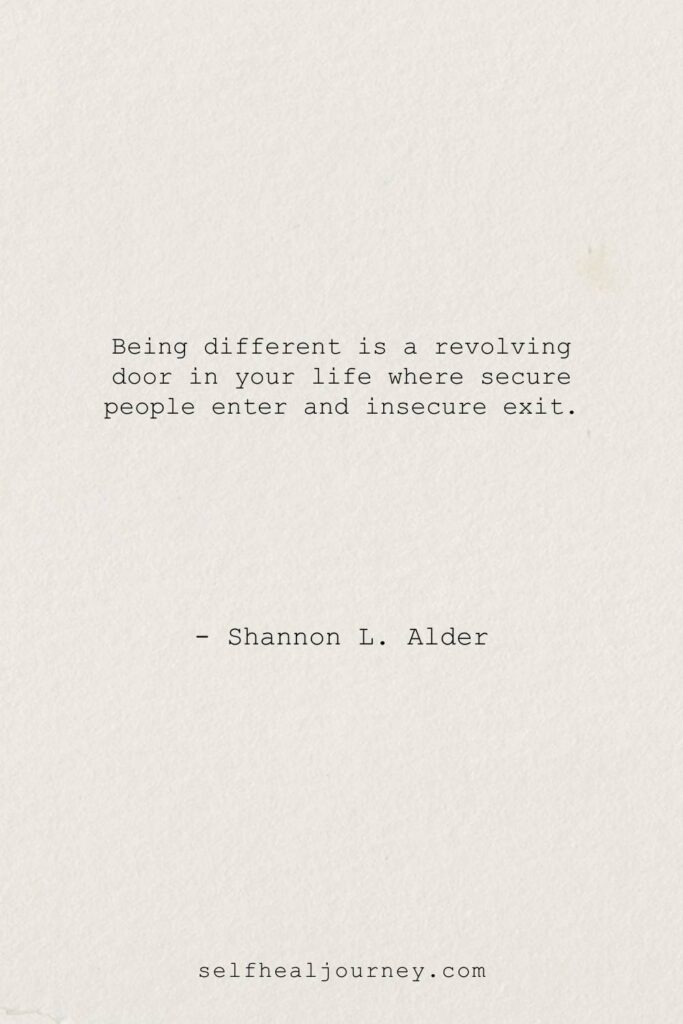
Being different is a revolving door in your life where secure people enter and insecure exit.
Shannon L. Alder
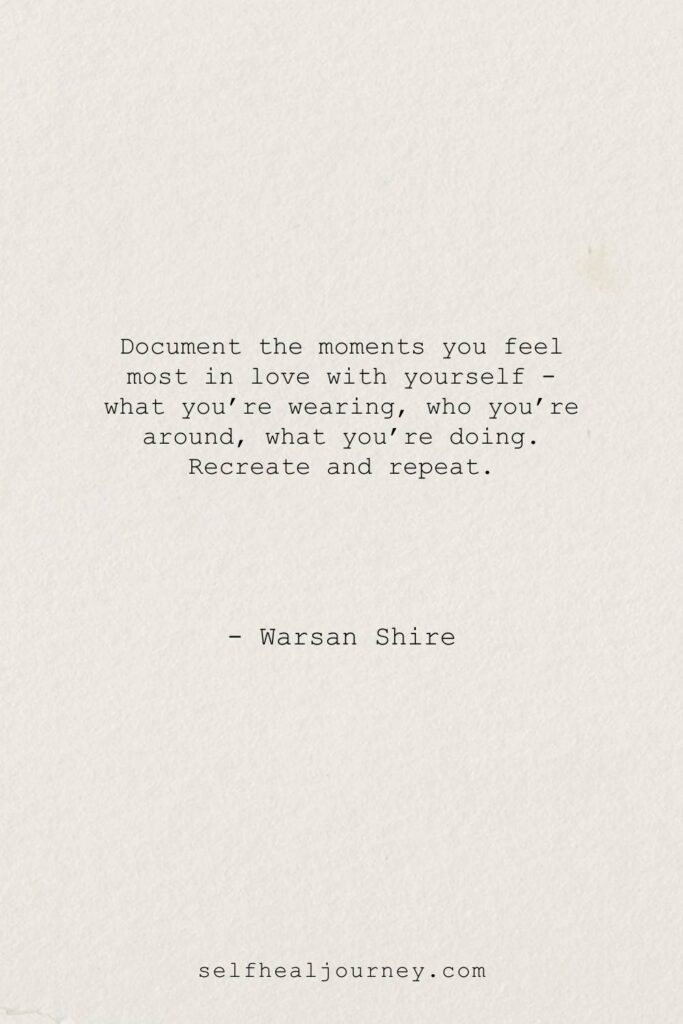
Document the moments you feel most in love with yourself – what you’re wearing, who you’re around, what you’re doing. Recreate and repeat.
Warsan Shire
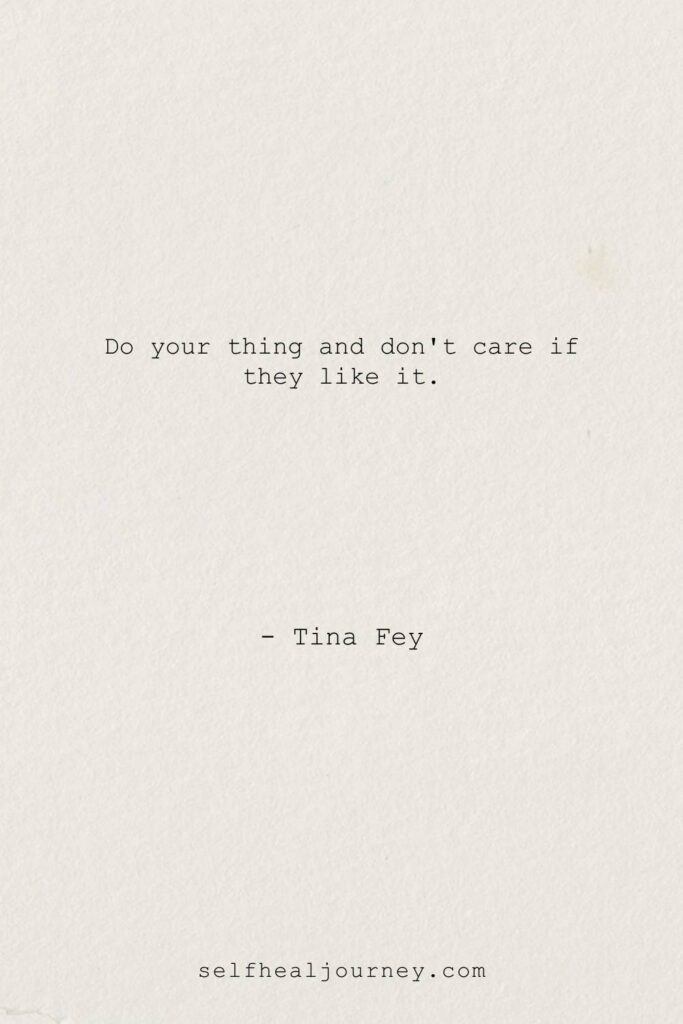
Do your thing and don’t care if they like it.
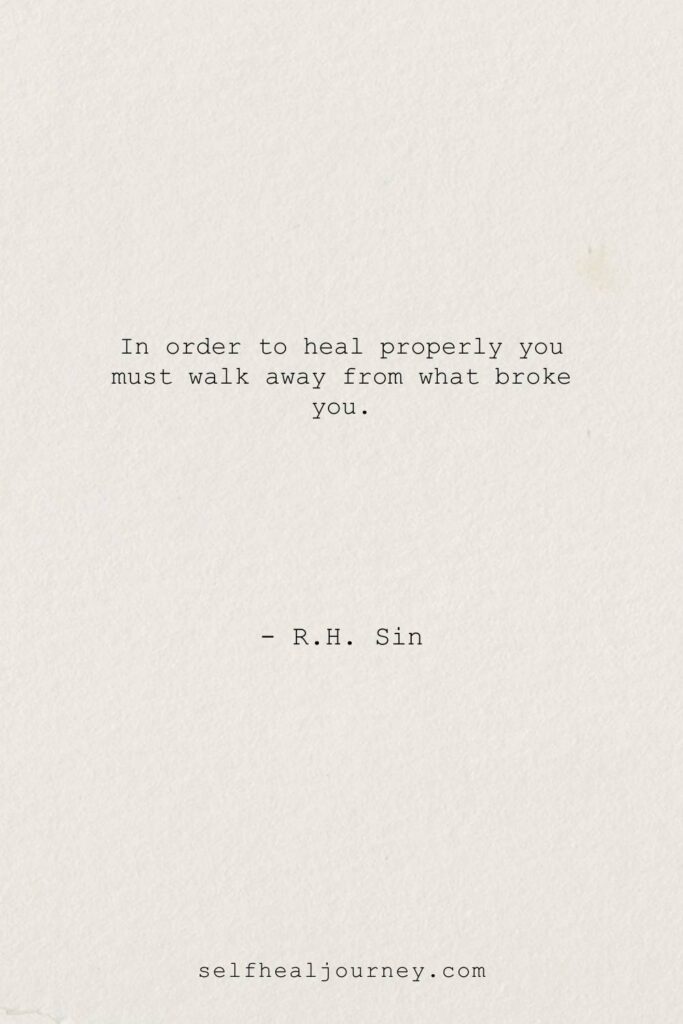
In order to heal properly you must walk away from what broke you.
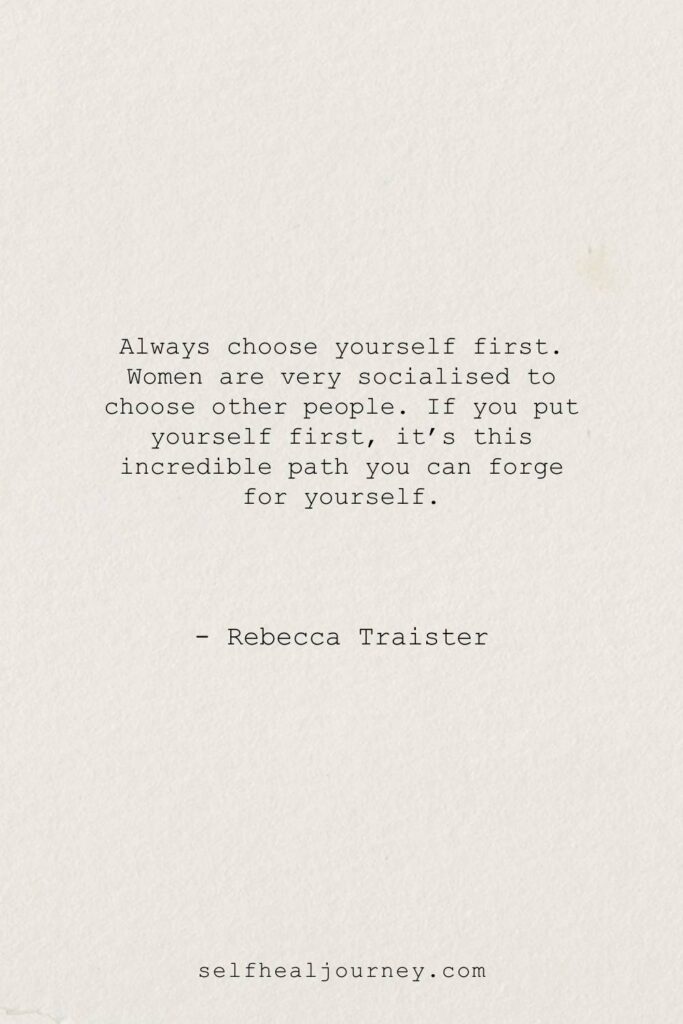
Always choose yourself first. Women are very socialised to choose other people. If you put yourself first, it’s this incredible path you can forge for yourself.
Rebecca Traister
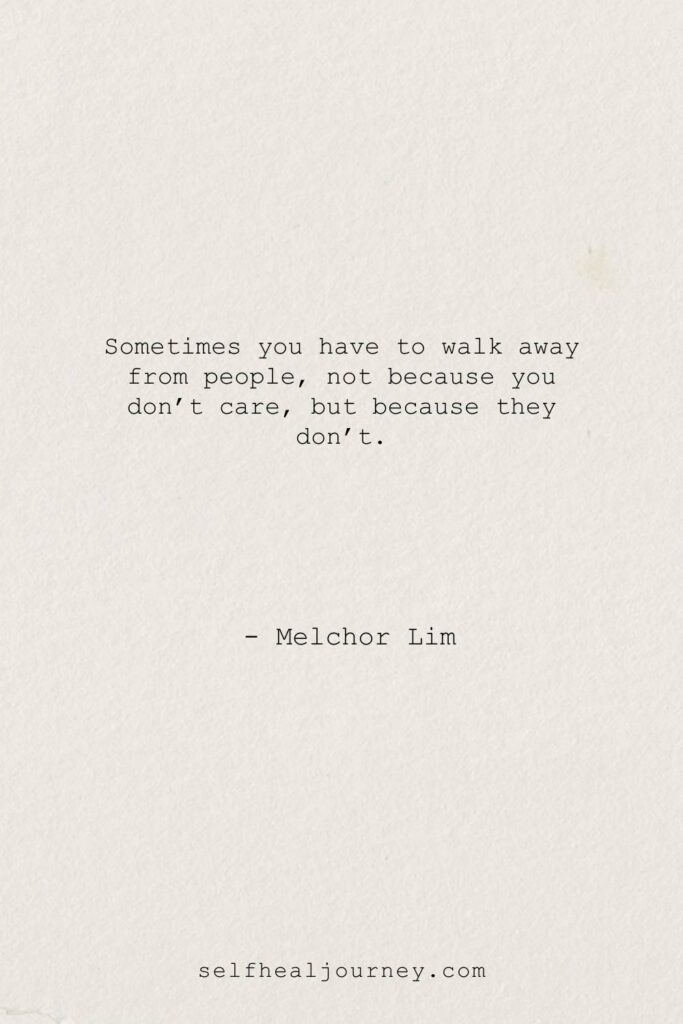
Sometimes you have to walk away from people, not because you don’t care, but because they don’t.
Melchor Lim
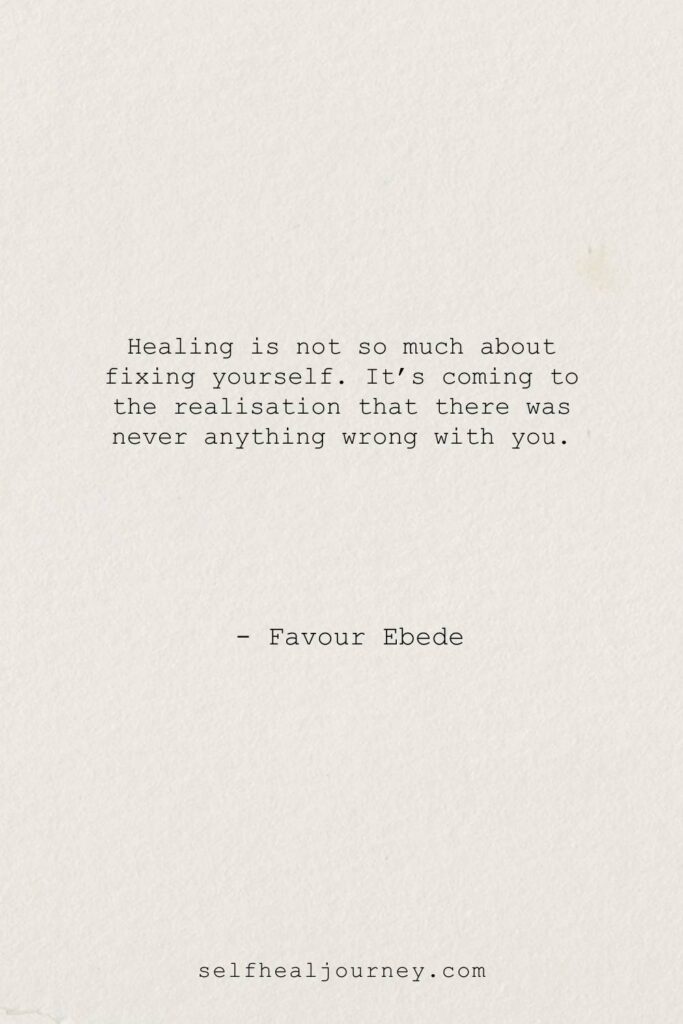
Healing is not so much about fixing yourself. It’s coming to the realisation that there was never anything wrong with you.
Favour Ebede
It is imperative to use these self love quotes as a constant reminder for self love and acceptance, as these are essential components of healing. Recognising our own potential and infinite worth is necessary in order to truly heal and progress. What was your favourite self love quote on this list? If you have any quotes on self love that I didn’t include, feel free to do so in the comment section!
I was just looking for this information for a while. After six hours of continuous Googleing, at last I got it in your site. I wonder what is the Google’s problem that doesn’t rank this kind of informative sites closer to the top. Usually the top sites are full of garbage.
Glad you found what you’ve been looking for.
Thanks for letting me know – I am constantly updating my old posts so will keep that in mind. Will love to have you back here 🙂
Leave a Reply Cancel reply
Your email address will not be published. Required fields are marked *
Save my name, email, and website in this browser for the next time I comment.
Get the FREE guides to change your life
Get free access to all my self help guides to become your best self! Now this isn't something you want to miss. I am constantly adding new freebies to this list!

yes gimmee!
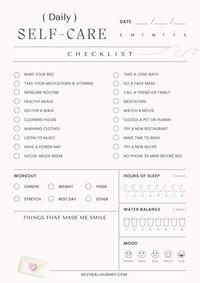
Ready to create your dream life?
Join the community.
@selfhealjourney 2024. All Rights Reserved. | Photos by Pexels
Helping women reconnect with their femininity so they can live their best lives.
Terms of use
Privacy Policy
You're all signed up! Keep your eyes on your inbox for your guide.
Activate your Feminine Magnetism
Hurry get yours now. first 1000 sales get the shadow work book free..

Helping women reconnect with their glow up from within so they can live their best lives.
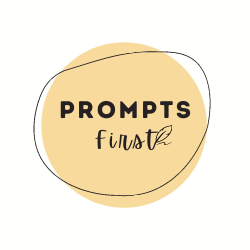
100 Helpful Journal Prompts For Emotional Healing
by Melissa Giroux | Journaling , Self Care
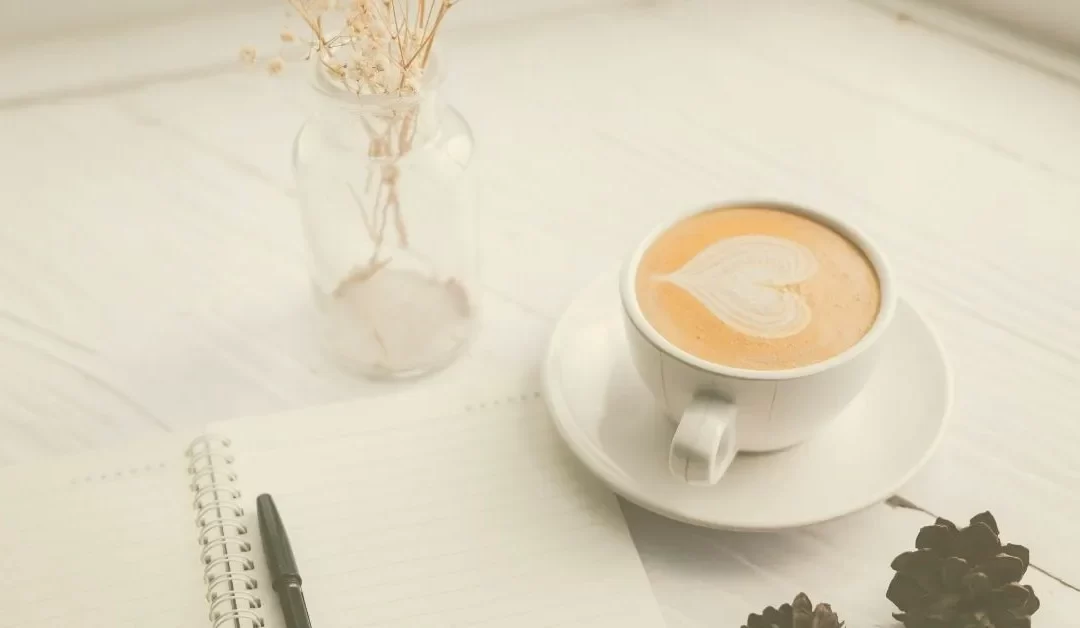
Thinking of using journaling as a way to heal your inner self from past trauma? You need these 100 journal prompts for healing .
First of all, well done you . You’ve taken the first step towards healing by even considering using your journal as a way to let go.
There are so many benefits of journaling for healing, the main one being the ability to ease your suffering, and create room for positive emotions in your life, whilst ridding yourself of negative ones, such as shame, guilt, anger, hurt, and fear.
It would be fantastic if we could just click our fingers and either forget our past trauma, or be immediately healed from the pain it’s caused, but it doesn’t quite work that way.
So roll your sleeves up, because becoming your true self after experiencing inner pain takes a little work, but the results are worth every moment of discomfort.
How To Use Journal Prompts For Healing
Some of these journal prompts can feel heavy at times, due to their nature. After all, you will have to root around inside yourself and pull out situations you’d rather forget, and emotions you’d rather ignore.
But that’s all part of the healing process, after all, healing isn’t linear .
It’s necessary to analyze these situations and feelings in order to move forward with your life, as your happiest and most authentic self.
As these journal prompts for healing can be tough to work through, we recommend picking one or two every time you open your journal and spend some time working through your thoughts and writing down all of the thoughts that start circling in your mind.
By writing everything down, you can release the energy that is pent up inside of you, to make room for new, positive energy in your life.
If you haven’t already, bookmark this page so that you can revisit it anytime you need an emotional outburst.
📖 Need a journal? Click here to browse journals on Amazon .
Journal Prompts For Healing
Enough talking about it, let’s dive into these 100 self-healing journal prompts and help you to release the emotional weight you’re carrying.
- What is the worst emotion you’ve experienced today?
- What are you ready to let go of?
- What situation from the past has been causing you inner turmoil, and why?
- What do you wish other people understood about you?
- When was the last time you felt down? Do you often feel negative emotions?
- Do you think your relationships impact you positively or negatively?
- Do you set healthy boundaries with the people around you?
- Do you feel in alignment with your true self?
- How does holding onto negative emotions impact your everyday life?
- Do you have a childhood memory that has impacted your adult life?
- Describe yourself in 5 positive words.
- What advice would you give a friend in the same position as you?
- What are 3 small things you can do today to bring you peace?
- What are you grateful for? Write down everything you feel gratitude towards, be it a person, an object, or simply the sun shining.
- How do you feel about yourself today?
- What has been taking up a lot of space in your mind lately?
- When was the last time you went out of your comfort zone, and what was the result?
- Do you need to forgive someone for a past hurt, in order to heal yourself?
- What would you love to do, that the fear of failure stops you from doing?
- Write about the last time you felt uncomfortable in a situation. Who made you feel this way, and why did it bother you so much?
- If you had the chance to redo one situation in your past, which would you choose and why?
- List 5 steps you can take to make this week more positive than last week.
- What is your definition of failure?
- When do you feel the most like yourself?
- If you could offer your younger self one piece of advice, what would it be?
- What kind of person do you not want to be?
- Do you have any toxic relationships that you know you need to let go of?
- When was the last time you cried? What were you upset about?
- What makes you feel the most fulfilled in life?
- What are 3 emotions you’d like to experience more of in your life?
- What does happiness look like to you?
- Is there anyone that can help you move forward in your life?
- What is a personality trait you have that others have criticized?
- What triggers envy for you? Why do you feel jealous?
- Write about someone you looked up to that let you down.
- What is your biggest fear?
- Are you holding onto any secrets? Would letting them go release you from negative emotions?
- Do you have the same core values as your parents?
- Are you an overthinker? Write down the first 10 thoughts that pop into your head.
- Do you think you’ve failed yourself? If so, how?
- What do you think your younger self would be proud of you for?
- What have you done today to help you move closer to your goals?
- Who appears to have life figured out? In what way do they seem to have it together?
- Name the things that make you feel the most relaxed.
- Is there a past version of yourself that you’re embarrassed of? Why do you think that is?
- What is the biggest risk you ever took, and did it pay off?
- Is there anything you long for?
- Do you believe there is a happy and fulfilled life in your future?
- Do you have a gut feeling about what you should do with your life?
- Do you feel content with where you are right now?
- Do you self-sabotage? If so, how?
- What values are the most important to you?
- Who do you have an influence on?
- What is one personality trait you admire in others?
- Who or what inspires you?
- When are you the most critical of yourself?
- What do you do for self-care?
- What is holding you back from your desires?
- What are key moments in your past that caused you lasting trauma?
- What do you wish you had discovered earlier in life?
- What are some habits you need to break?
- Is there a time you ruined a great situation for yourself? How did you feel afterward?
- Do you have any unfinished projects? If so, why haven’t you finished them?
- What objects in your home do you feel attached to? Why do you feel sentimental about them?
- What do you daydream about?
- What did you want to become when you were young? How has that changed?
- When was the last time you felt disrespected? Explain the situation.
- How do you quieten your inner critic?
- What is your first instinct when faced with conflict? Do you think you choose the healthiest way of dealing with the issue?
- Do you find it hard to trust others? Where do you think this stems from?
- What were you like as a child?
- What are your coping mechanisms?
- What are the first signs that your mental health is on a downward spiral?
- In what ways are you like your parents?
- In what ways do you feel better than others around you?
- Do you feel as though you are holding on to stress?
- In what ways do you feel like others exceed you?
- Do you feel like a burden to your loved ones?
- How would you respond to a friend who betrayed you?
- What emotions do you try and bury, rather than experience?
- How do you act when you’re angry?
- Which quote do you love when you’re feeling down?
- How can you be more compassionate towards yourself?
- Do you feel supported by your loved ones?
- Do you enjoy alone time, or do you prefer to be surrounded by others?
- What is the greatest obstacle in your life right now?
- What is your biggest regret? Knowing you cannot change the outcome, how can you let go of regret?
- Who feels like home to you? Describe what they do to make you feel safe and loved.
- What lessons have you learned in the past year?
- What are 5 things you do really well?
- In which areas of your life do you feel overwhelmed?
- Write down 3 affirmations that you can refer to in times of emotional stress, to bring you back to feeling peaceful.
- What is going right in your life?
- If you met the higher version of yourself, how would they act? How can you embody that person more in your daily life?
- When was the last time you did something for the first time?
- Are you good at making decisions? Is there anything that could help you become better?
- Think of the last time you had a really great day. What made it so fantastic? How can you incorporate more of that into your life?
- How could today have been better?
- Do you believe that all of your struggles are a step forward?
- How would you be a different person today if you hadn’t experienced any of the troubles or trauma from your past?
Final Thoughts On Journal Prompts For Healing
These journal prompts for emotional healing will have you digging deep into your thoughts, memories, and feelings you might be burying.
It might feel uncomfortable to follow these journal prompts for healing, but taking the opportunity to let out everything you’ve been holding in, will help you to experience a huge emotional release that will be the first step in your healing journey.
If you are further along on your road to emotional healing, check out the following lists:
- Self-discovery journaling prompts
- Journal prompts for toxic relationships
- Journal prompts for spirituality
Recent Posts
- 50 Spiritually Enlightening Affirmations For Amethyst
- 65 Encouraging Affirmations For Athletes
- 60 Spiritual Affirmations For Crown Chakra
- 70 Motivational Affirmations For Singers
- 80 Life-Changing Affirmations For Financial Freedom
Crystal Sanctuary A Journey of Self Nurturing Meditation Meditate with Deb
- Alternative Health
Welcome to 'Crystal Sanctuary,' a guided meditation for deep self-nurturing. Carry the tranquility and love from this crystal sanctuary into the rest of your day. --- 🧘🏻♂️Free Discovery Chat for Mindfulness or Spiritual Coaching, Meditation Instruction, or Sound Healing - https://debphelps.com/private-sessions-with-deb/ 🙏🏻Live Classes, Full Meditation Library & Articles - https://peacefulwellness.studio 🤲🏻 Peaceful Journey to Wellness Facebook Group - https://www.facebook.com/groups/peacefulwellnesssangha 🧘🏻♂️Meditation Teacher Training - https://peacefulwellness.institute Deb Phelps - https://debphelps.com Facebook - https://www.facebook.com/peacefulwellnesswithdeb Instagram - https://www.instagram.com/peacefulwellnesswithdeb 010924 Become a supporter of this podcast: https://www.spreaker.com/podcast/meditate-with-deb--5849207/support.
- Episode Website
- More Episodes
- Peaceful Wellness
Mindfulness in medicine: A couple’s journey in Mindfulness-Based Stress Reduction
Meet Dr. Michelle Davila and Dr. Hugo Davila-Grijalva, partners not only in marriage but in a shared mission to bring presence to healthcare and educate others in healing.
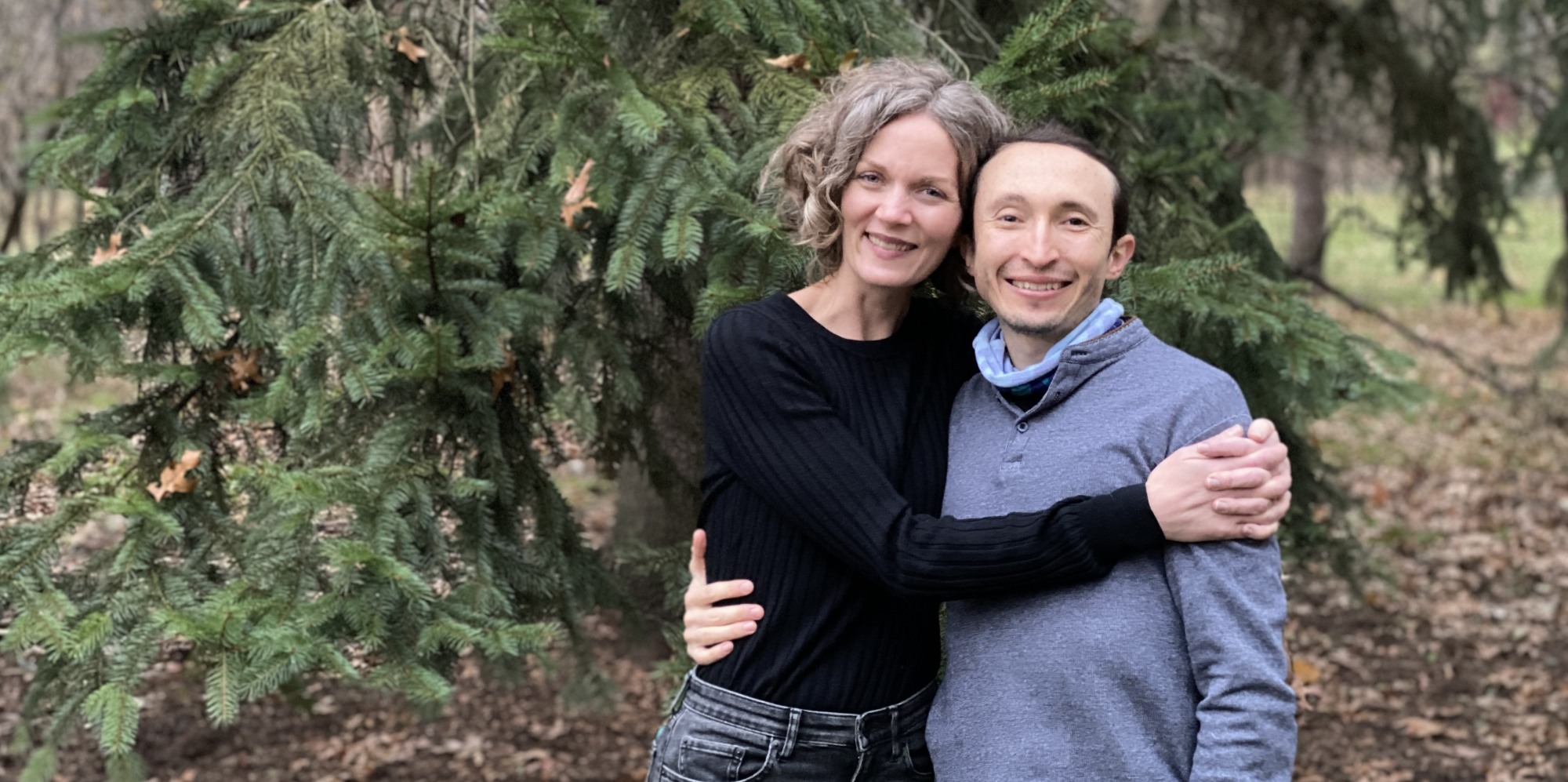
In the demanding world of healthcare, where burnout looms large and patient-centered care often gets overshadowed by endless tasks, a husband and wife team of physicians have embraced mindfulness to cast a new light on healing.
For Dr. Michelle Davila, an experienced naturopathic doctor and Dr. Hugo Davila-Grijalva, a dedicated internal medicine hospitalist, mindfulness provides a path to reconnect with their core values as caregivers.
From their varied individual journeys — Michelle’s teen years spent turning the well-thumbed pages of "Zen Mind, Beginner's Mind" to Hugo's happenstance introduction into Reiki and a transformative Vipassana retreat — mindfulness meditation practice emerged as a calming companion in both of their lives.
As serendipity would have it, their mutual interest in the mind-body connection led them to each other within the halls of the very same integrative medicine department, marking the start of their shared path.
A transformative experience of self-discovery
In 2020, amidst the global pandemic, Michelle and Hugo chose to formally engage with Mindfulness-Based Stress Reduction (MBSR), an 8-week evidenced-based mindfulness program developed by Jon Kabat-Zinn to address chronic pain, anxiety, depression and general stress reduction.
At the time like many on the frontlines, Hugo was struggling with stress and burnout. He hoped MBSR could guide him through that.
Michelle also felt called to deepen her mindfulness practice due to the intensity of her work as a clinician.
Often, those devoted to caring professions prioritize the needs of others over their personal well-being. But mindfulness offers the opportunity to focus on their self-care.
“During MBSR, I became acutely aware of my own pain and suffering that I never acknowledged or gave myself the opportunity to experience,” Michelle reflects. “The practice offers support for that — it helps us learn how to sit with suffering.”
During MBSR, I became acutely aware of my own pain and suffering that I never acknowledged or gave myself the opportunity to experience. The practice offers support for that — it helps us learn how to sit with suffering.

Motivated by the impact of mindfulness on their own lives, Michelle and Hugo felt inspired to share its benefits with others by teaching the practice. This led them to pursue training through Brown University’s Certificate in Mindfulness-Based Stress Reduction Teaching .
Enriching patient care with mindful presence
Since enrolling in MBSR teacher training, the couple has woven mindfulness into every aspect of their lives.
Hugo believes it’s important to fully embody mindfulness himself before he can effectively teach it to others. "When we're in class, it's basically a practice session,” he says. “As teachers, we need to cultivate mindfulness daily. Teaching it comes from a place of deep personal practice.”
He also reflects on how mindfulness enhances his patient interactions and reminds him to stay present even among constant demands on his time and energy.
“Mindfulness really permeates everything that I do in healthcare,” Hugo explains. Taking a mindful approach when he’s in the hospital seeing patients helps him engage with the full experience of caretaking and being present in each encounter, rather than feeling scattered from one patient to the next. He says, “Mindfulness has truly helped me be in touch with what brings the most fulfillment and joy in practicing medicine.”
Mindfulness has truly helped me be in touch with what brings the most fulfillment and joy in practicing medicine. It has helped me connect with my patients and with the full experience of taking care of people.

Michelle echoed the idea of mindfulness improving bedside manner and quality of care. "A lot of the way we benefit patients is just how we are with them — being attentive, self-regulating so we’re not caught up in our own experience, having comfort with discomfort and suffering, and really bearing witness to what the patient is going through," she says.
Bringing mindfulness to medical education
As Qualified Teachers, the pair has taught a few MBSR programs in English and Spanish, and a mindfulness in nature course. They look forward to teaching more programs and short courses, and bringing mindfulness education into healthcare settings, including their own.
Hugo is also working with the American College of Physicians to offer mindfulness programs for its members, while Michelle has already instructed medical students at their affiliated university.
As they continue their journey towards certification at Brown, Michelle and Hugo remain committed to their own mindfulness practice and the wellbeing of those around them.
Hugo says, "There's an understanding in mindfulness that one practices for oneself, and as a consequence, everybody else benefits."
Get Started
In collaboration with the Mindfulness Center at Brown, the School of Professional Studies provides a variety of programs for newcomers, seasoned practitioners and teachers in-training.
Related News
Practicing mindfulness can help people make heart-healthy eating choices, comparing evidence-based mindfulness programs: mbsr vs. mbct, stability in flux.

How to Heal Your Emotional Trauma & Past Wounds | Healing Workshop 💖
Posted: April 14, 2024 | Last updated: April 14, 2024
💖 Download the Healing Workshop Workbook: <a href="https://www.lavendaire.com/healingwb/Sharing">https://www.lavendaire.com/healingwb/Sharing</a> my steps to healing your past wounds and emotional trauma. We all carry some sort of emotional baggage. We all have an inner child that needs to heal. I hope this helps you further your self discovery journey, to become more self aware and cultivate more self love. Take it one day at a time, focus on the present moment and how you can choose to live your life today and onward.Sending you so much love. Please share this video with anyone who needs it. 💞// more videos on self love & self worth→ self love journey: how I healed my self worth | <a href="http://bit.ly/2Uw5Lt3→">http://bit.ly/2Uw5Lt3→</a> self worth & self esteem | <a href="http://bit.ly/2K9O4dP→">http://bit.ly/2K9O4dP→</a> how to stop being insecure | <a href="http://bit.ly/2I6xDwbIf">http://bit.ly/2I6xDwbIf</a> you enjoyed this video + workbook, check out my online course - Create Your Dream Life: <a href="http://lavendaire.com/dreamlifeAgain">http://lavendaire.com/dreamlifeAgain</a>, I'm no expert and I don't claim to know everything. Just sharing what has helped me and hoping it might help some of you! #selflove #healing #emotions #workshop📸 Instagram | <a href="http://instagram.com/lavendaire___________________________💝">http://instagram.com/lavendaire___________________________💝</a> The Lavendaire Shop | <a href="http://shop.lavendaire.com🌻">http://shop.lavendaire.com🌻</a> Website | <a href="https://lavendaire.com💛">https://lavendaire.com💛</a> Podcast: The Lavendaire Lifestyle | <a href="http://lavendaire.com/llpodcast❀">http://lavendaire.com/llpodcast❀</a> instagram | <a href="http://instagram.com/lavendaire❀">http://instagram.com/lavendaire❀</a> facebook | <a href="http://facebook.com/lavendaire❀">http://facebook.com/lavendaire❀</a> twitter | <a href="http://twitter.com/lavendaire❀">http://twitter.com/lavendaire❀</a> pinterest | <a href="http://pinterest.com/lavendaire___________________________//">http://pinterest.com/lavendaire___________________________//</a> RESOURCES💌 Join the Lavi Loves mailing list | <a href="http://lavendaire.com/mail💫">http://lavendaire.com/mail💫</a> Free resources on Lavendaire | <a href="http://www.lavendaire.com/resources📷">http://www.lavendaire.com/resources📷</a> Camera gear + tech equipment | <a href="http://lavendaire.com/gear🏡">http://lavendaire.com/gear🏡</a> Get a free $40 credit on Airbnb | <a href="http://bit.ly/29Ikbj8🎧">http://bit.ly/29Ikbj8🎧</a> FREE Audible Trial | <a href="http://www.audibletrial.com/lavendaire___________________________Edited">http://www.audibletrial.com/lavendaire___________________________Edited</a> by Loryn Teranishi | @yolorynMusic by Epidemic Sound - <a href="http://bit.ly/2IBCok1">http://bit.ly/2IBCok1</a> (30 day free trial)Outro music by Eventide | <a href="http://bit.ly/2wW9Xa8Business">http://bit.ly/2wW9Xa8Business</a> inquiries | [email protected]___________________________// ABOUTI’m Aileen, a lifestyle blogger sharing knowledge and inspiration on creating your dream life.Lavendaire is my blog about personal growth + lifestyle design. Follow along and learn how you can create a life you love. Subscribe to Lavendaire to get inspired by new videos weekly! <a href="http://bit.ly/sublavendaire___________________________Disclaimer:">http://bit.ly/sublavendaire___________________________Disclaimer:</a> This is NOT a sponsored video. All opinions expressed are wholly my own.
More for You
Ketanji Brown Jackson's New Warning to Supreme Court
Woman with rare syndrome left allergic to ‘everything’ except just four foods
4 Things You Should Never Cook in Cast Iron
Country announces major plans to ban of gas-powered vehicles in sweeping new law: 'The evidence ... is clear'
Why You May Want To Reconsider To-The-Ceiling Kitchen Cabinets
A key part of our bodies continues to live on years after we die
Explorer Reveals Ernest Shackleton's Perfectly Preserved 116 Year Old Hut In The Antarctic
Trump’s last GOP rival lands new gig after failed 2024 presidential bid
Kale had its moment. Its leafy cousin has more protein and fewer calories
America’s ‘God of War’ is now many decades old. The US Army can’t replace it
The health condition many women are getting diagnosed with after COVID
Researchers find concerning contaminant within human eyes: 'Shedding light on their potential implications'
Groundhog Day Was Painstakingly Planned, Except For One Improvised Scene
The girl who can’t smile: How a rare disorder became a young woman's ‘greatest gift’
12 Foods You Must Toss After Their Expiration Date
HGTV Fans Say 'Rock the Block' Is Getting "Hard to Watch" After the Bedroom Renovation
WNBA Draft 2024 results: Pick-by-pick tracker for every selection
Melatonin industry asked to voluntarily tighten standards after dramatic rise in childhood ER visits
First major wildfire of 2024 raging near popular tourist destination
Keanu Reeves' Ballerina Cameo as John Wick Revealed at CinemaCon Screening
site categories
Bbc plans to abolish automatic pay rises for top earners, including on-screen stars, ‘the masked singer’: lovebird says his costume reflects his journey of “self acceptance”.
By Katie Campione
Katie Campione
TV Reporter
More Stories By Katherine
- IATSE Has “Cautious Optimism” About General Negotiations With Studios As Union Aims To Finalize Craft-Specific Issues This Week
- “As A Union We’re Irreplaceable”: WGA Awards Full Of Strike Talk As Guild Takes Victory Lap
- ‘We Were The Lucky Ones’: Erica Lipez, Joey King & Logan Lerman On The Decision To “Imply More Than Show” The Violence Of The Holocaust – Contenders TV

SPOILER ALERT! This post contains details from Wednesday’s episode of The Masked Singer , including the identity of Lovebird.
After a rousing rendition of “All That You Are” by the GooGoo Dolls on Transformers night, Lovebird was the first to be sent home during a double elimination on The Masked Singer.
Related Stories

2024 Premiere Dates For New & Returning Series On Broadcast, Cable & Streaming

'La Casa De Los Famosos' & 'El Señor De Los Cielos' Fuel Telemundo's Primetime Ratings Success
“I had always wanted I knew I wanted to try to show it at some point and when previous offers came in, it just wasn’t the right time in my life,” the former Bachelor told Deadline of competing on the show. “When this season came up, I was like, ‘This is the season I say, yes.’ It’s something that I never thought that I would want to say yes to or be comfortable doing, but it was the experience of a lifetime and something I was so happy and grateful for.”
And since McCarthy seems to have a sixth sense for reality TV stars on The Masked Singer , Underwood wasn’t surprised at all that she was able to guess his identity.
“It was to be expected at that point,” he explained. “I knew she had watched my season. I knew she was familiar with me. She had read my book. So I was like, ‘Oh, she is gonna have this figured out.'”
Audiences who have been following Underwood since his reality TV journey began on The Bachelorette will know that it’s been a rocky path. After vying for Becca Kufrin on Season 8, Underwood quickly went on to Bachelor in Paradise , and then he became The Bachelor for Season 23.
Shortly after his relationship from The Bachelor ended, he faced allegations of stalking that were ultimately dropped. In 2021, Underwood came out as gay, and his coming out journey way documented in the Netflix series Coming Out Colton. He is now married to husband Jordan C. Brown.
He added that while he “was in a position that I should have never been in,” he’s proud of the way things turned out.
“I’m proud of helping contribute to our community and having people feel represented because there’s a lot of people like me that are struggling, that are hiding, that have so much shame around their sexuality, he continued. “I feel like I had to go through what I went through to speak for people within our community that felt similarly to what I was feeling.”
Obviously, Underwood’s Lovebird costume was a nod to his dating show days, but he also thinks it represents the “self acceptance that I’ve experienced in the last few years.”
“Lovebird spoke to me beautifully,” he said.
Must Read Stories
How writers are reacting to industrywide cost-cutting: hollywood contraction.

Jonathan Bailey Circles Lead Role In Ramping-Up ‘Jurassic World’ Movie
Armorer sentenced to 18 months in prison for halyna hutchins’ death, robert downey jr’s ‘sympathizer’ roles “america as a whole”: backstage.
Subscribe to Deadline Breaking News Alerts and keep your inbox happy.
Read More About:
No comments.
Deadline is a part of Penske Media Corporation. © 2024 Deadline Hollywood, LLC. All Rights Reserved.

IMAGES
VIDEO
COMMENTS
Cultivating self-love isn't an indulgent act; instead, it's a necessary part of your journey to healing. By embracing the practice of self-kindness, you create an environment within yourself that's conducive to repairing past wounds and building resilience for the future.This way, self-love becomes more than a concept—it transforms into a transformative tool that fosters deep healing ...
Forgive Yourself. Cultivate ways to stop self-loathing in any form. Forgive yourself for your past mistakes and find ways to heal. To incorporate self-love in your daily life, don't ruminate over mistakes and regrets. Rather than blame yourself for things that were probably out of your control anyway, turn to self-forgiveness.
The more you attempt to cast the fault, the more you must shine a light on the pain and make it bigger. That's the opposite of a self-healing journey and will lead to a life of resentment while the trauma persists. "As long as you are unable to access the power of the Now, every emotional pain that you experience leaves behind a residue of ...
Research on self-compassion shows that it assists with better health, relationships, motivation, self-confidence, self-fulfillment, resilience, and emotional balance. Ways to Foster Self-Love and ...
6. Go screen free. Take a break from your screens and put your phone into "do not disturb" mode. No notifications, no outside noise, and no distractions could equal peace of mind and self-love ...
1. Mindfulness: Having an open, curious, non-judging attitude; not over-identifying with negative stories about the self. 2. Self-kindness: Treating yourself kindly, rather than harshly. Extending ...
Self-love means learning how to meet the pain of the world with kindness and with healthy boundaries. It means standing in the fire of your own suffering, and of those you care about, with an open heart. It means calling in your community for support. One of the most alchemical forces in the world that brings balance to our suffering is gratitude.
Emotional healing is the process of acknowledging, allowing, accepting, integrating, and processing painful life experiences and strong emotions. It may involve empathy, self-regulation, self-compassion, self-acceptance, mindfulness, and integration. Many people have a tendency to want to control the process of emotional healing by minimizing ...
The Healing Journey is a psycho-spiritual process of self-discovery that allows us to develop a deeper self-awareness and understanding of the world around us. Healing is an individual process of becoming whole again and every journey is unique. ... A Light Among Shadows is a guide to self-love and being that helps you overcome negative self ...
An emotional healing journey is a progression from emotional distress to increased overall emotional well-being. An emotional healing journey is different from a mental health or substance use recovery journey, but it can occur at the same time as mental health or substance use recovery. Emotional healing may be possible for some without using ...
The Journal that feels like Therapy! Welcome to therapist-approved Daily Prompt Self-Guided Therapy Journal to guide you as you heal on your Self Love Journey. Created by TEDx Speaker, CEO & Founder of the Self Love Organization INC. Black Women Owned Company & Author As seen on: Access Hollywood & Black Love
A healing journey is a holistic, ongoing process of self-reflection, personal growth, and transformation that allows you to address wounds on a physical, mental, emotional, and spiritual level. It involves making intentional lifestyle changes, processing trauma and emotions, releasing limiting beliefs, and cultivating self-love and inner wisdom.
6. Using self-talk. A huge part of your self care journey is learning to engage in positive self-talk. Self-talk is the inner dialogue we have running through our heads most hours of the day. Self-talk is normally something that we do unconsciously and it is often indicative of our subconscious thoughts and feelings.
When you're an active participant in your healing, you can make much greater strides. So first thing in a self healing journey is to take an active role. This is your body and your mind so it's important that you are there to work on your healing. 2. Be open to heal.
Yes, spiritual practices like meditation, prayer, and energy healing can be powerful tools for self-healing. They help you connect with your inner self, tap into higher consciousness, and find a sense of purpose. Incorporating these practices into your routine can enhance your overall well-being. 5.
If you protect the seed that is trying to sprout within you, you will heal faster. 1. Visualize Your Ideal Life. Imagining every detail of your ideal life is the first step you take on your journey through self love. Where you live, how you wake up, who you talk to, what you eat and so on. Help your subconscious to prepare you for all of it.
When you journal for self-love you're really journaling to discover more about yourself, to reflect on yourself, thoughts, and actions. In the process of learning to love yourself, you go through periods of acceptance, and forgiveness and learn to grow your confidence and worthiness too. By journaling, you're really tackling your own self ...
Engage in movement your body enjoys. This could be hard laughter, silly dancing, a gentle walk or a bike ride. It can be whatever feels good to you. Create a new mantra to repeat to yourself daily that reinforces your journey of self-love: This could be, "I am worthy of self-love, respect, joy and comfort", "I am loveable", "I am ...
Embarking on a self-care healing journey is a powerful way to nurture your well-being and promote personal growth. While everyone's journey is unique, here are some general steps that can guide you along the way: 1. Awareness and Acknowledgment. Take a deep breath and open your heart to self-awareness.
Explore the Transformative Influence of Love Beyond Struggles in 'The Self-Love Journey Book.' Delve into a wealth of tools, guidance, and inspiring narratives to enhance your relationships, navigate conflicts, and discover inner tranquility. Join our community today and embrace the Healing Power of Love
6. My darling, be patient with yourself, healing takes time, healing implies kindness, healing means changes, becoming is not easy. Be patient with yourself, you are gardening your soul. Some flowers are meant to bloom later. Alexandra Vasiliu.
These books along with the exercises they offer, can become profound catalysts for nurturing our inner child, healing past wounds, and cultivating self-love. Through their guidance, we can begin ...
As these journal prompts for healing can be tough to work through, we recommend picking one or two every time you open your journal and spend some time working through your thoughts and writing down all of the thoughts that start circling in your mind. By writing everything down, you can release the energy that is pent up inside of you, to make ...
Show Meditate with Deb, Ep Crystal Sanctuary A Journey of Self Nurturing Meditation - Feb 21, 2024
Jones also mentioned that the whole journey of healing and self-care is not always crystal clear, as it evolves and takes time to track. The mom added to her opinion by encouraging others to trust ...
A transformative experience of self-discovery. In 2020, amidst the global pandemic, Michelle and Hugo chose to formally engage with Mindfulness-Based Stress Reduction (MBSR), an 8-week evidenced-based mindfulness program developed by Jon Kabat-Zinn to address chronic pain, anxiety, depression and general stress reduction.
Nurturing Self-Compassion. At the heart of healing is love—particularly self-love. It's about treating yourself with the same compassion you'd offer a dear friend. Cultivating self-compassion ...
We all have an inner child that needs to heal. I hope this helps you further your self discovery journey, to become more self aware and cultivate more self love. Take it one day at a time, focus ...
After a rousing rendition of "All That You Are" by the GooGoo Dolls on Transformers night, Lovebird was the first to be sent home during a double elimination on The Masked Singer. Even the ...
140 likes, 5 comments - storytellersaviApril 15, 2024 on : "Drop a ️ and tag that person. [Reels, trending, TV serials, Ekta Kapoor, self love, self care, healing journey]"